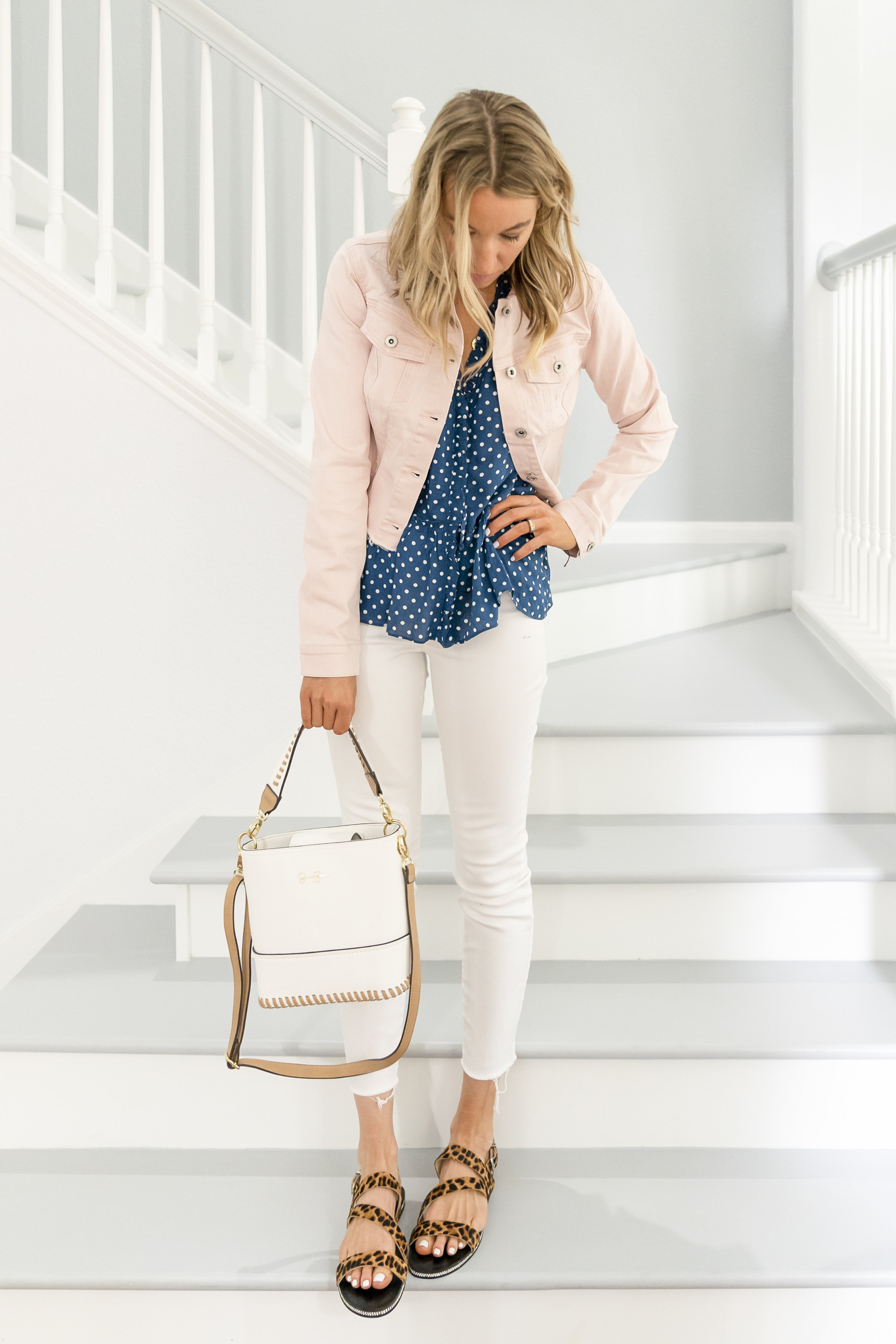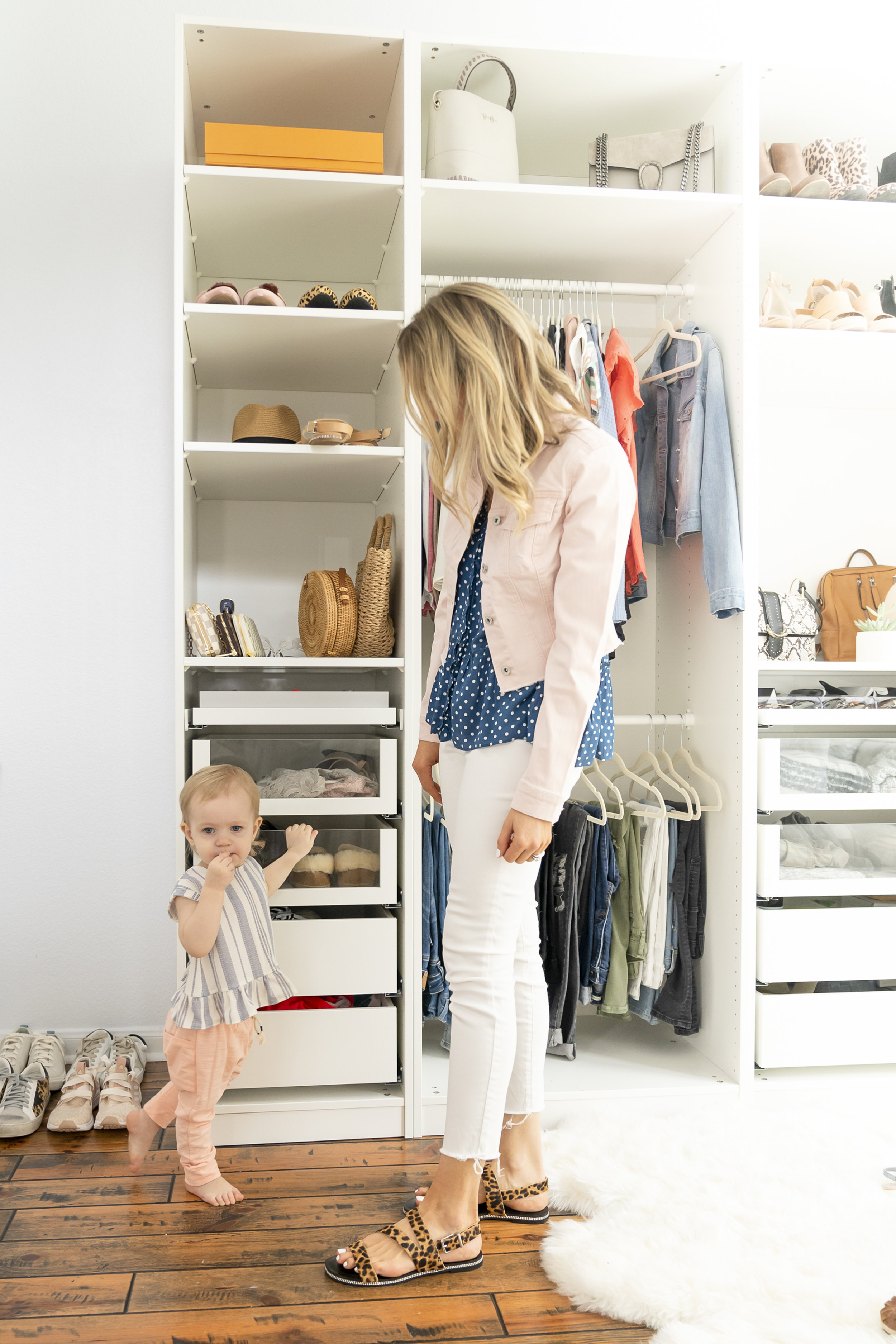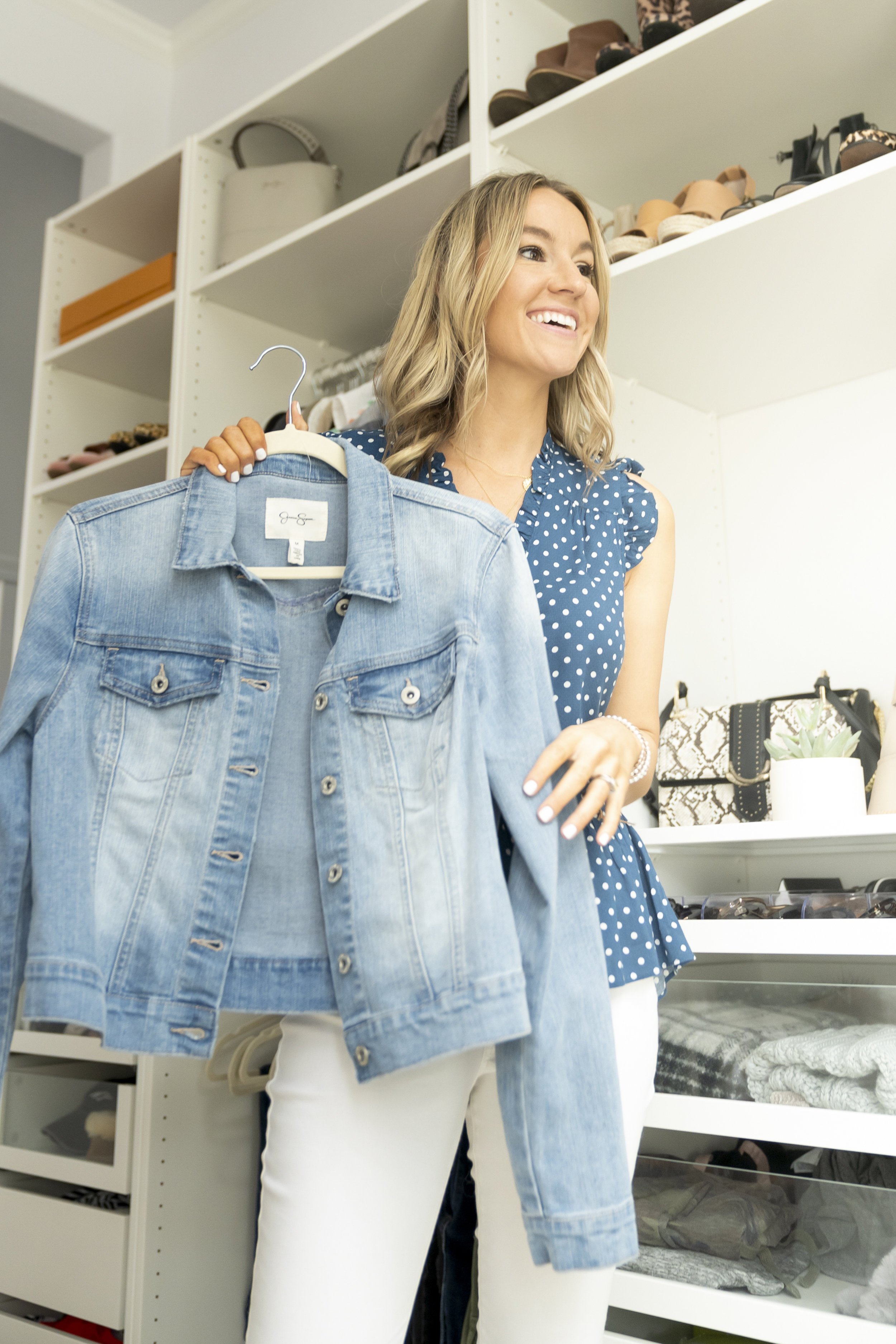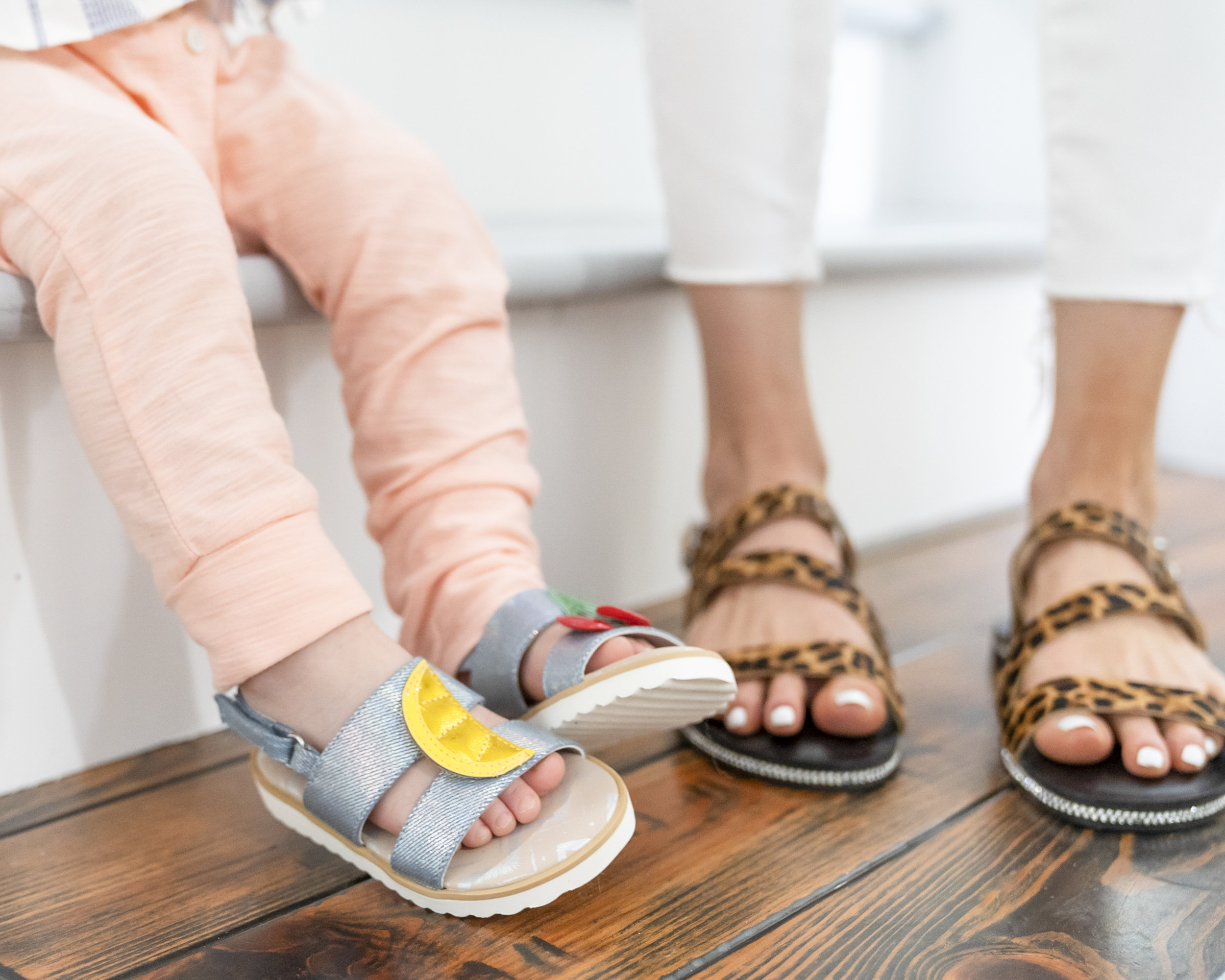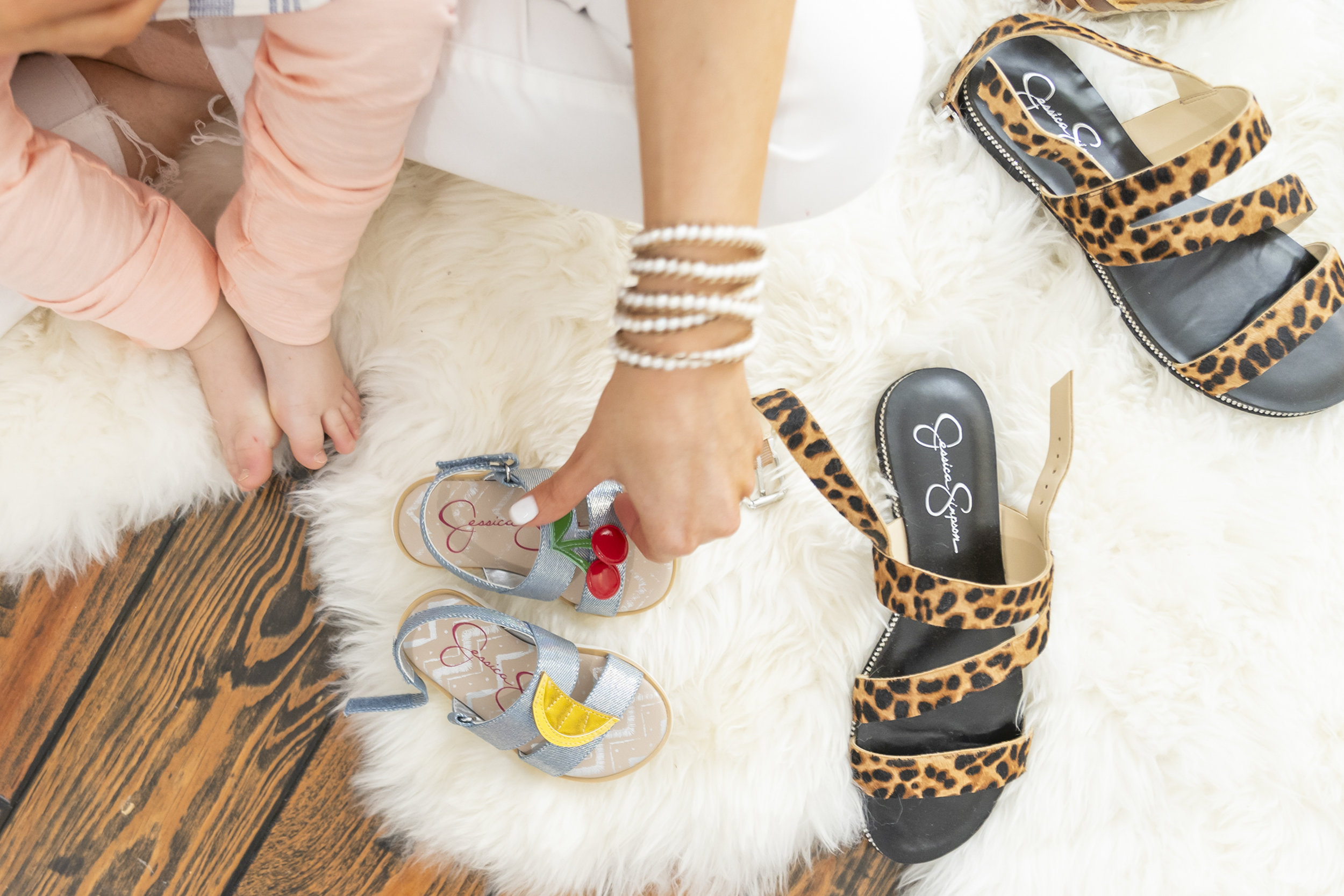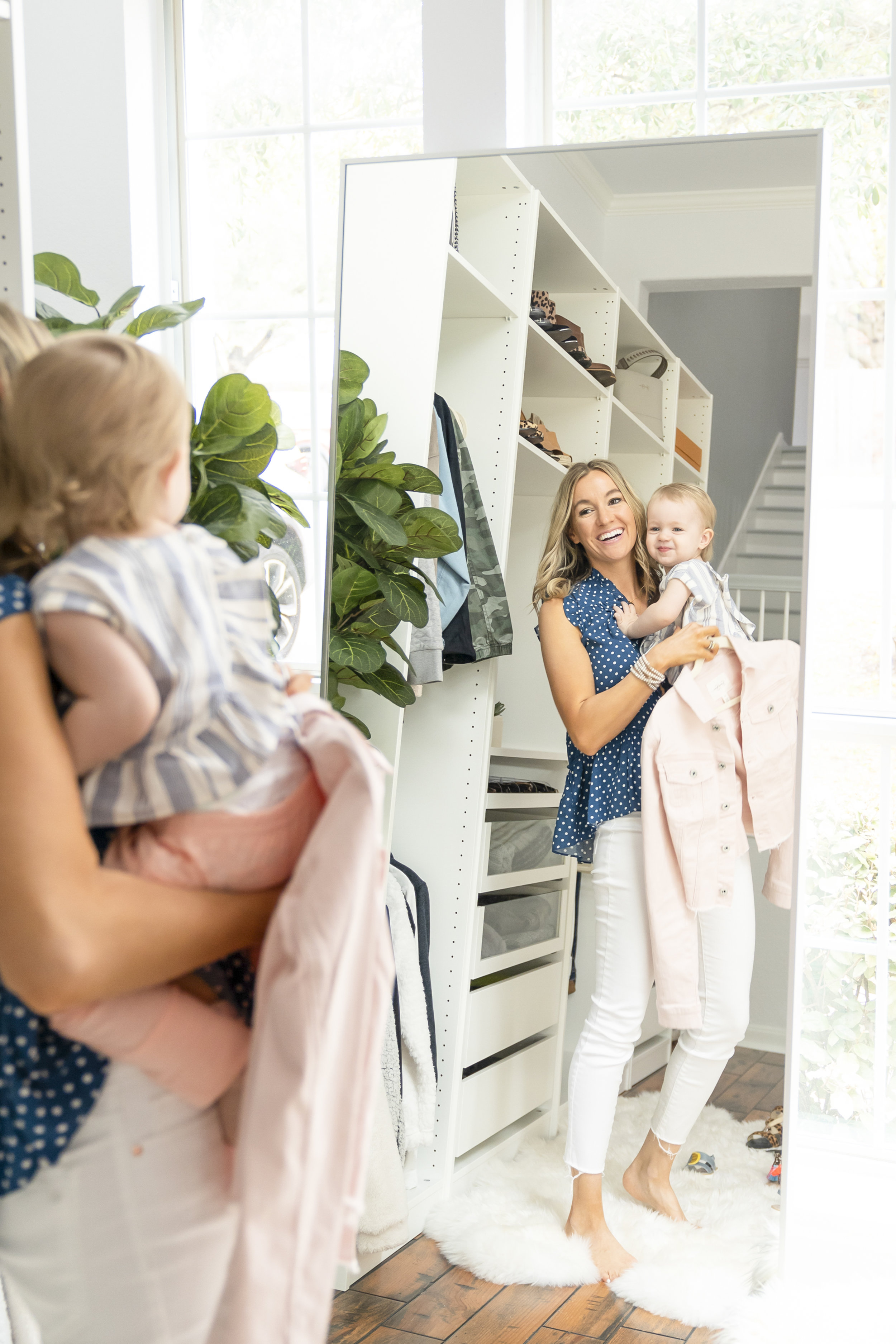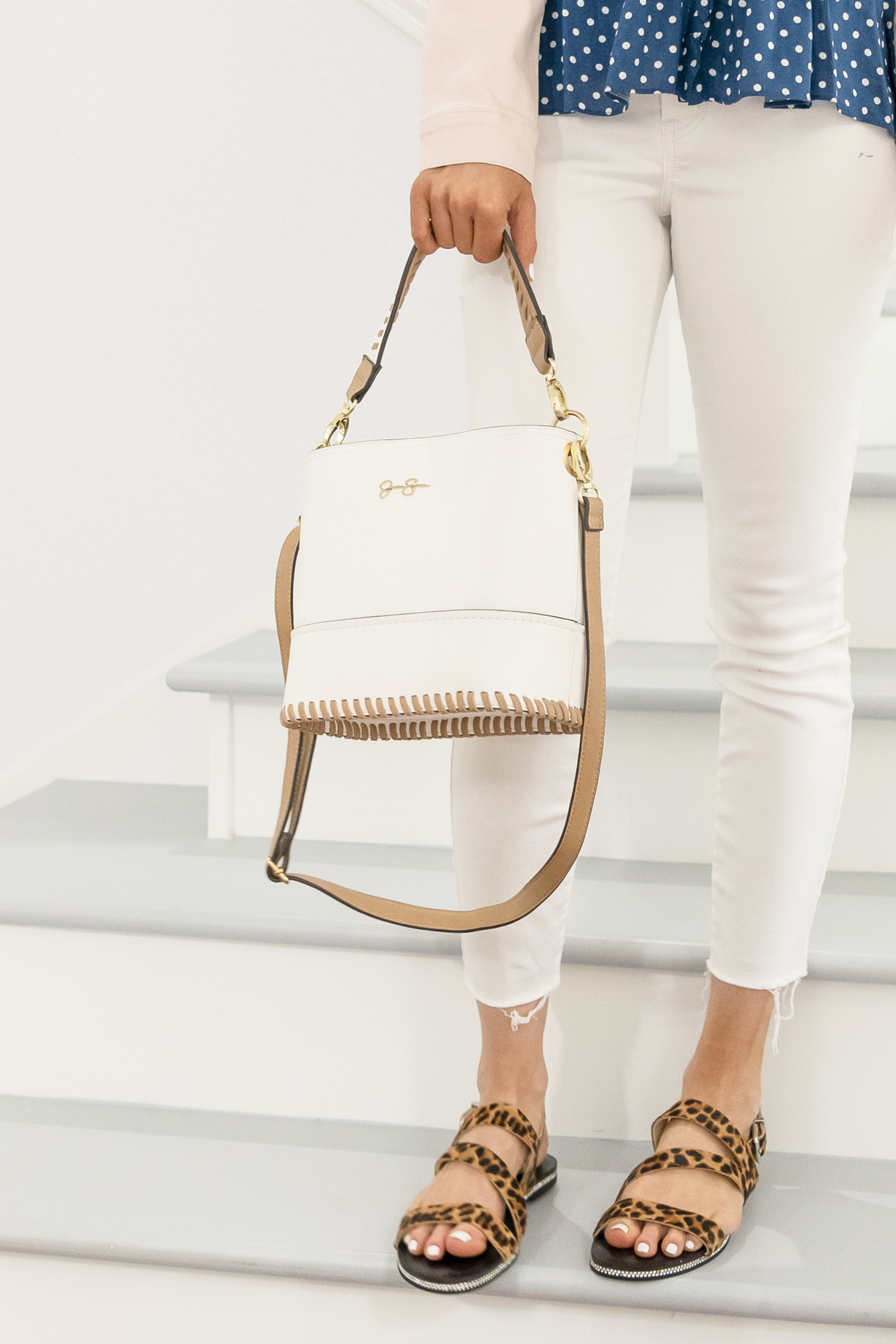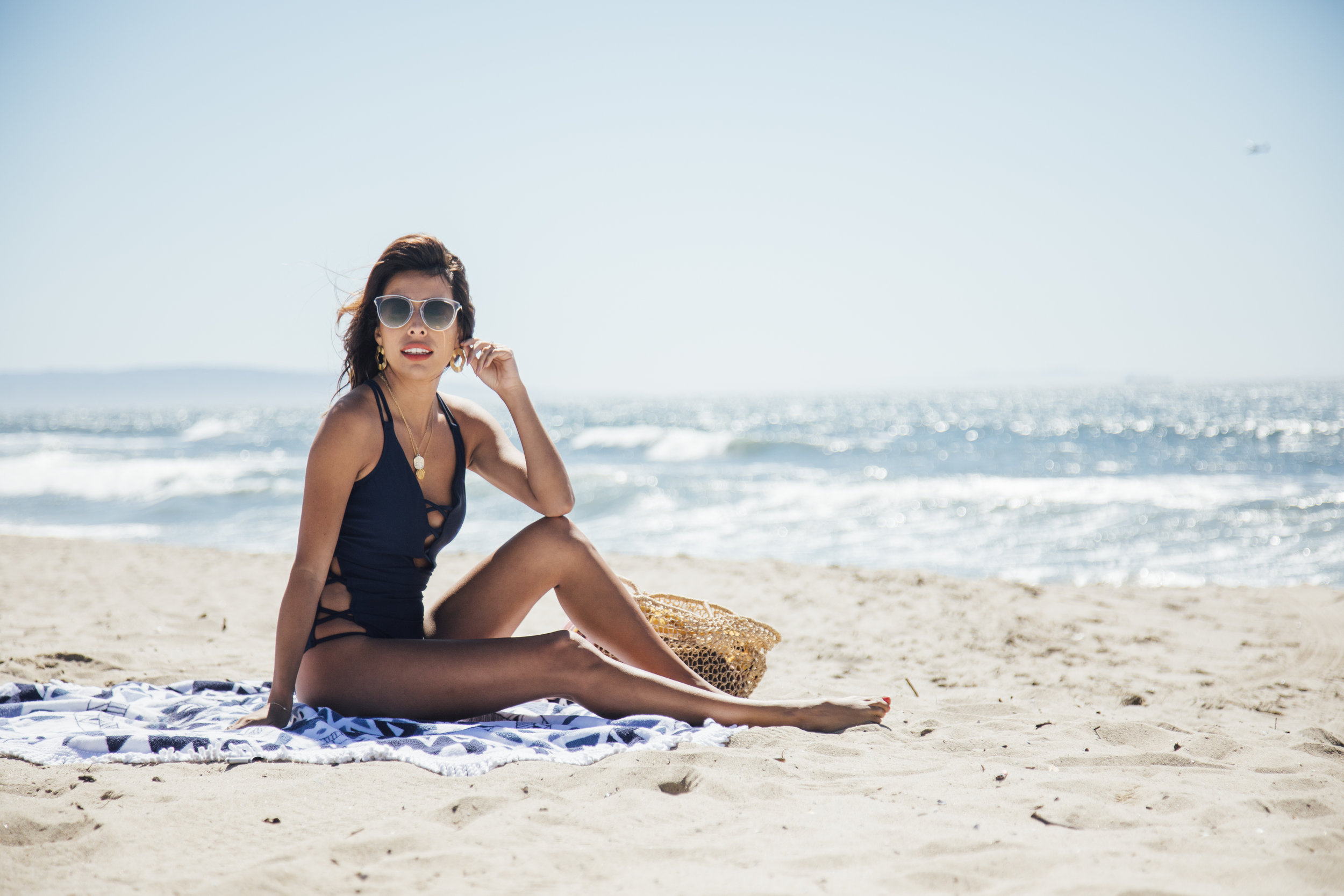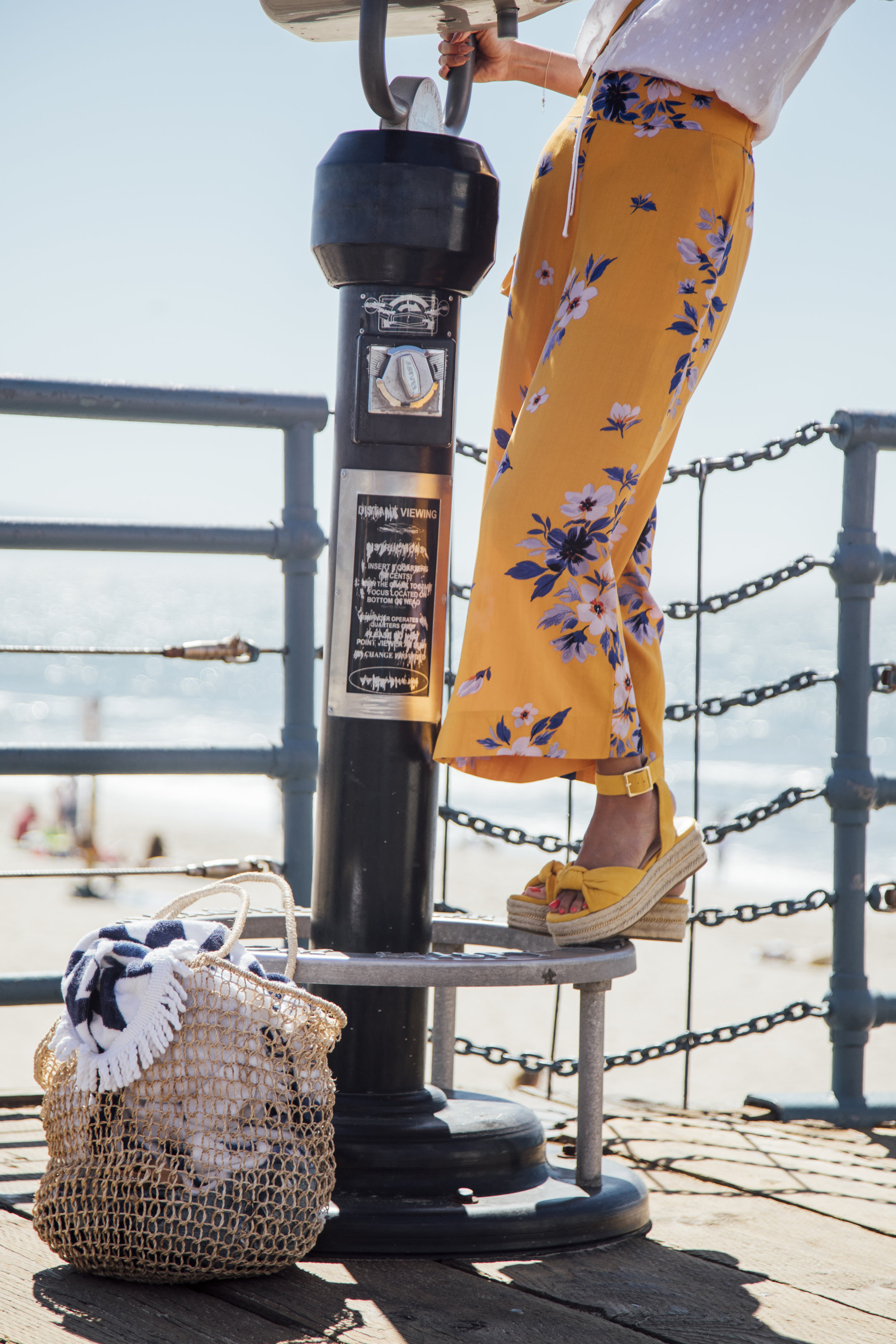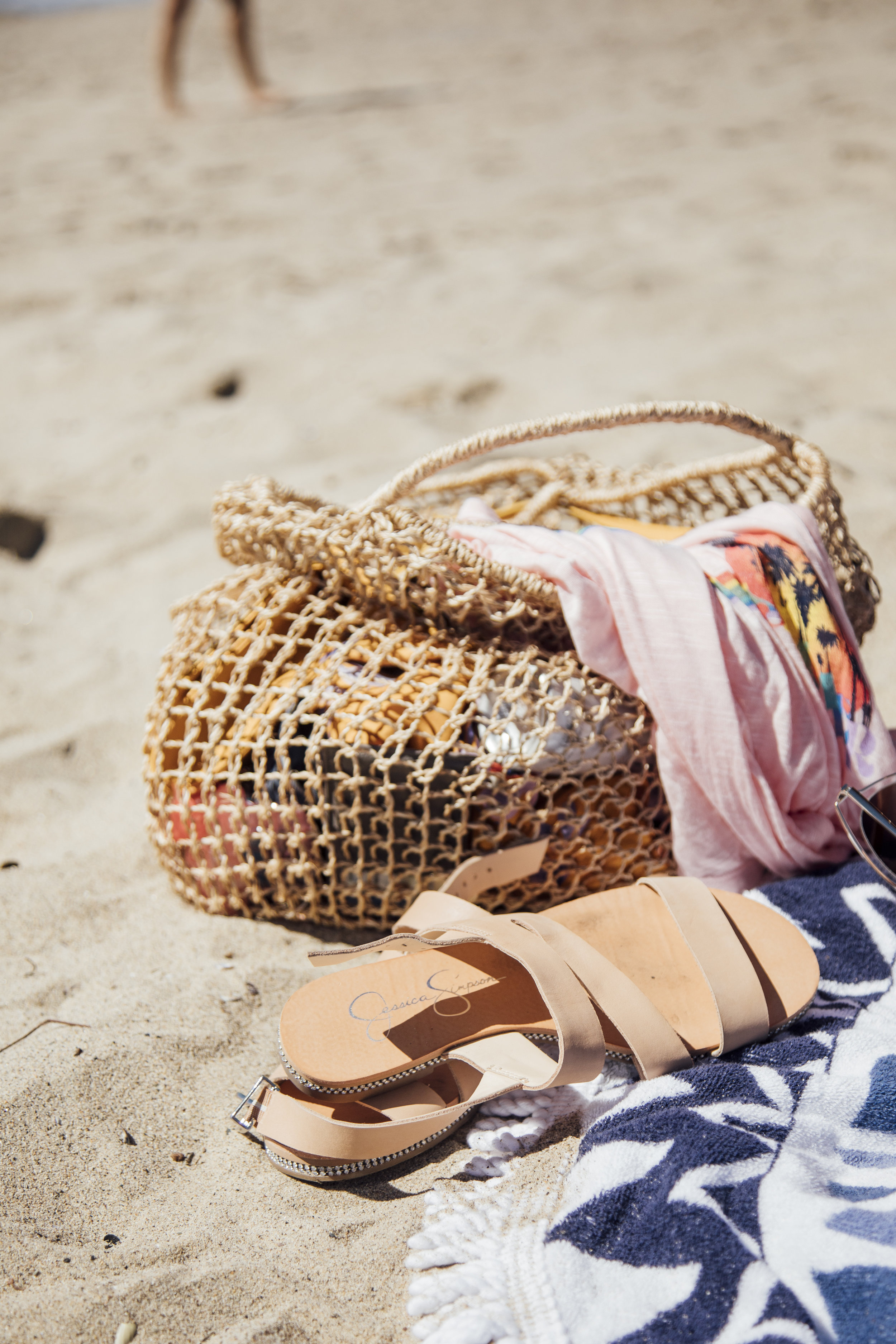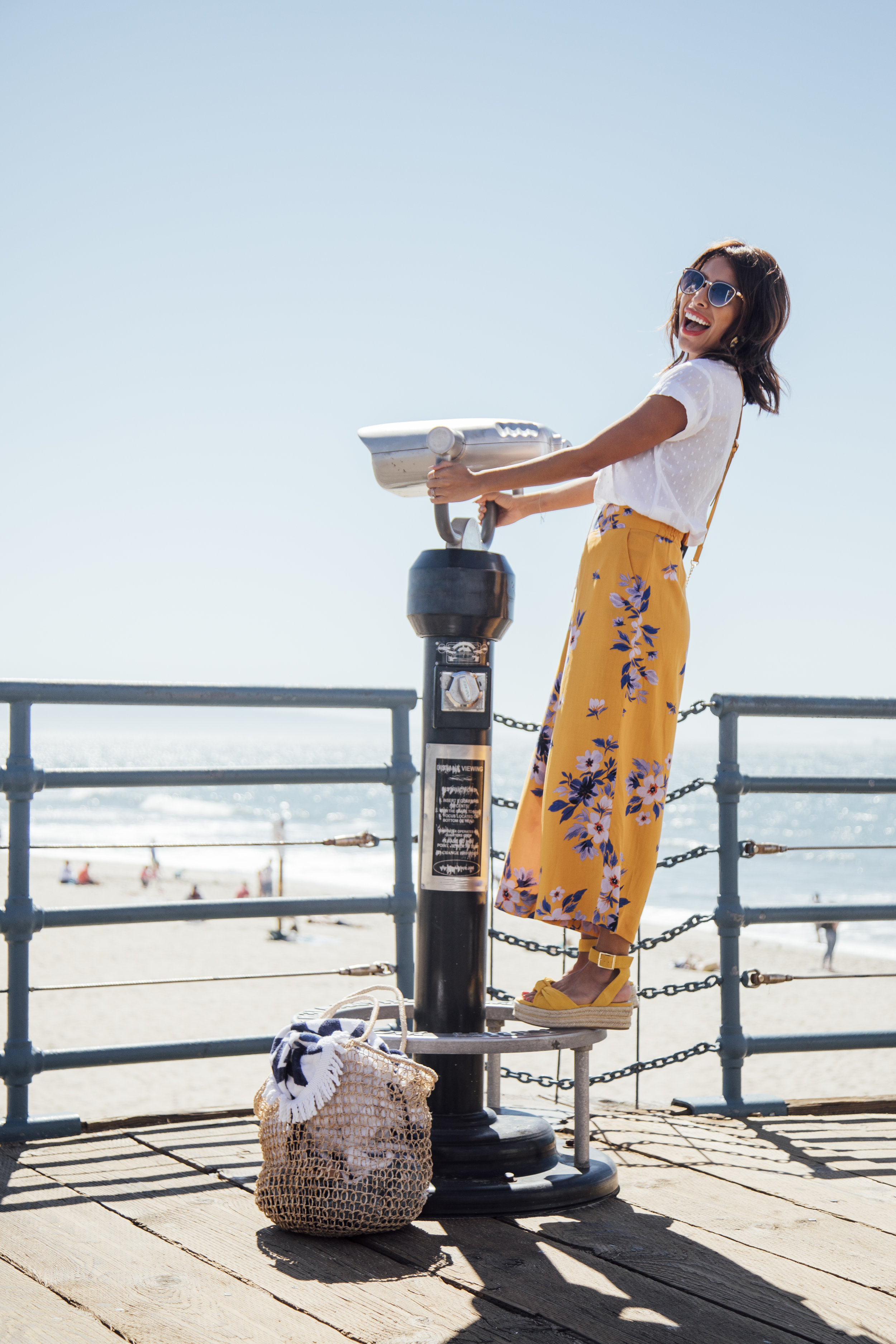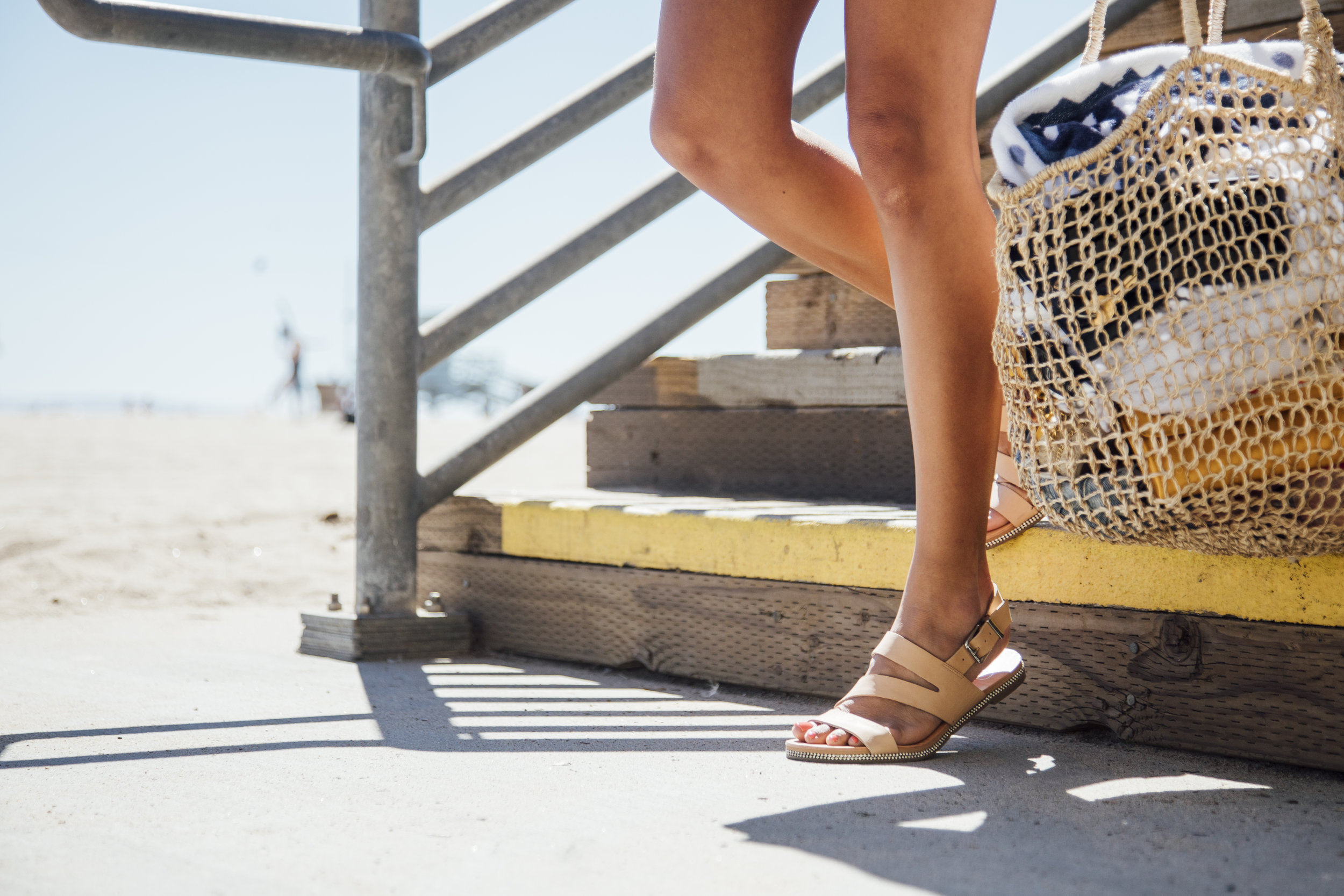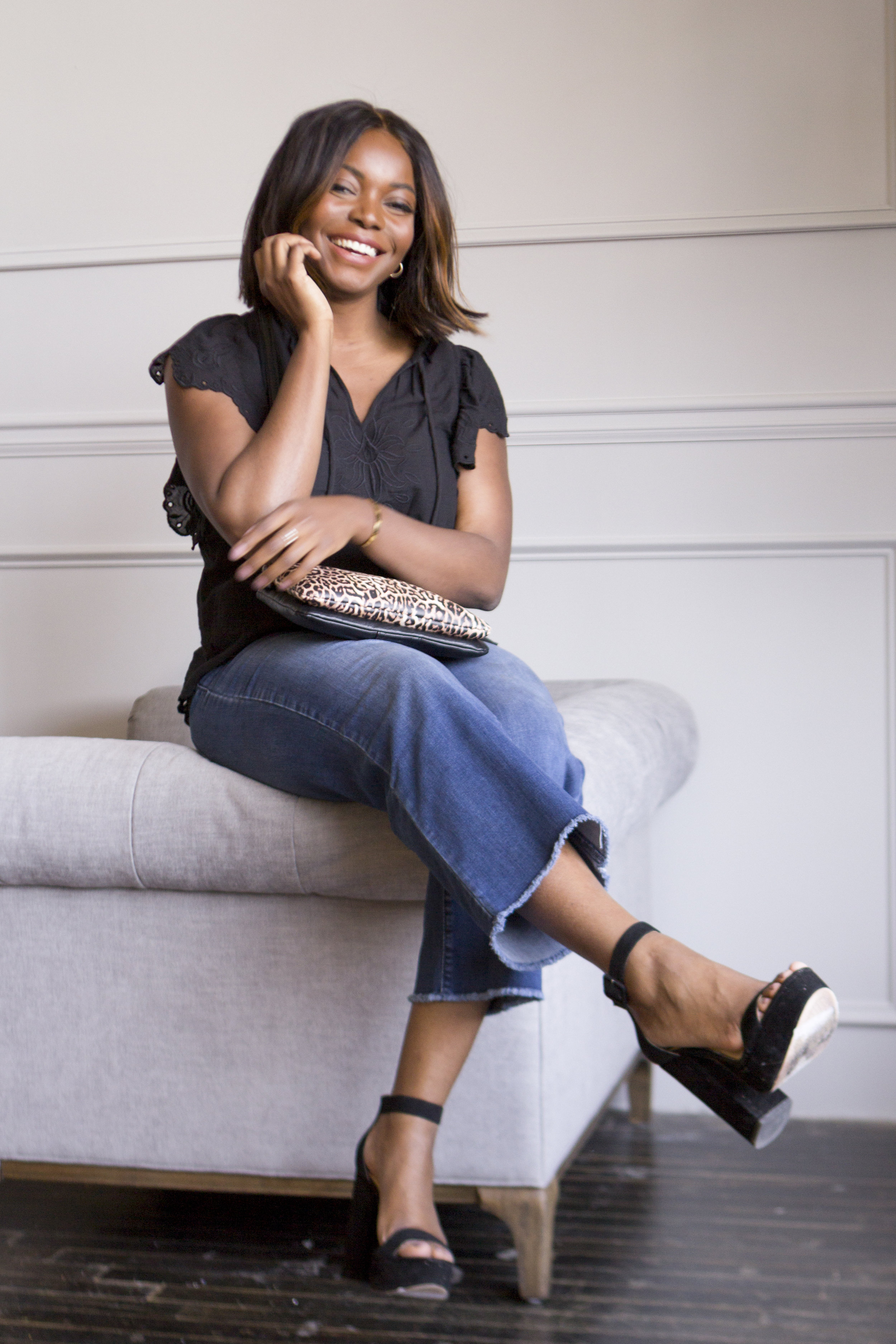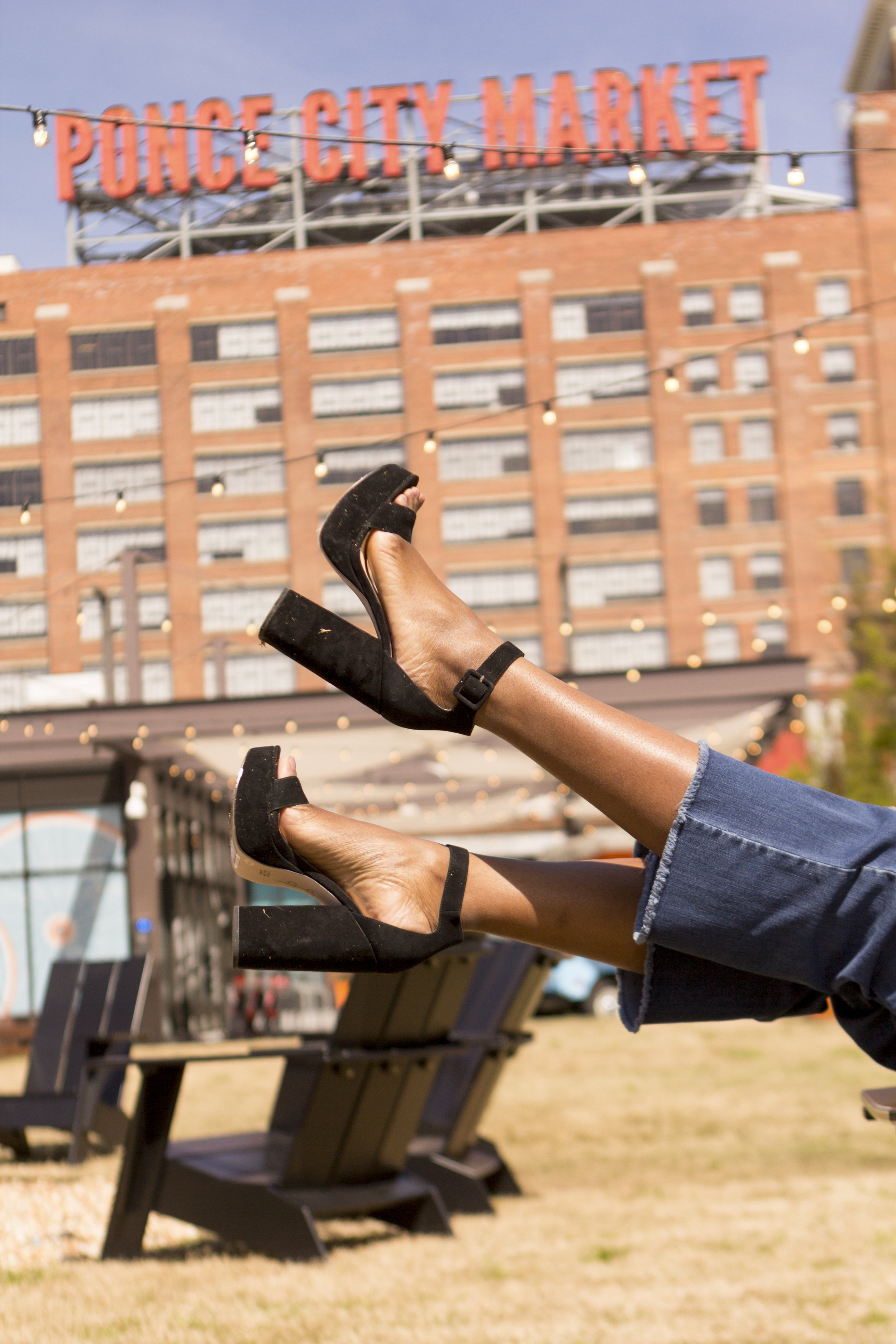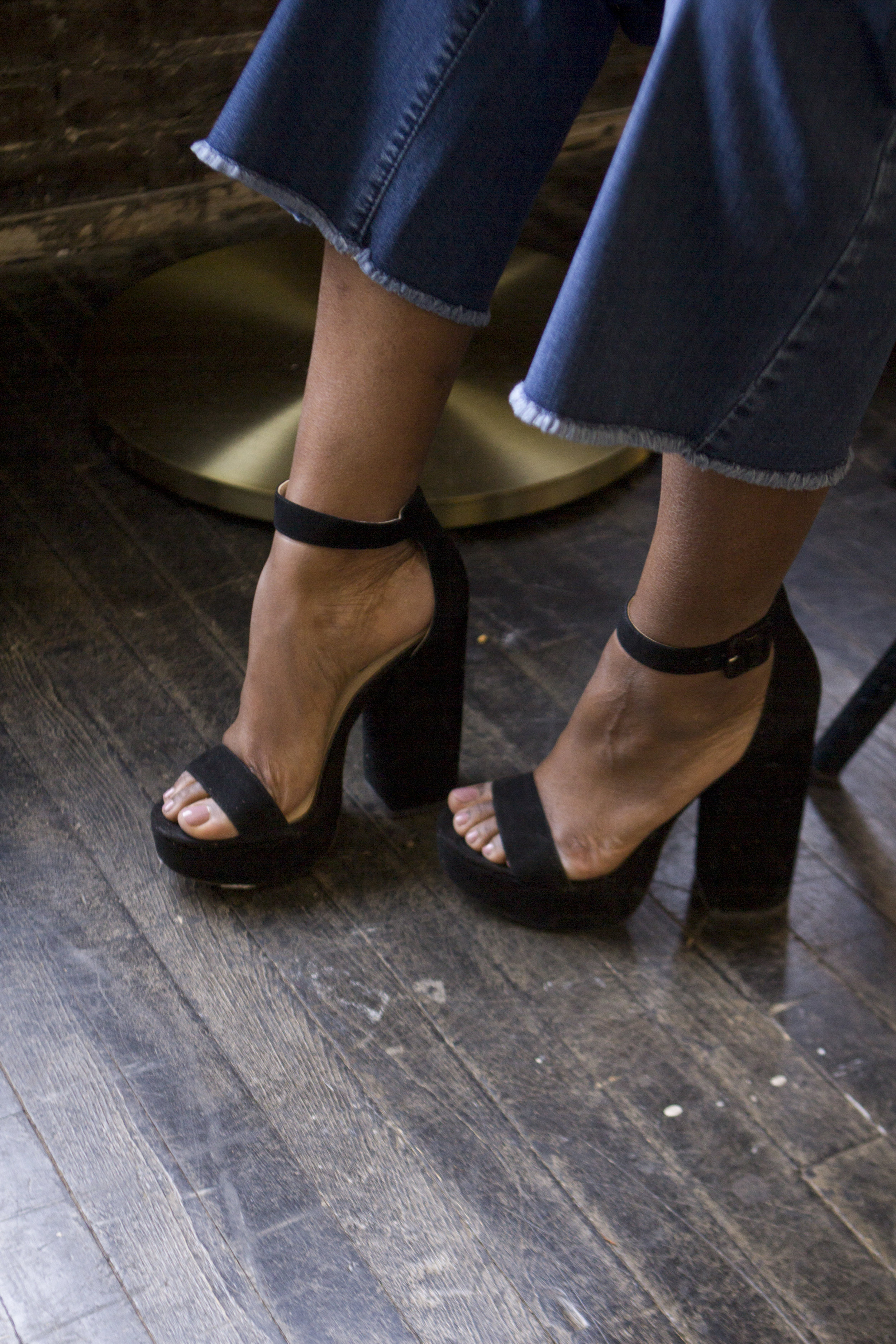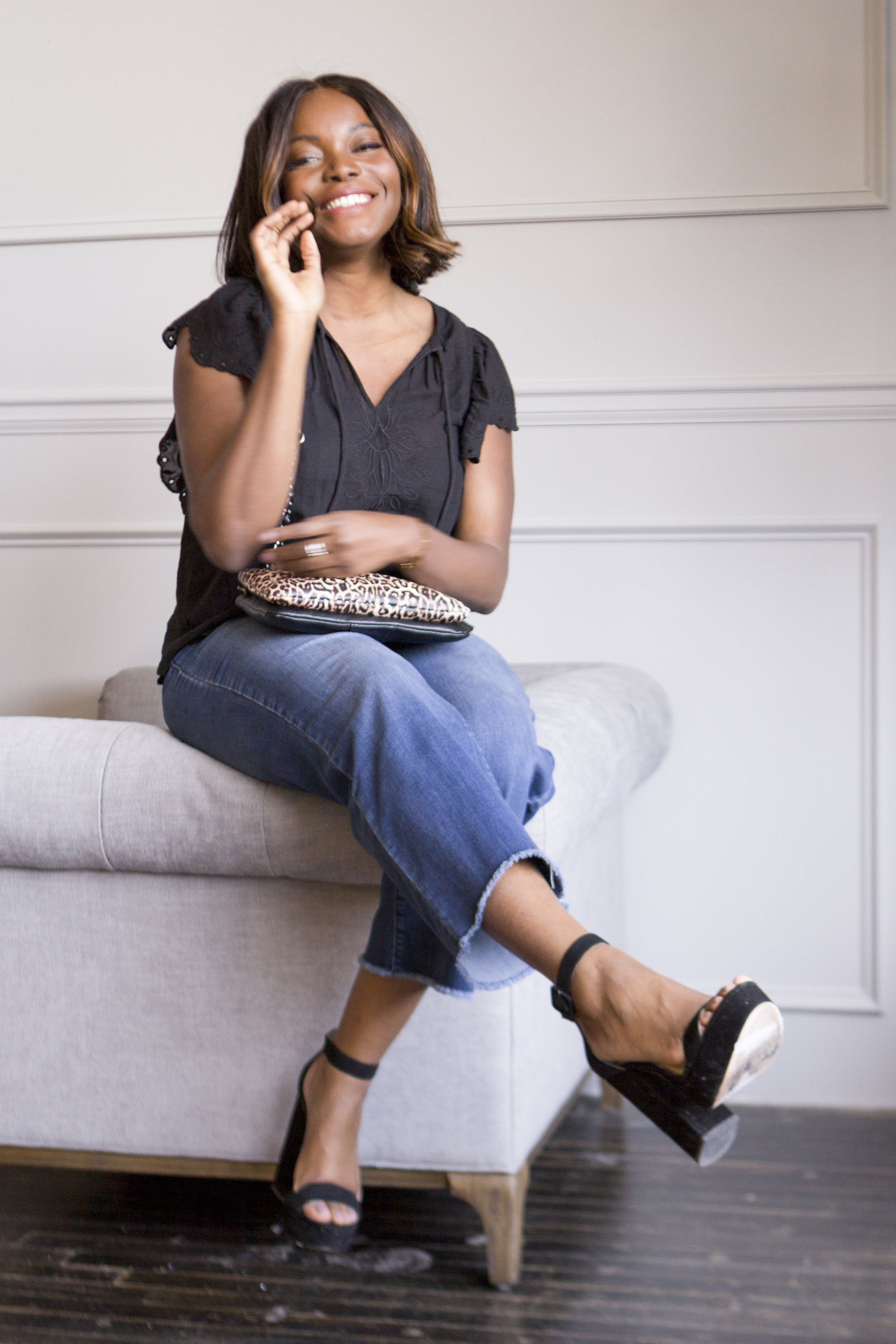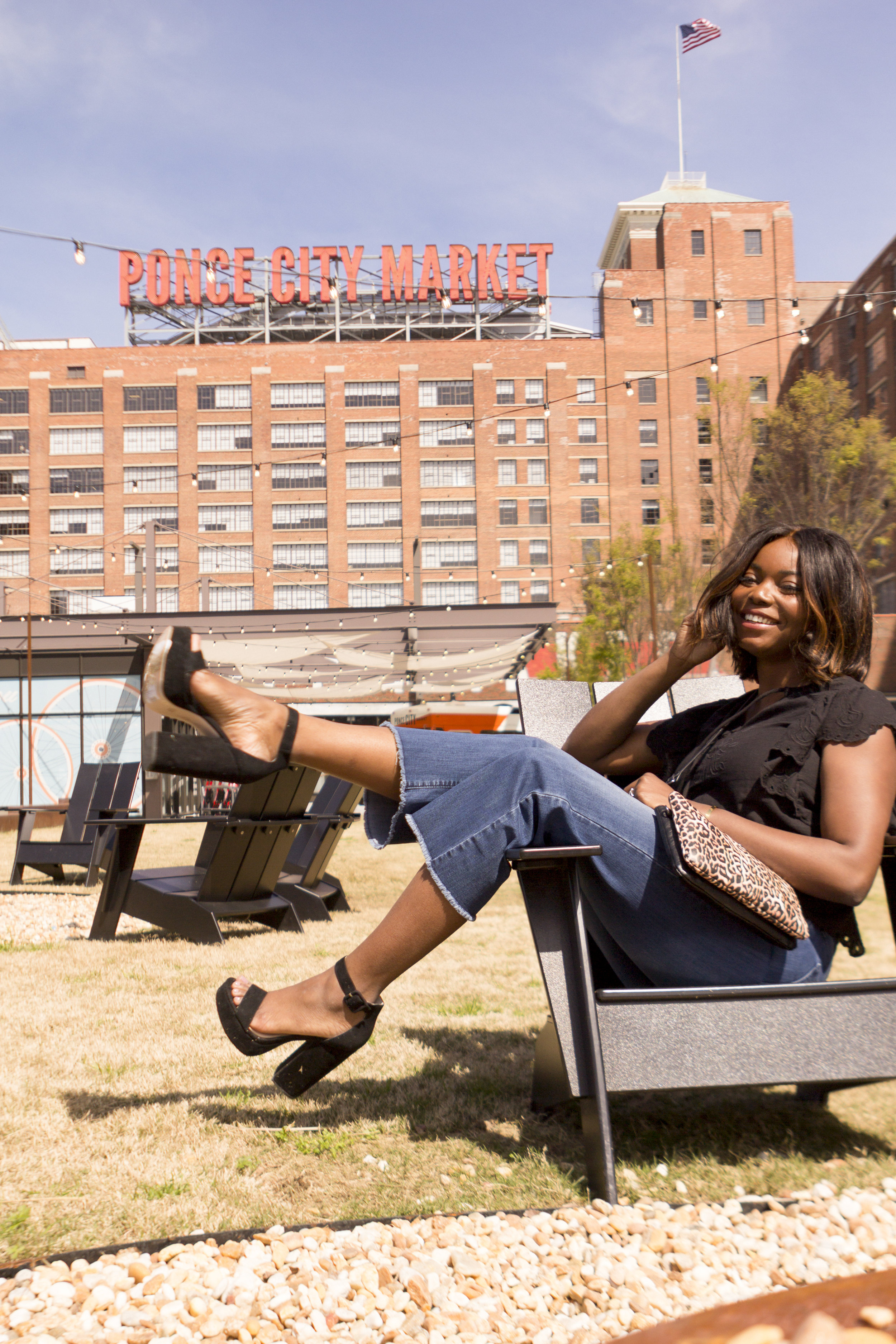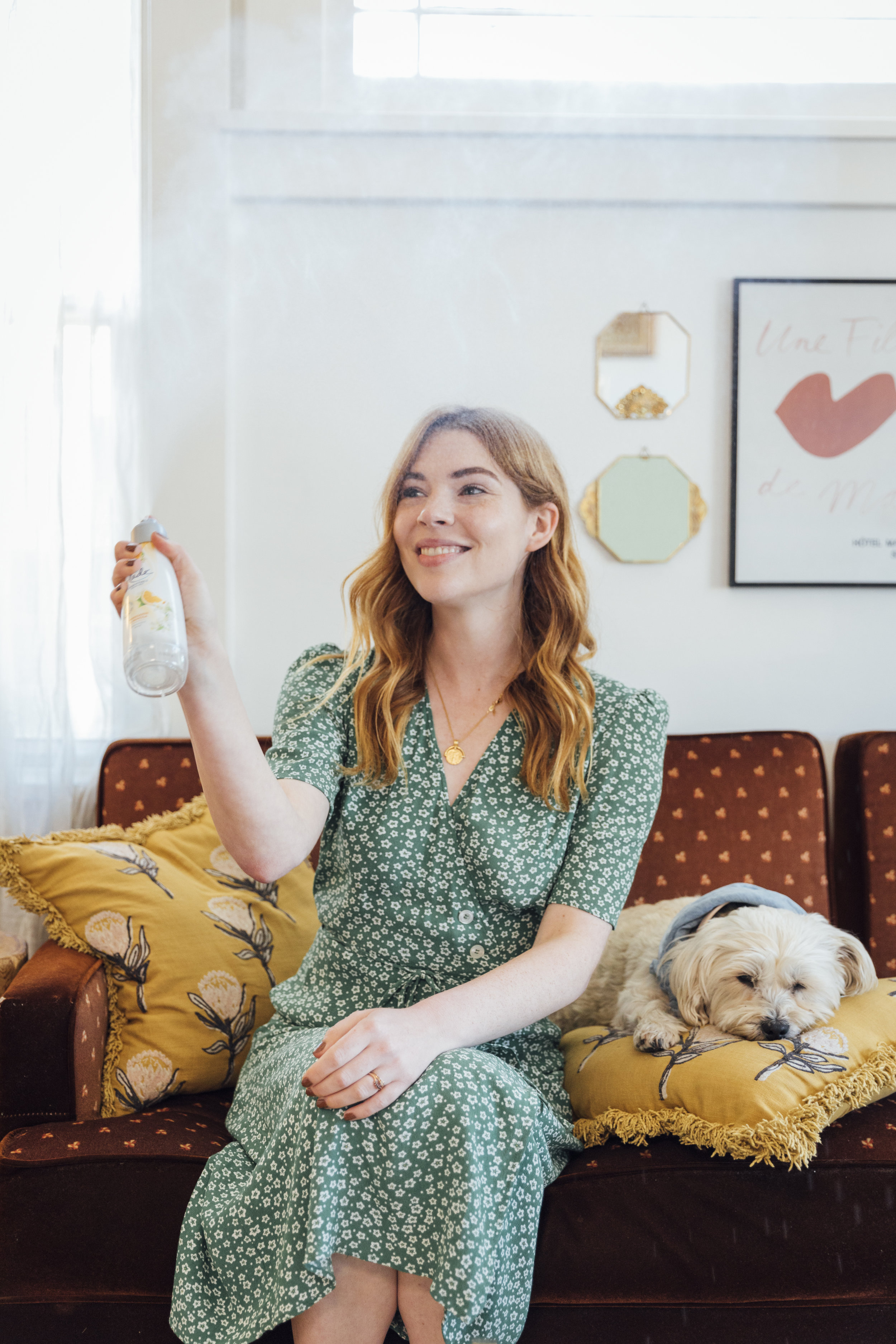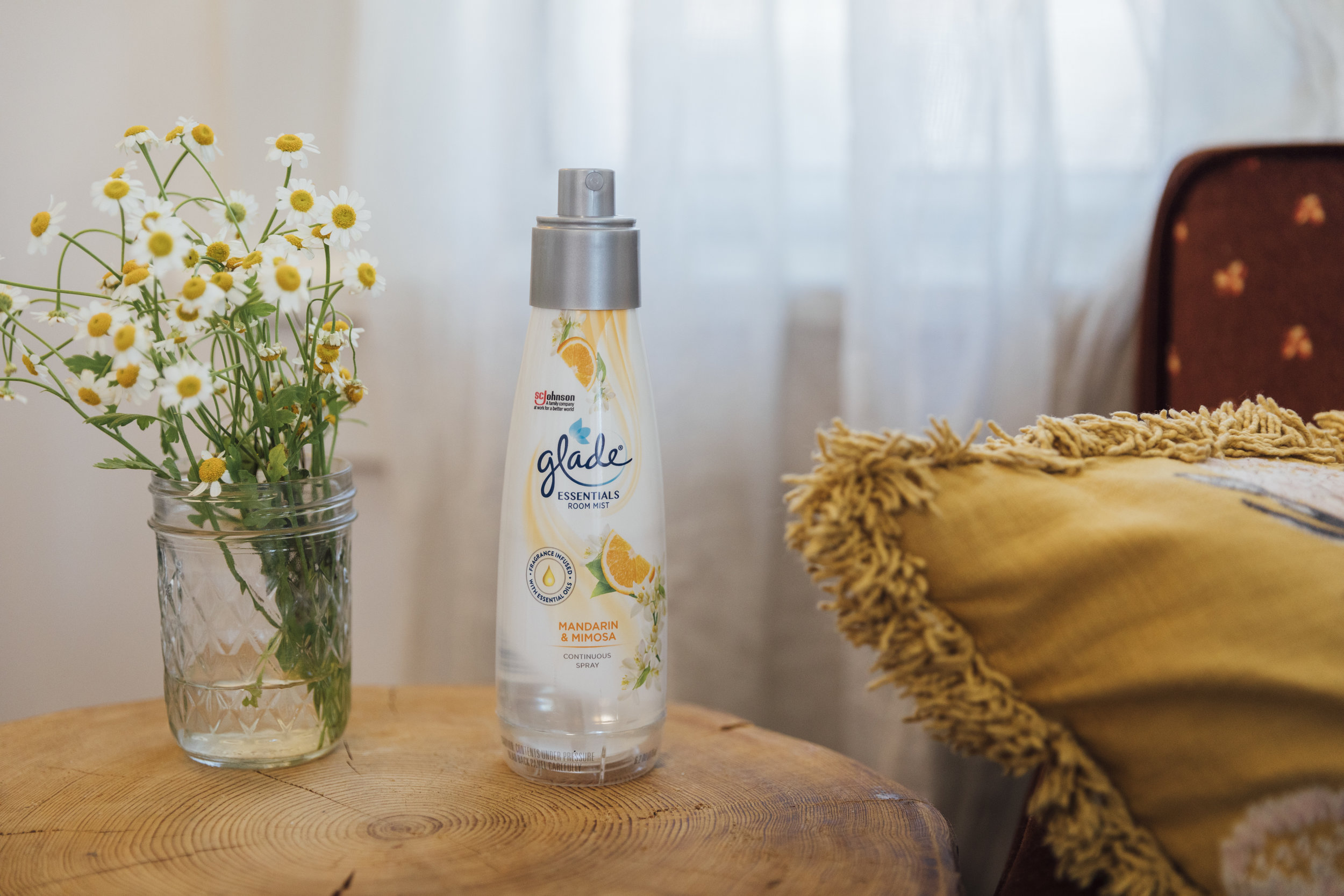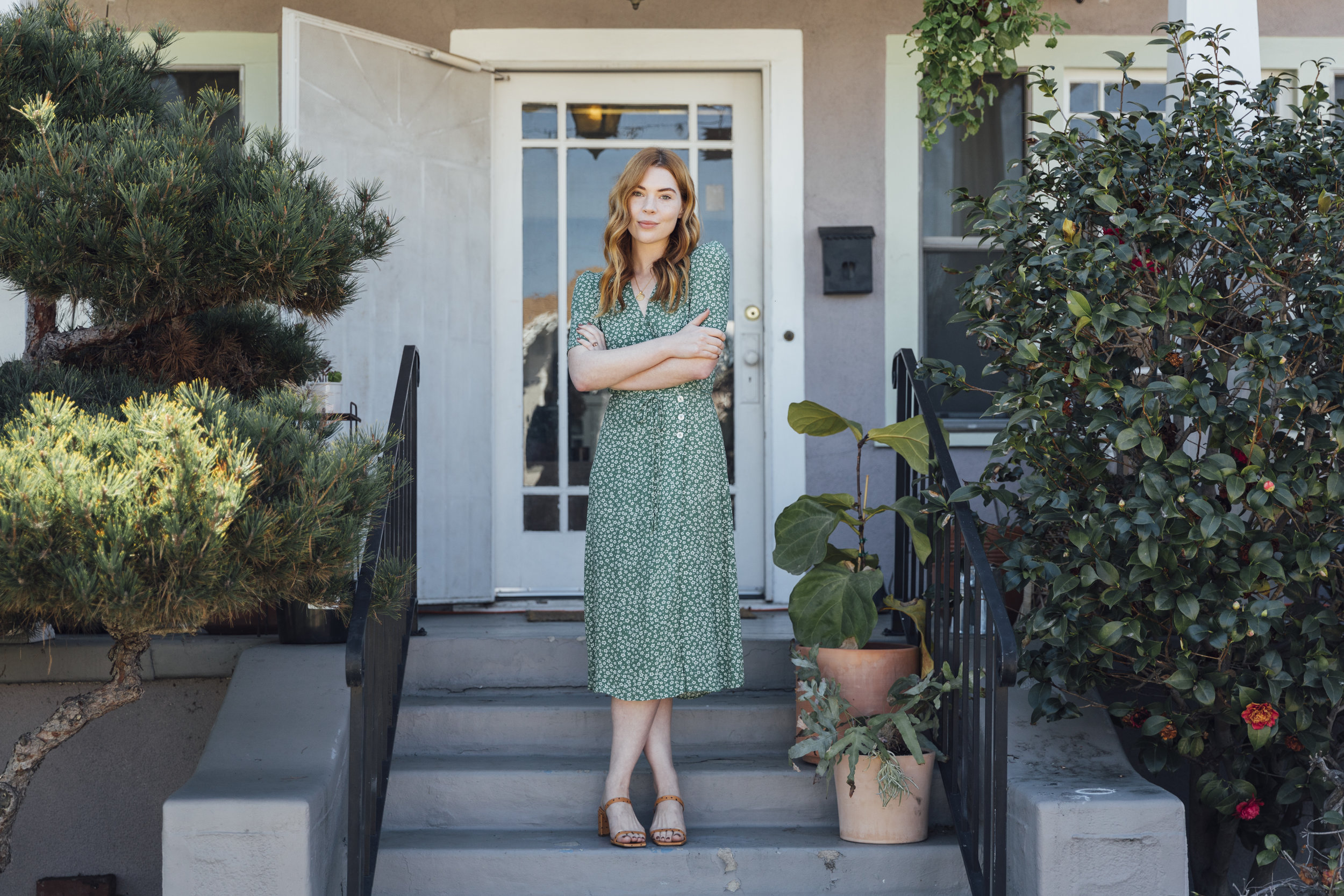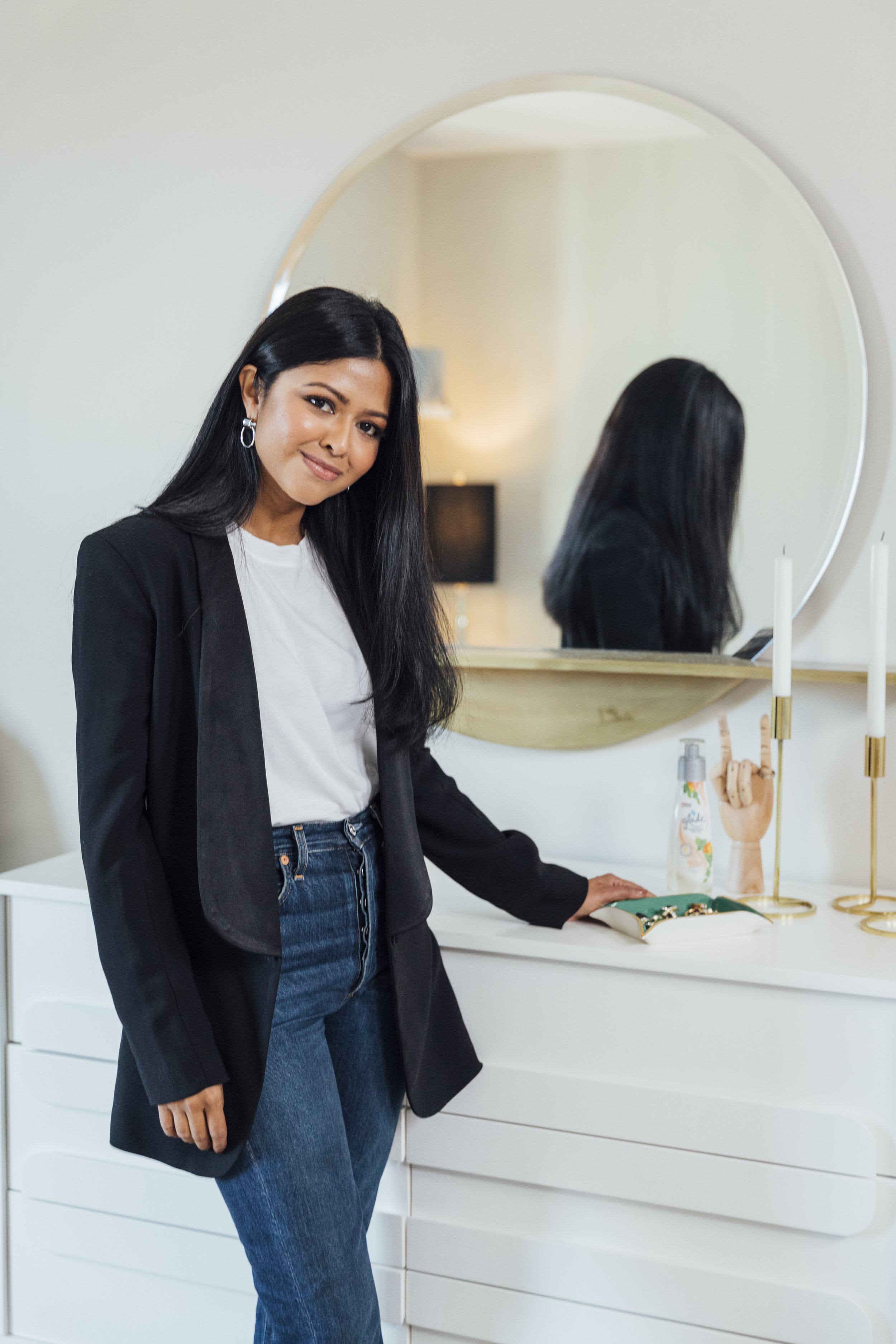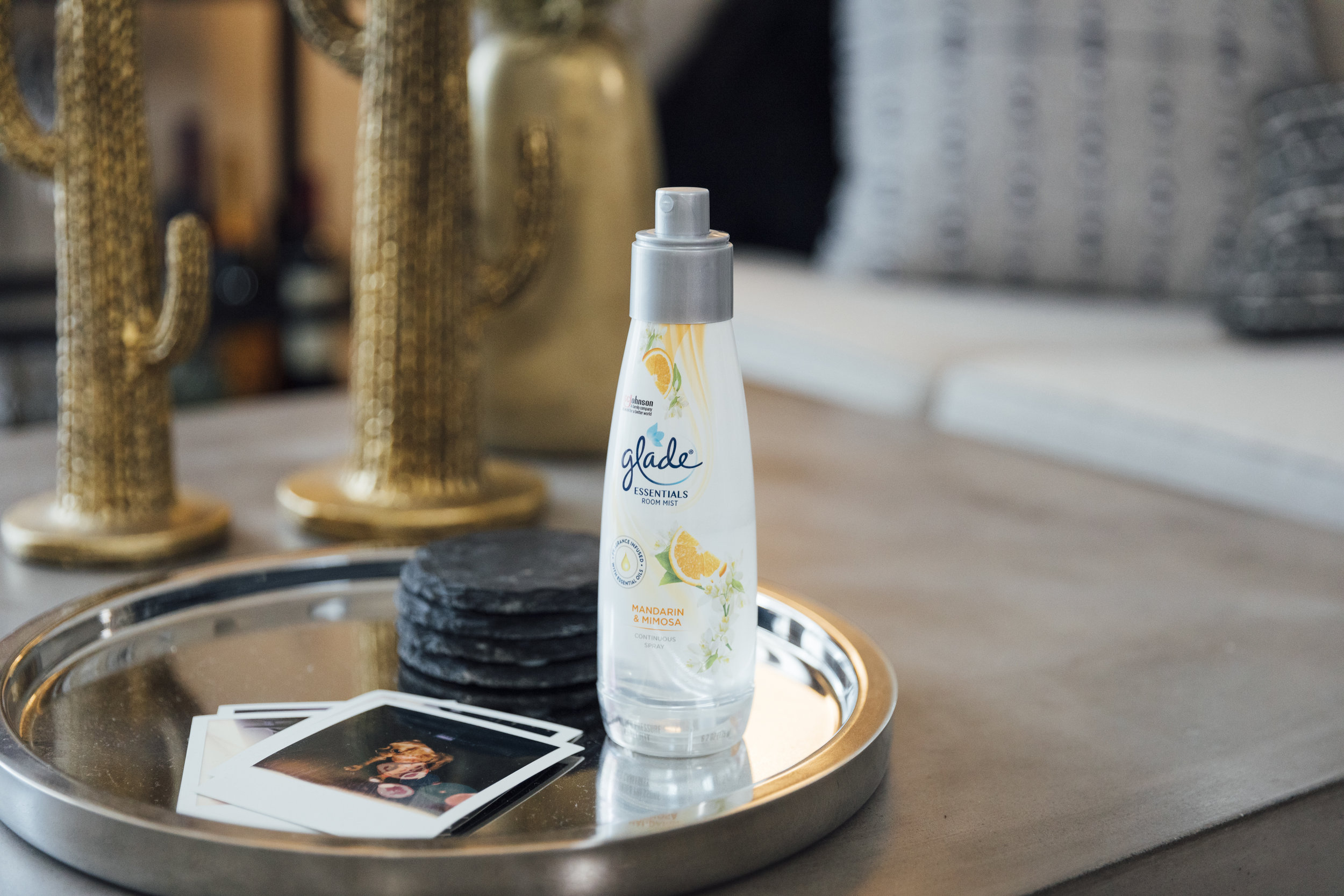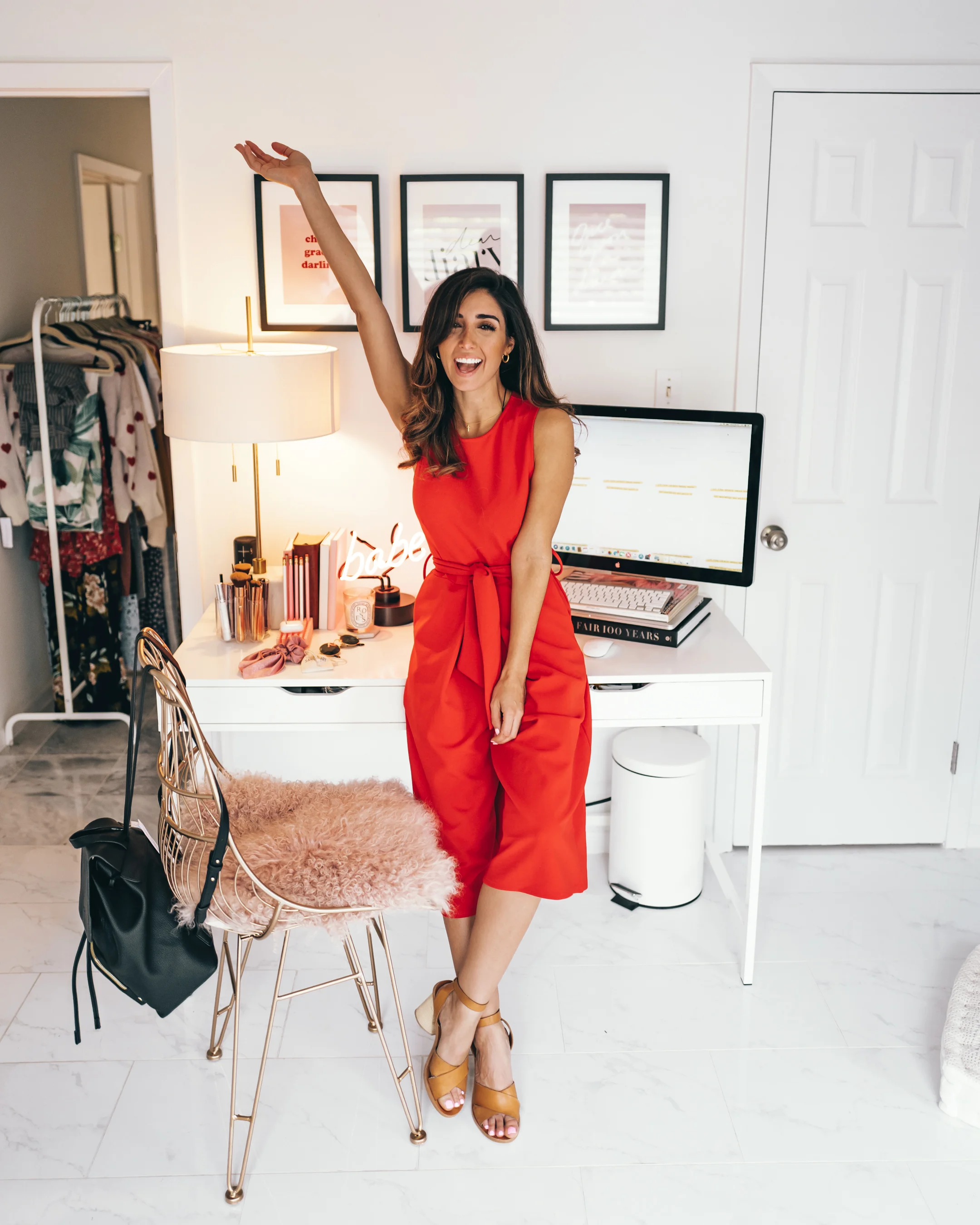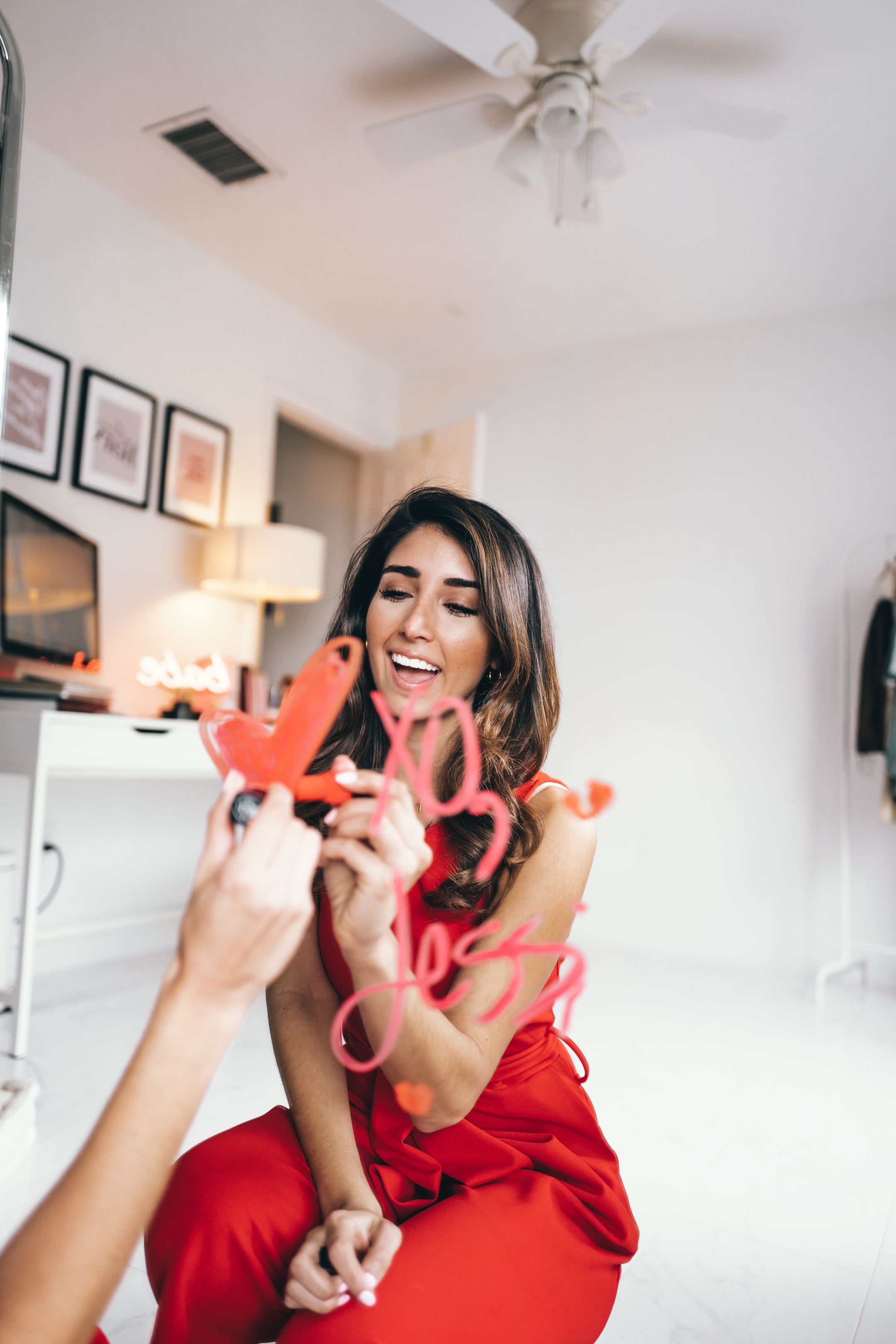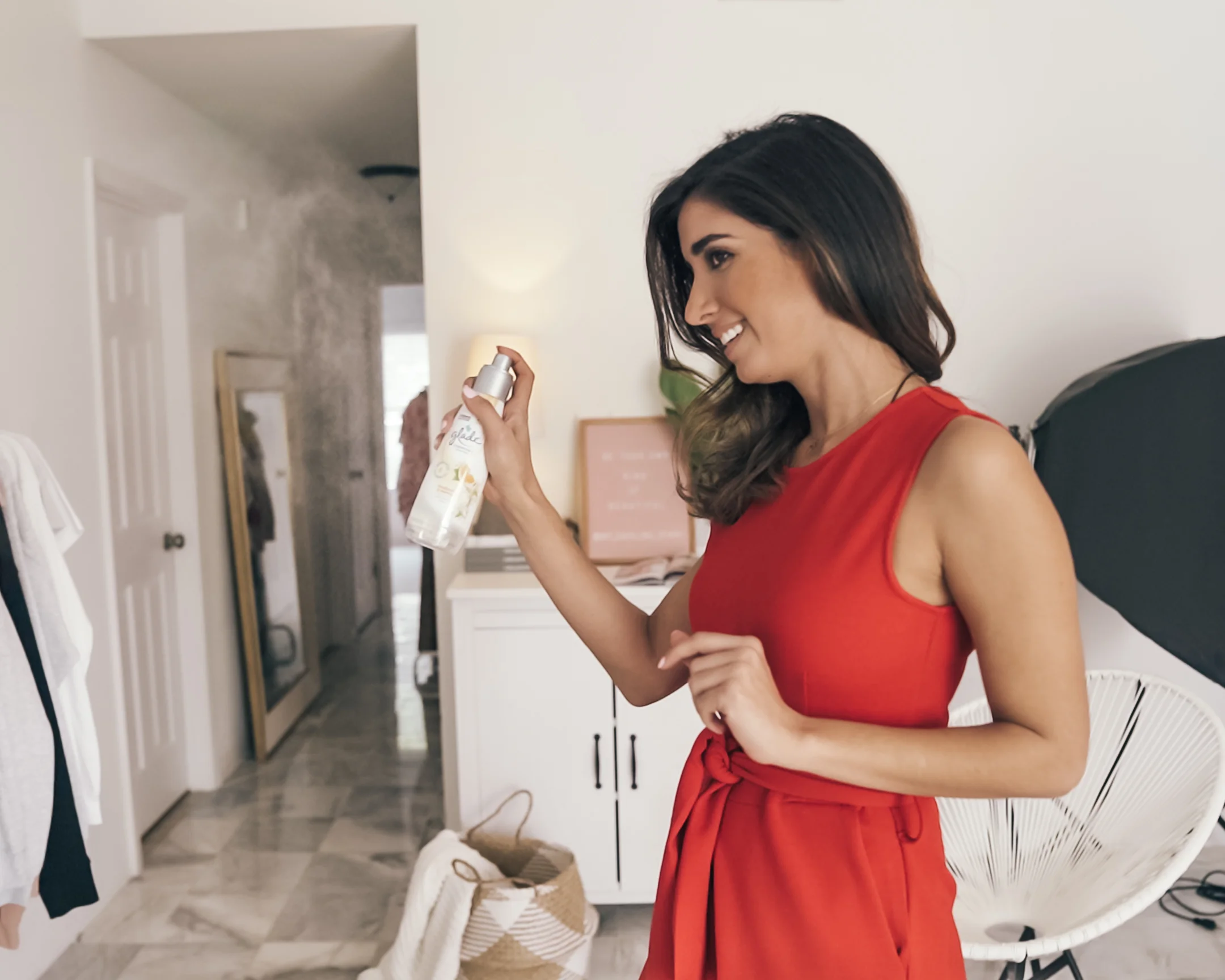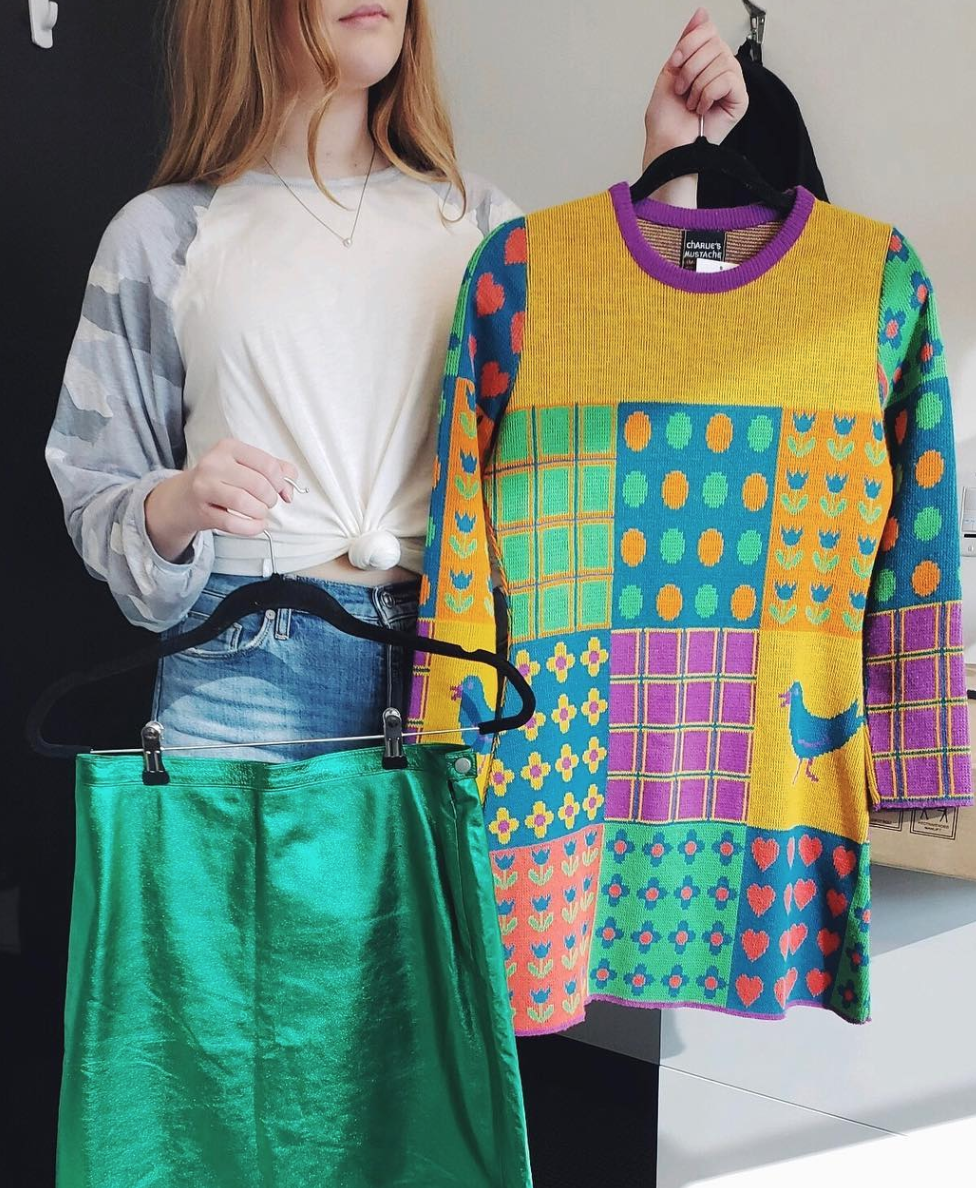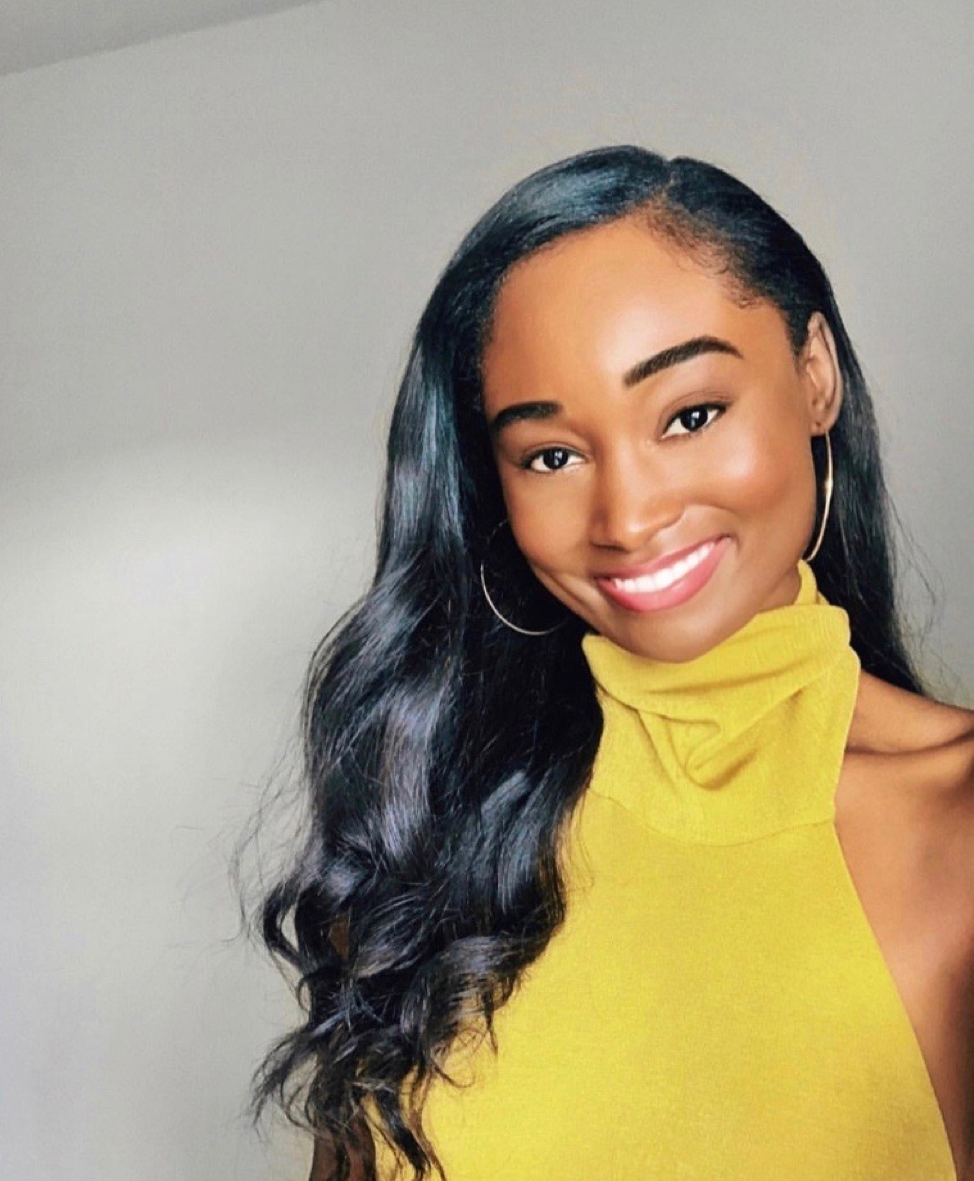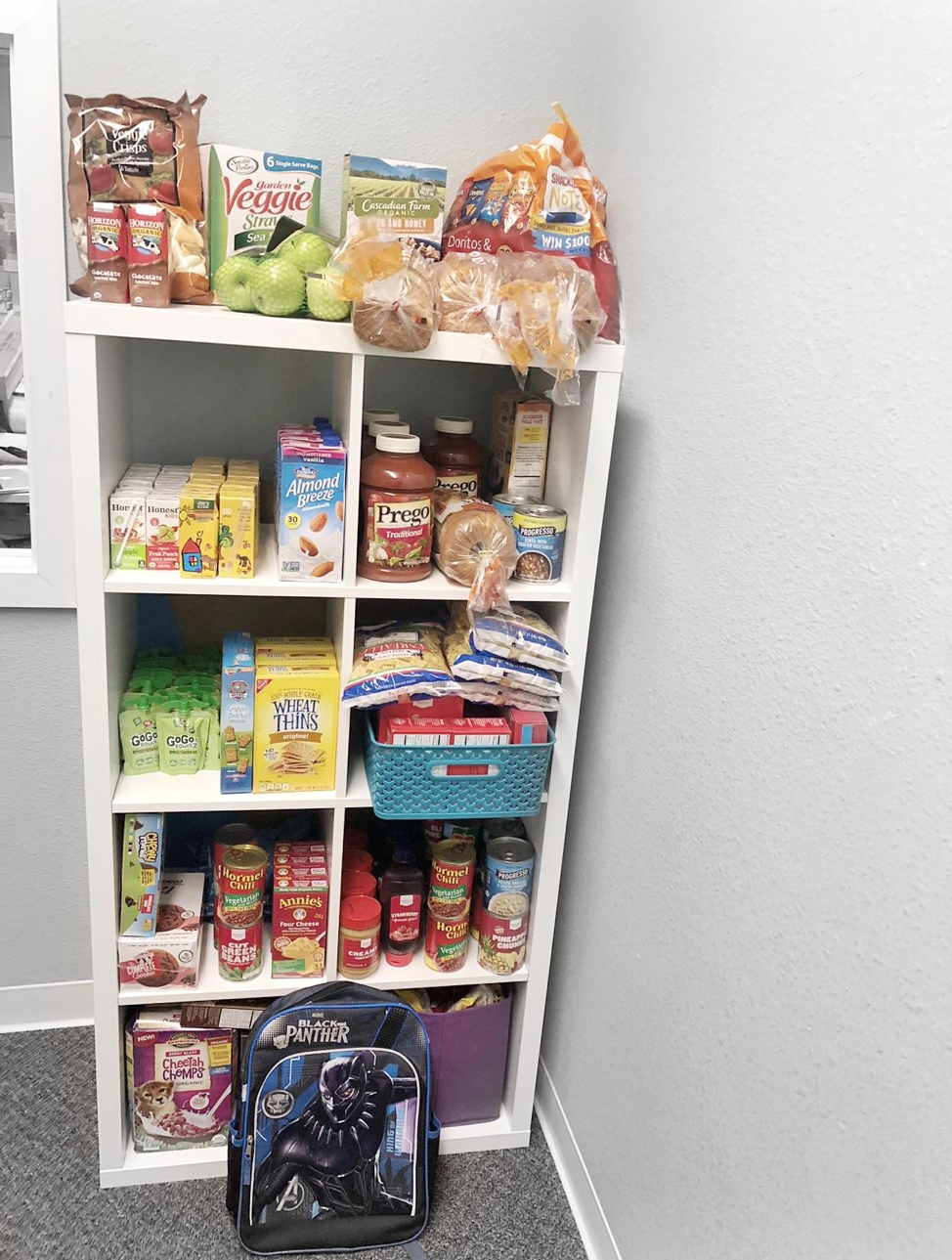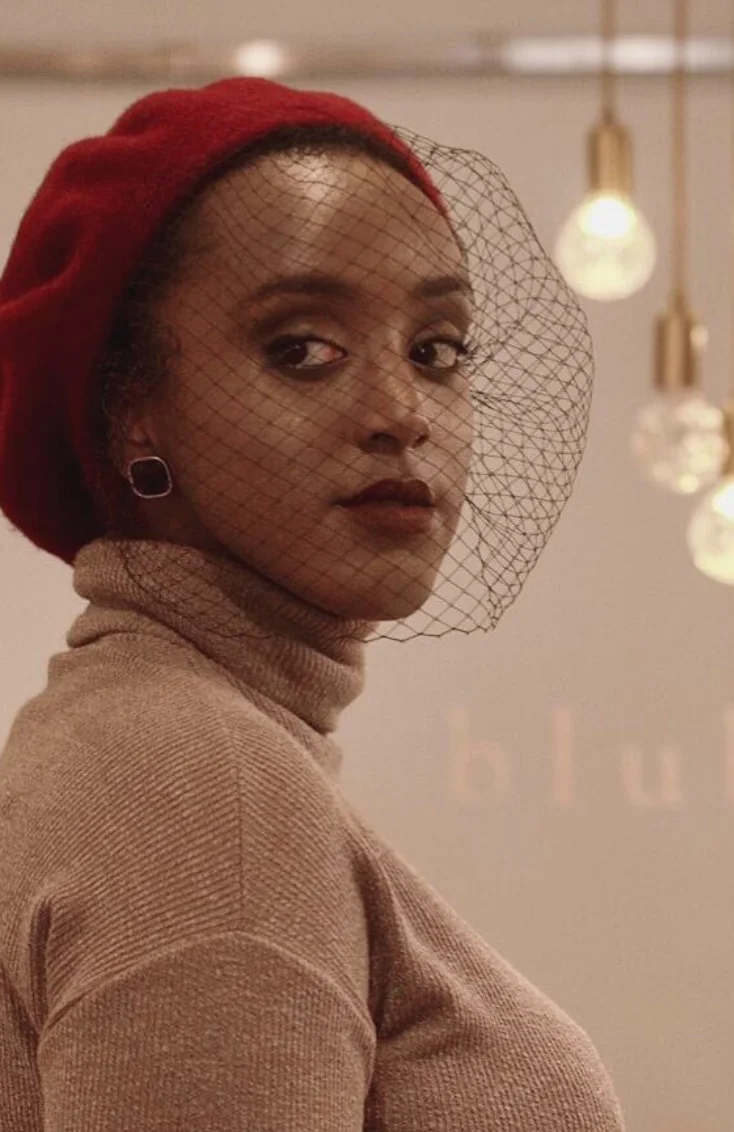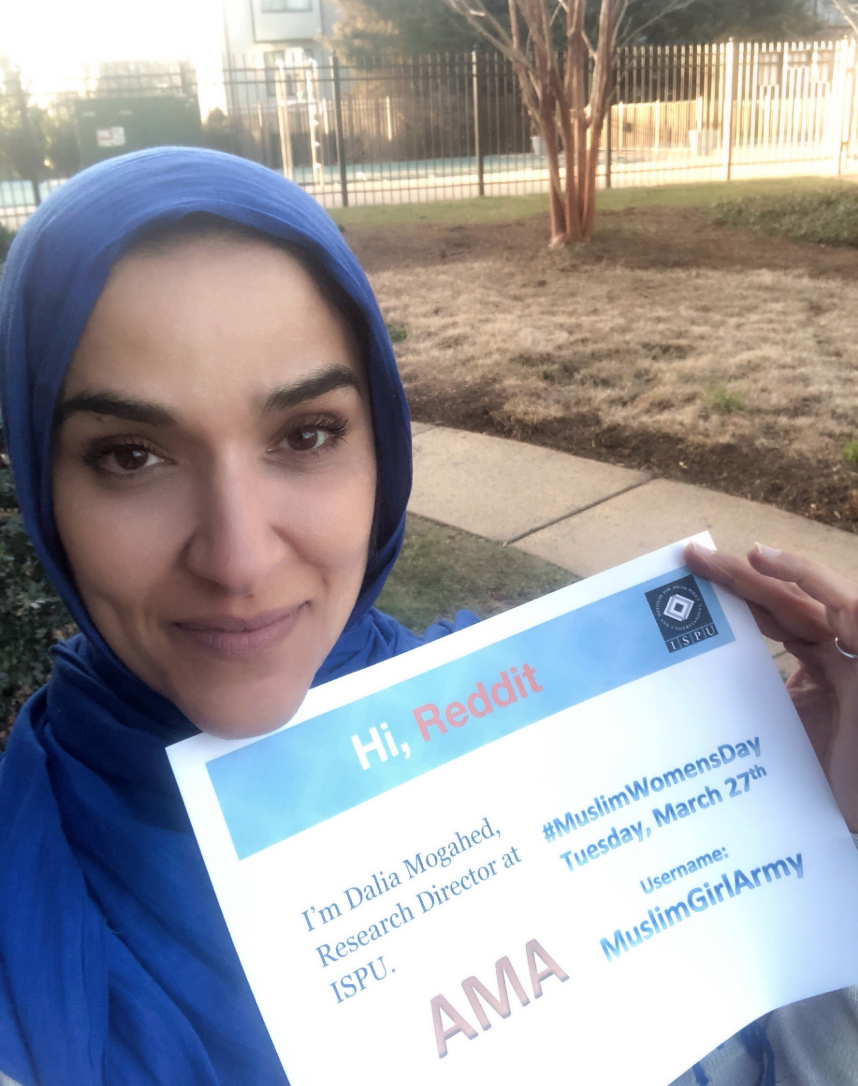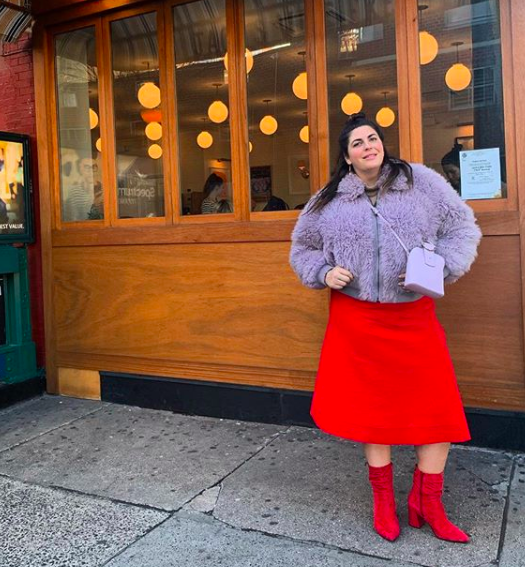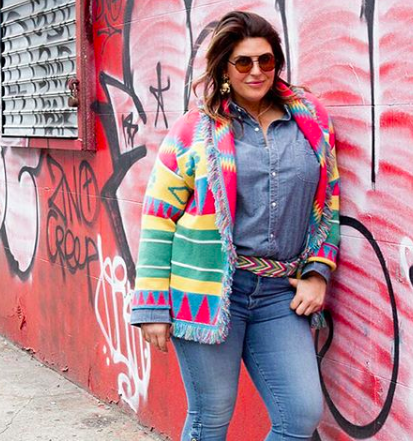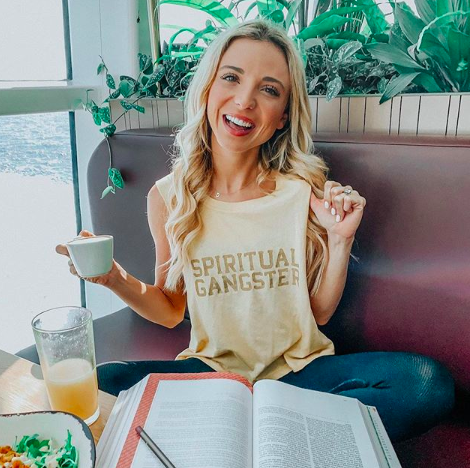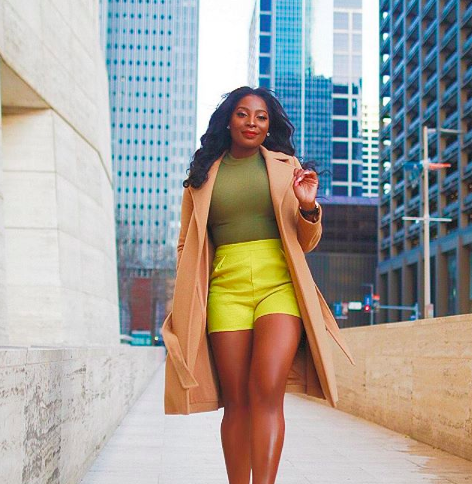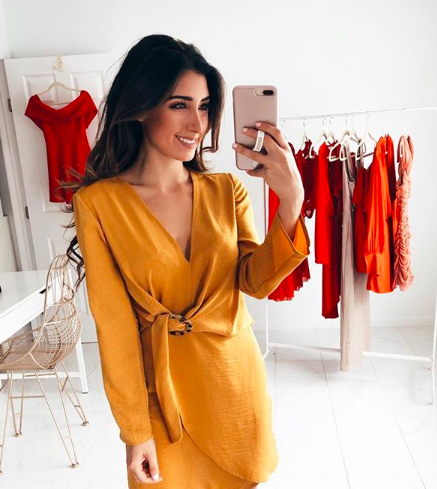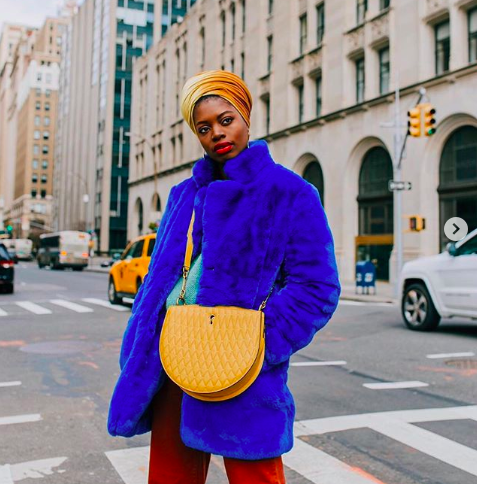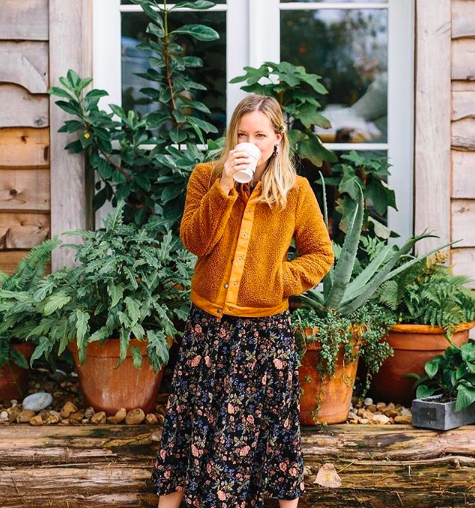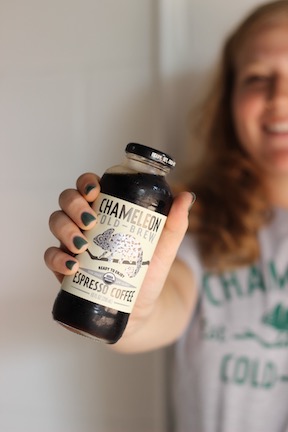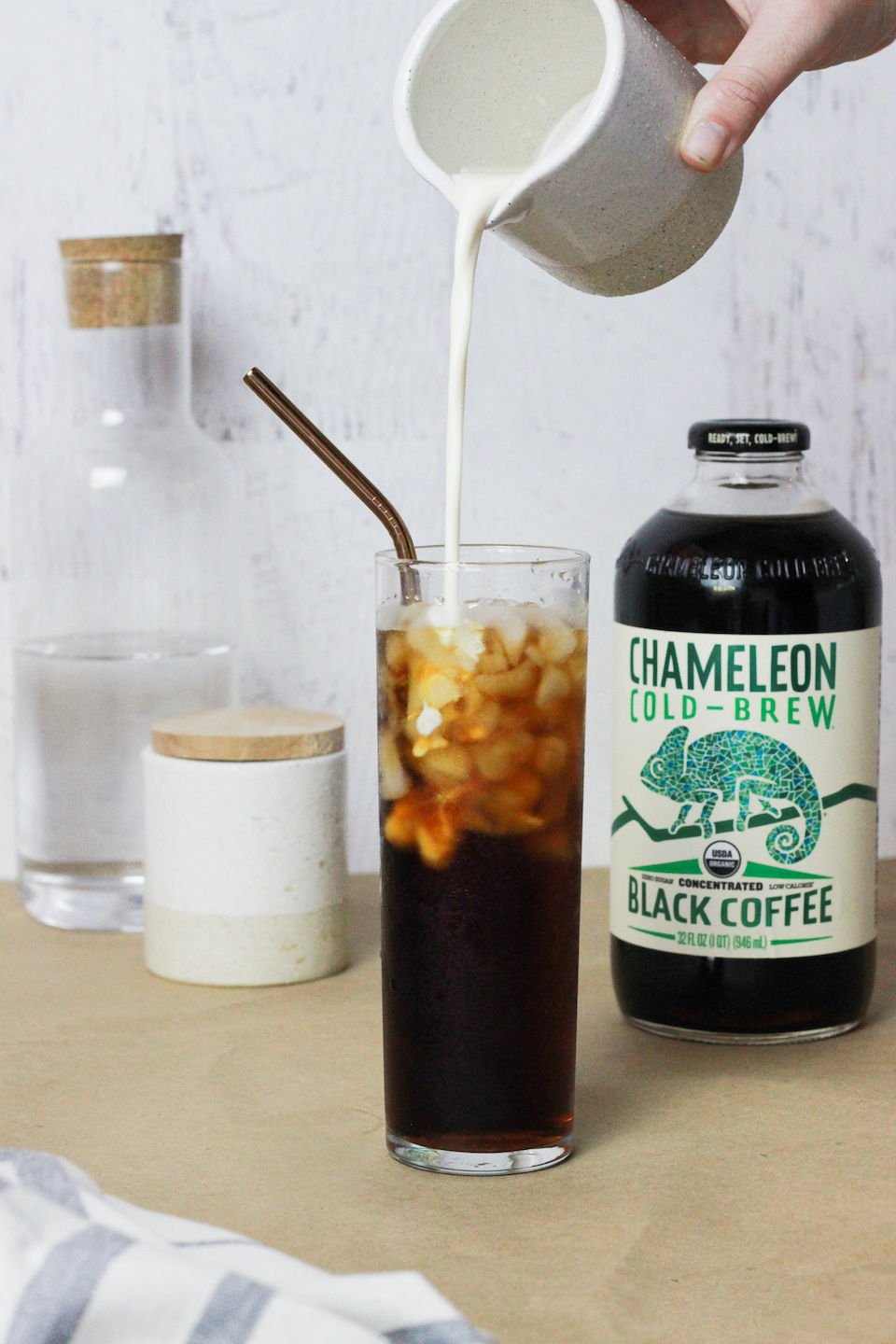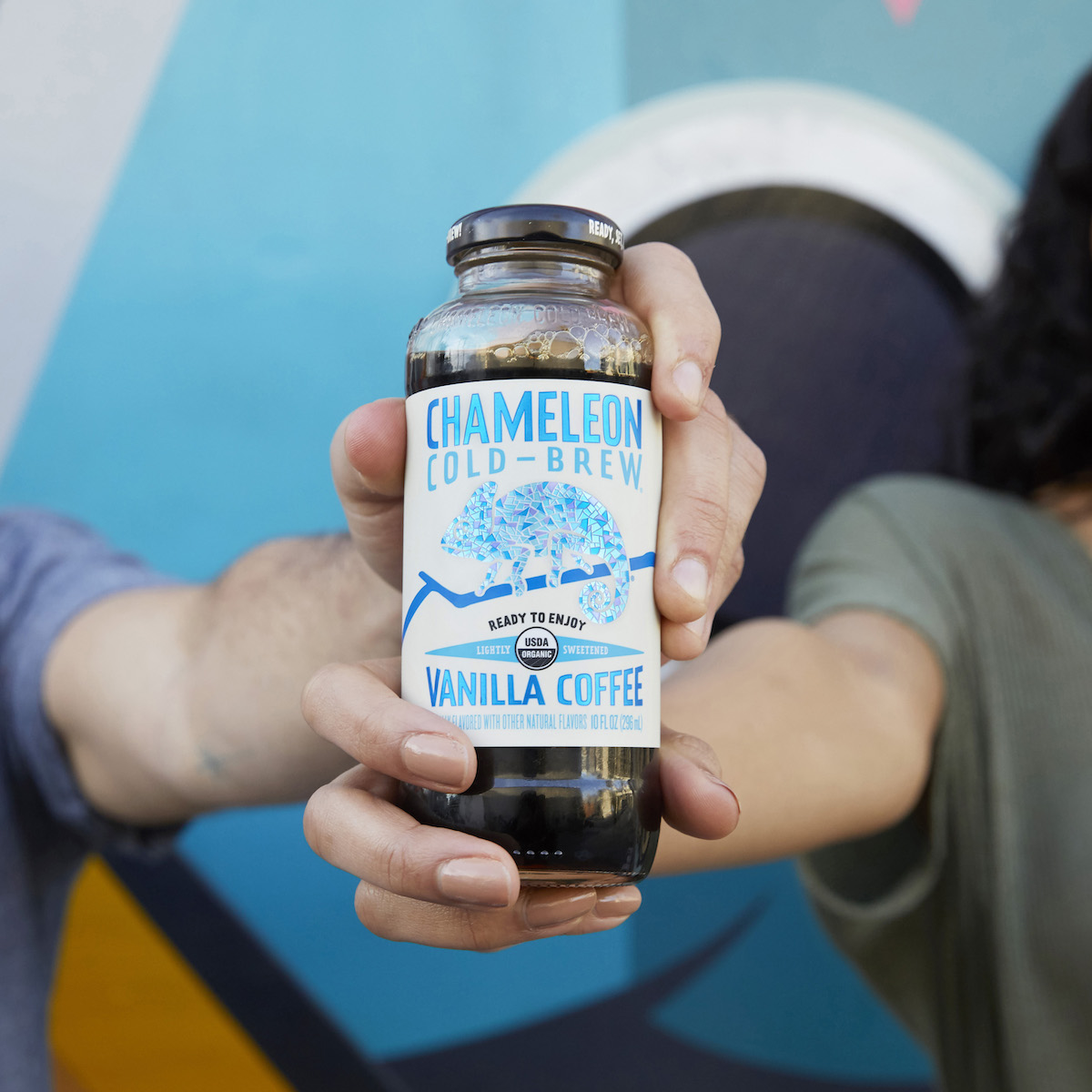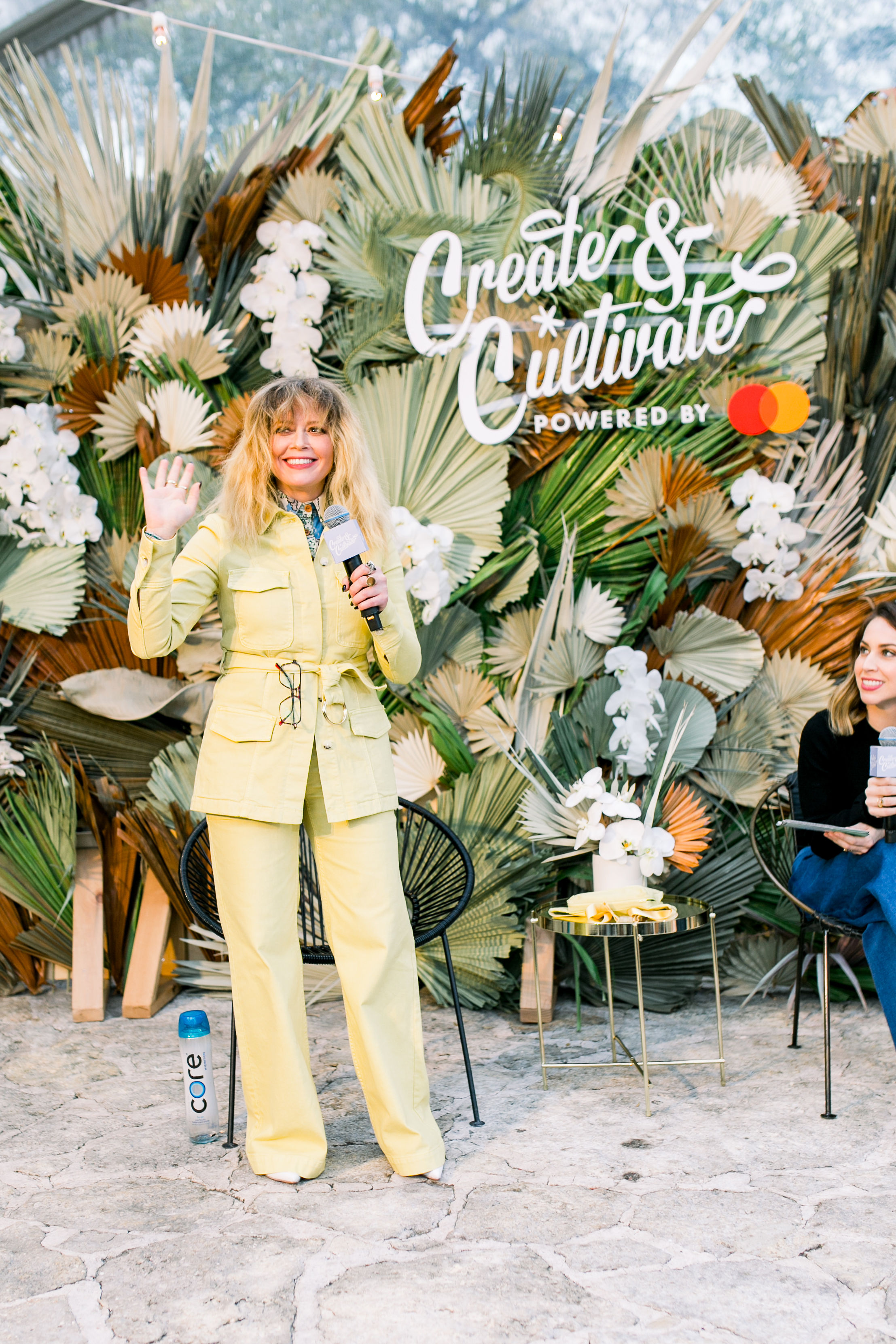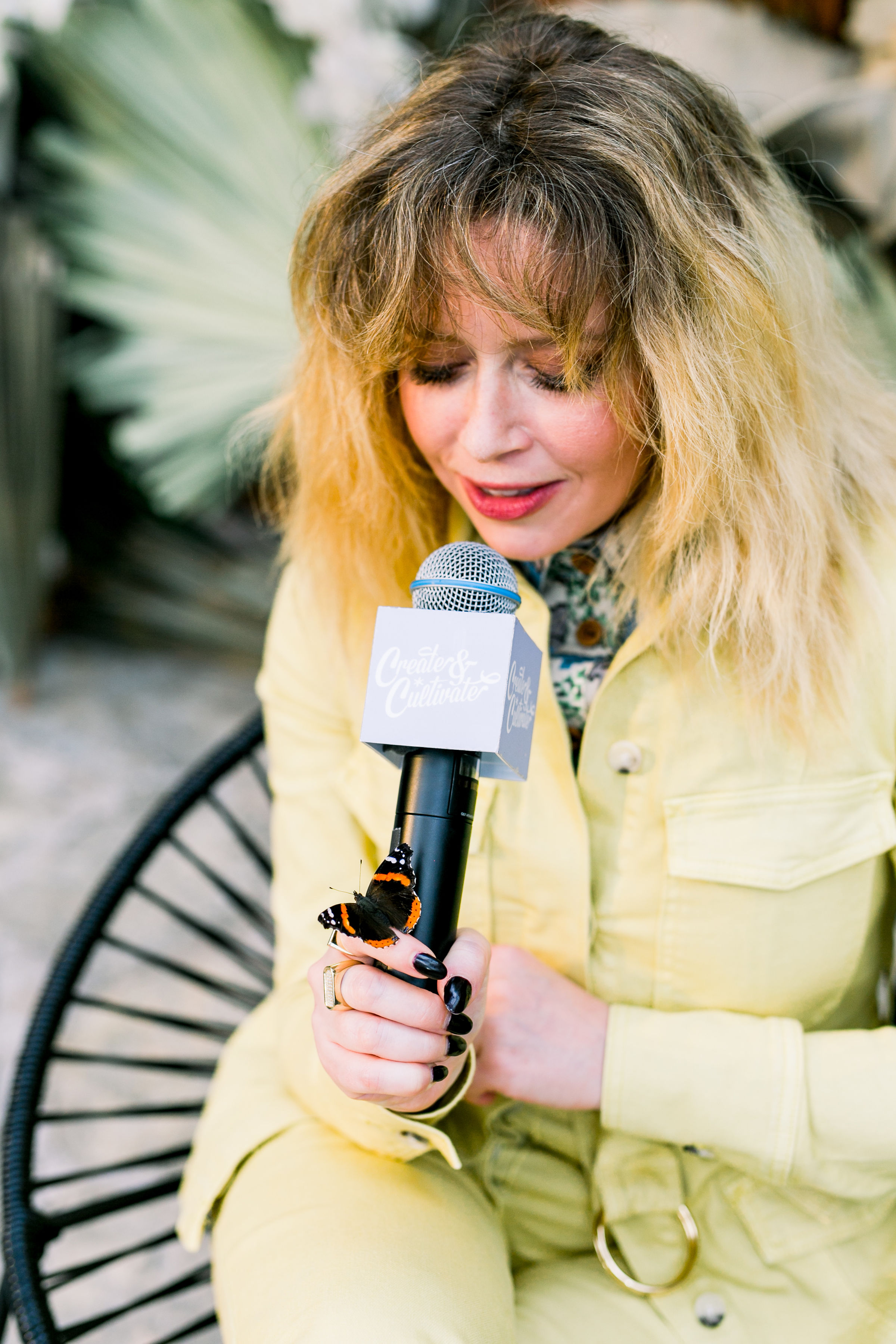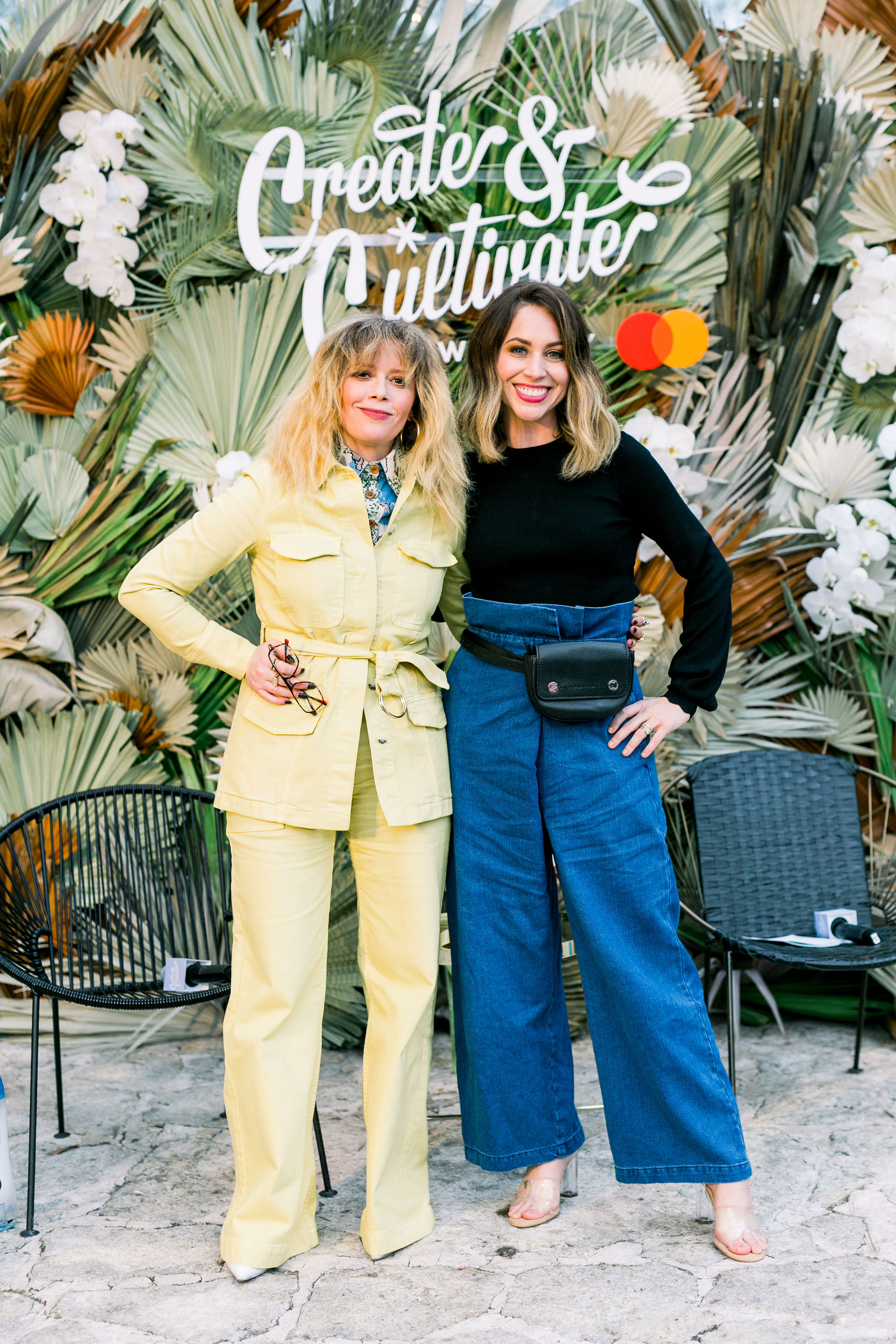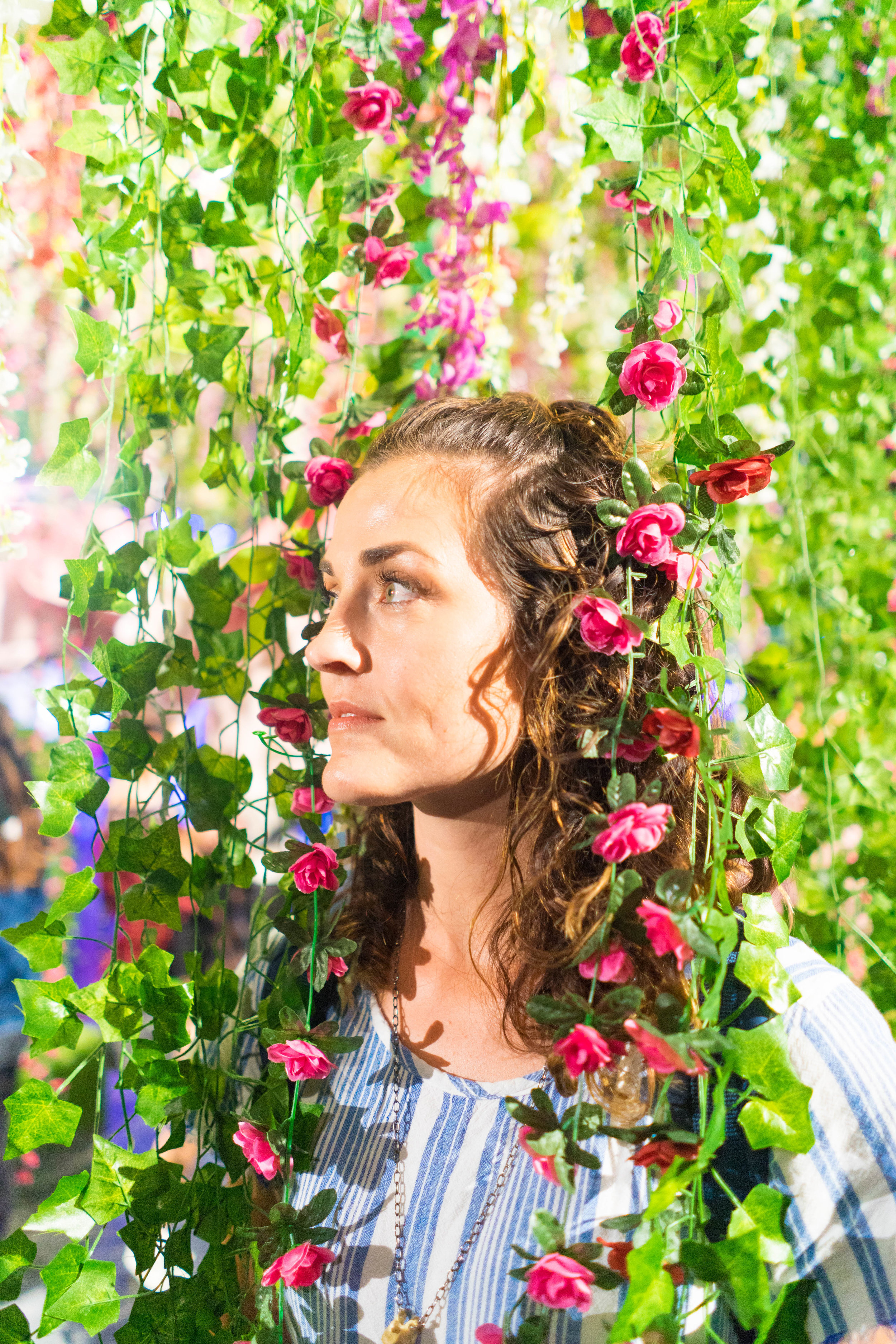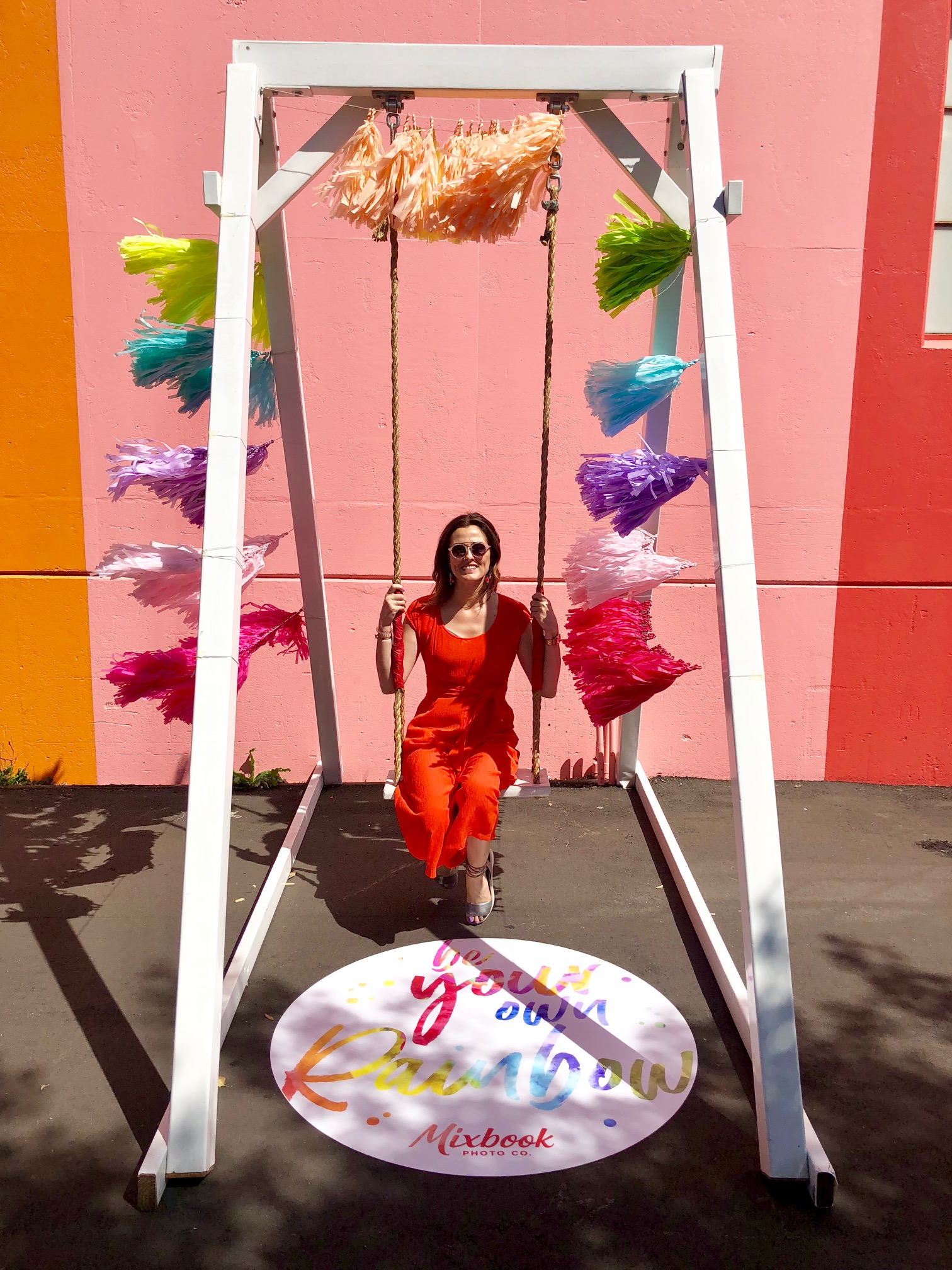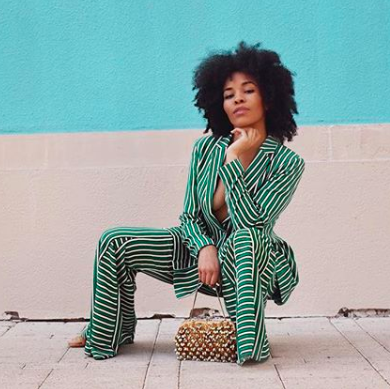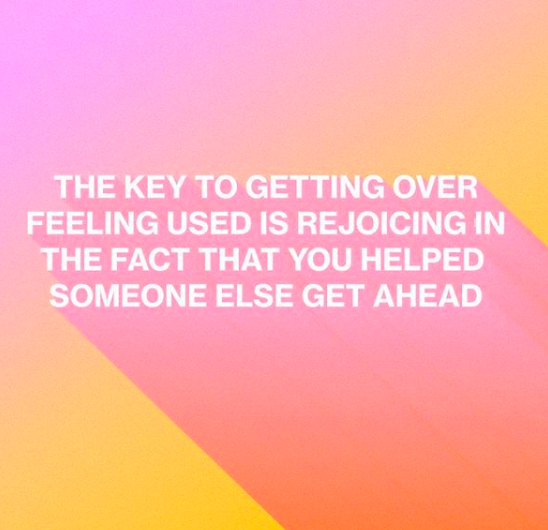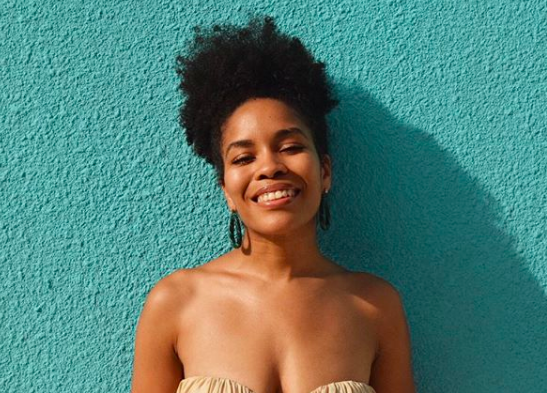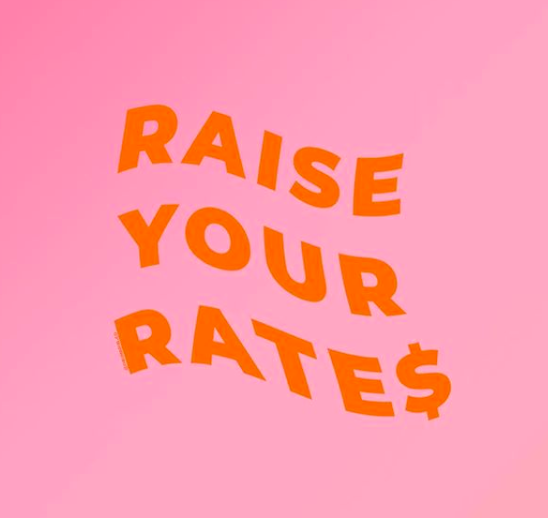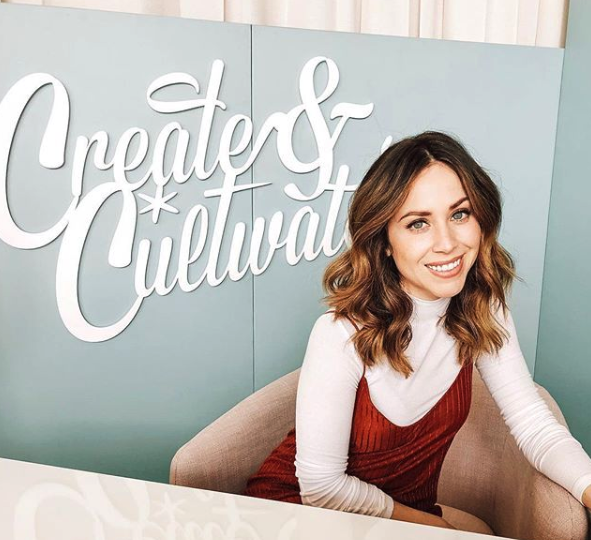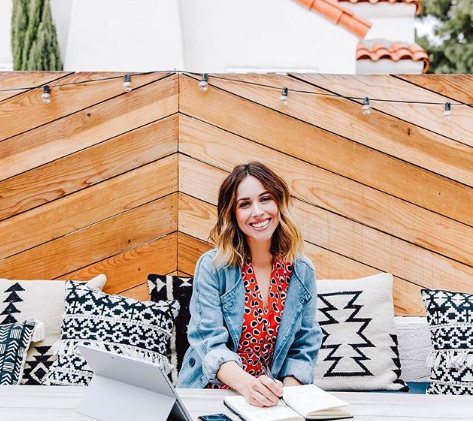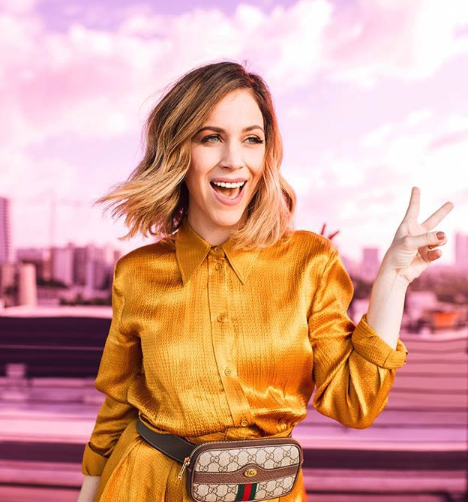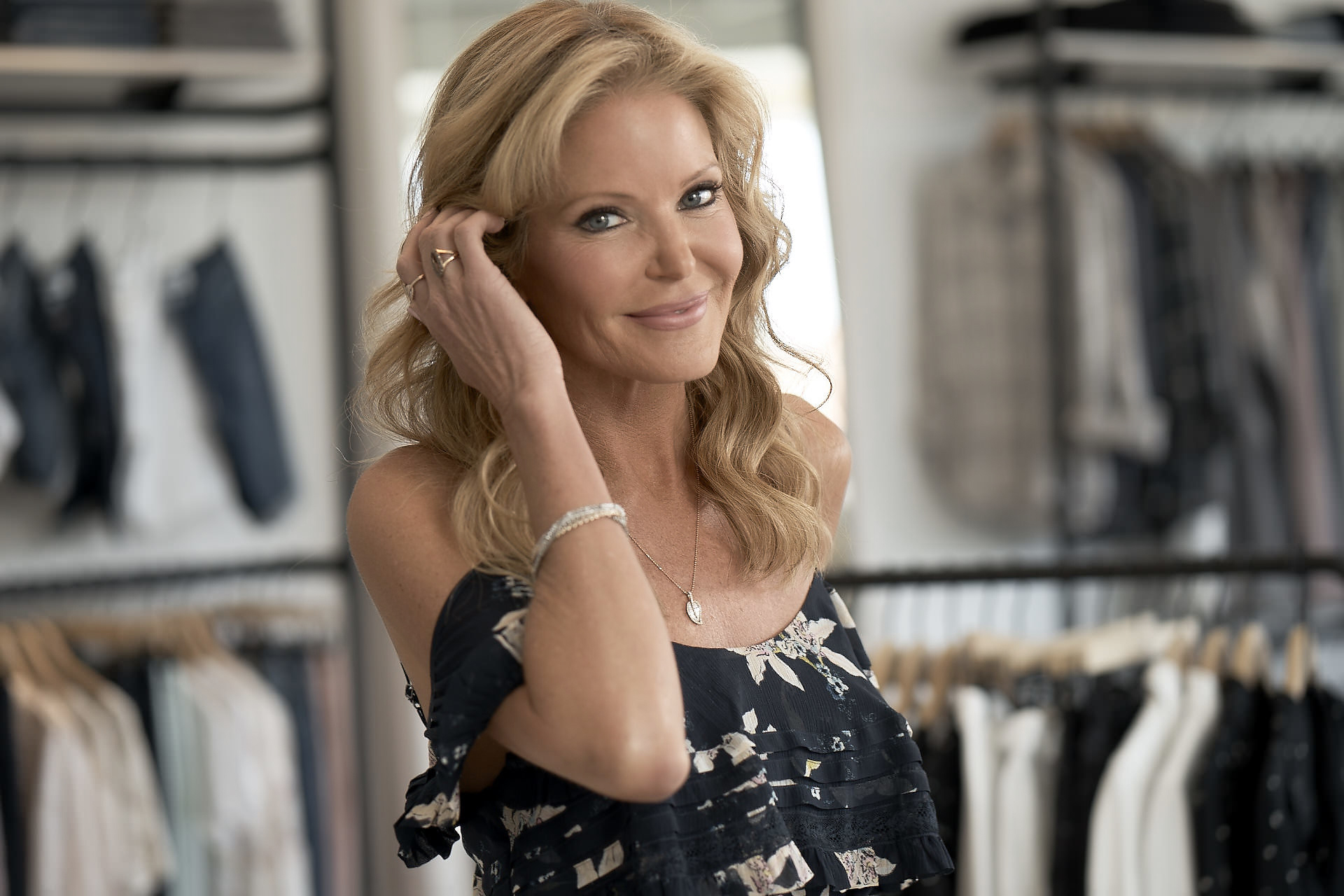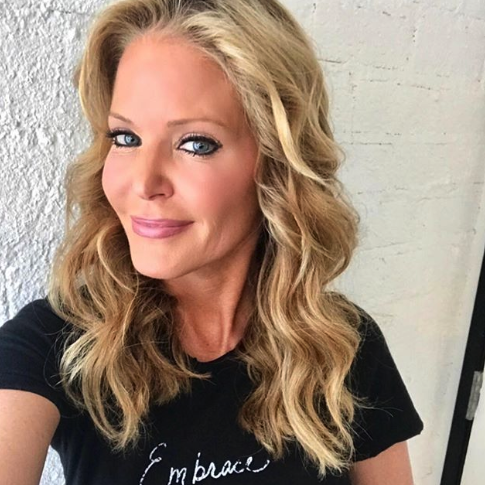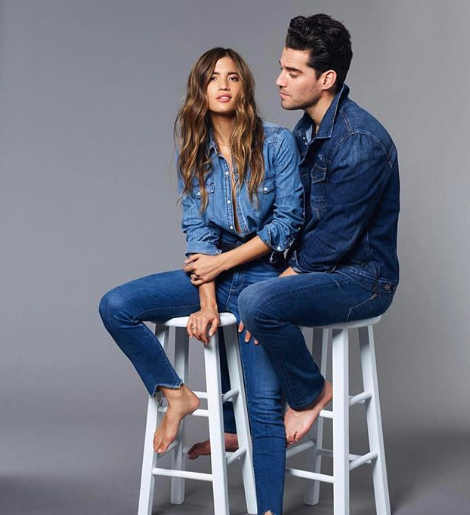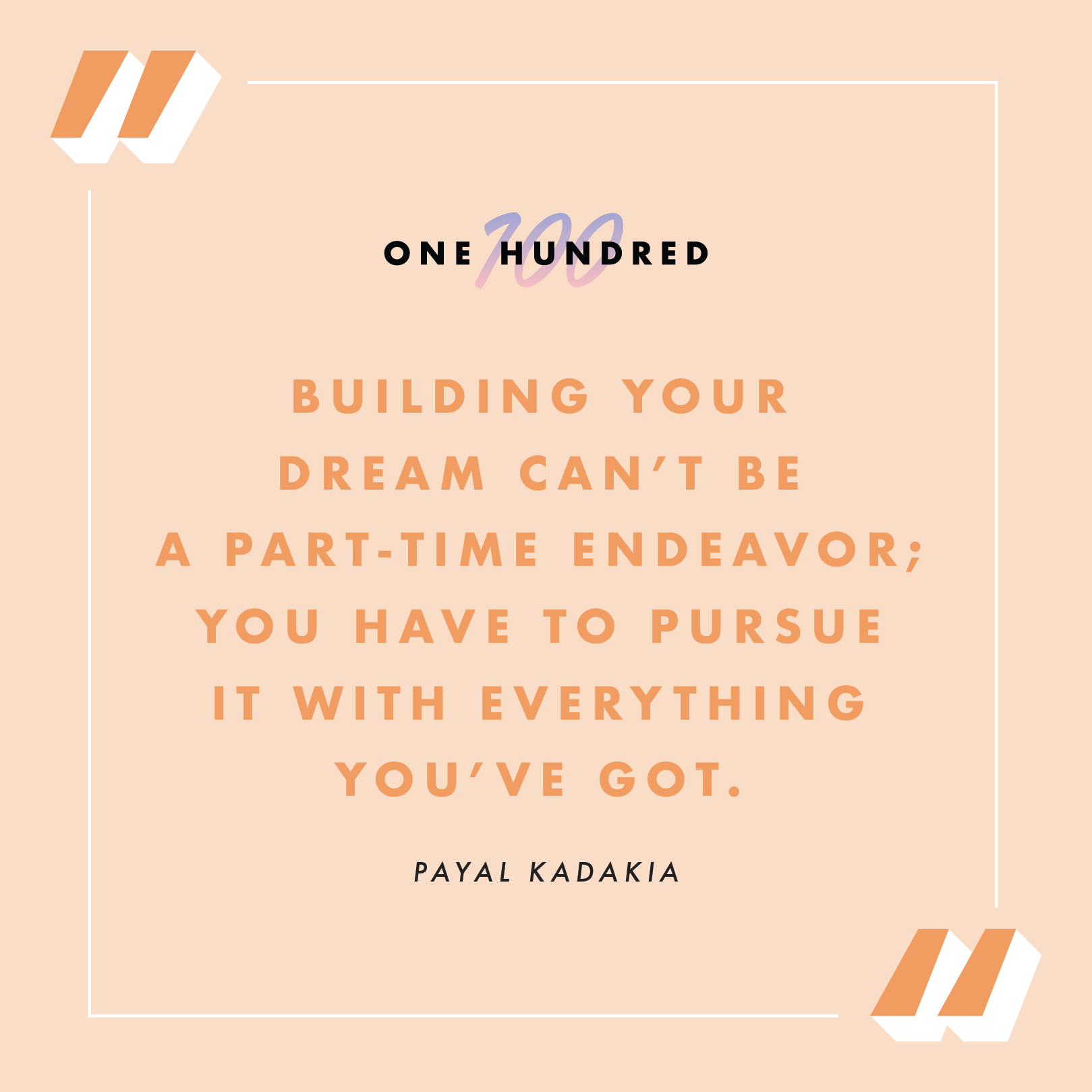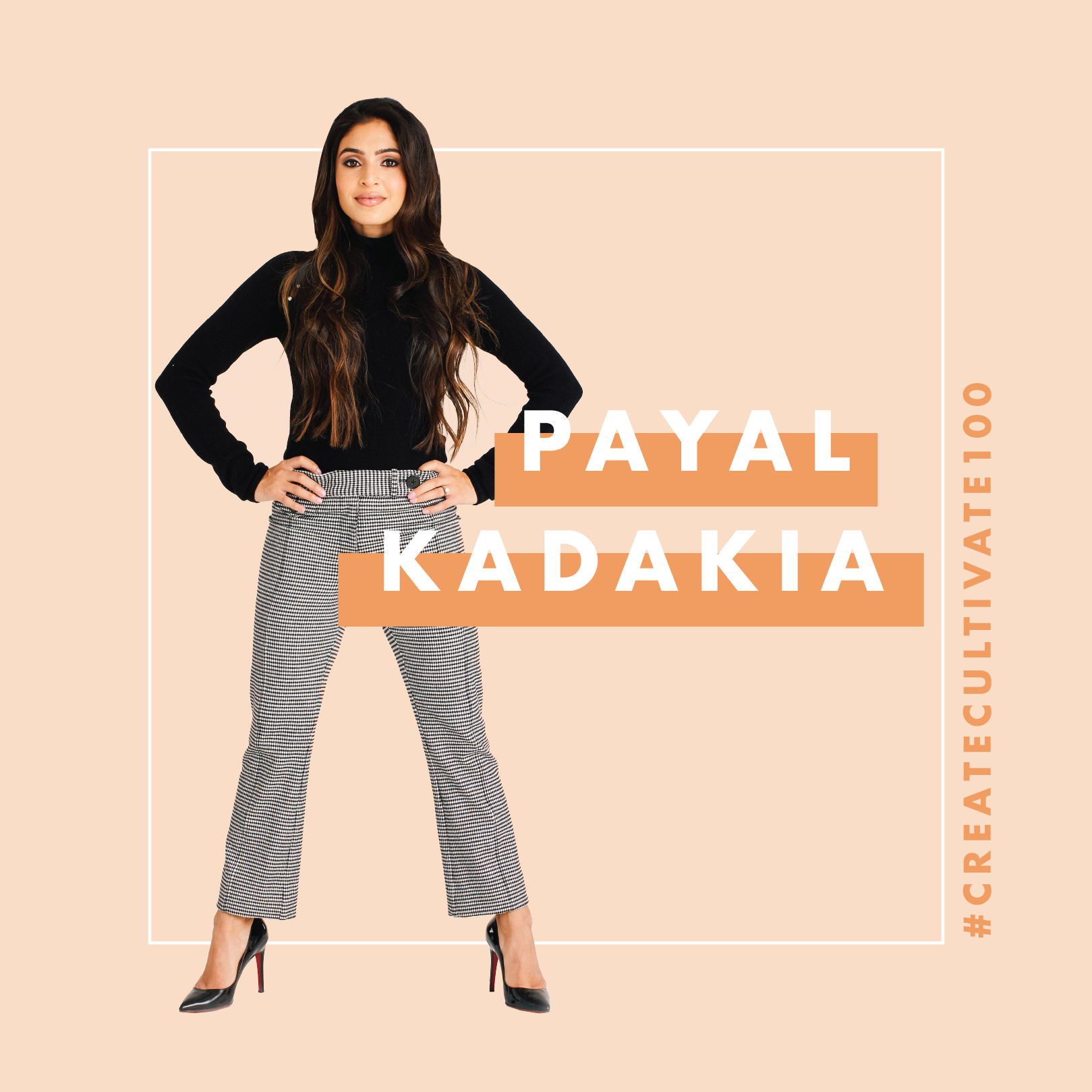In Her Shoes: Take A Page From This Blogger's Handbook on Motherhood
“I love using my platform as a community, and sharing a common motherhood struggle that I am going through at the moment.”
Lee Anne Benjamin is the cool working mom many of us dream of being. The Austin-based blogger shares her takes on affordable fashion, home design, and #momlife on her site Life By Lee, and while her feed is totally picture perfect, we’re obsessed with how relatable she is on the internet. We partnered with Jessica Simpson to share a behind-the-scenes look at Lee Anne’s life—check out her interview below!
What do you wear when you want to feel most confident (shoes included)?
I’m a big fan of the relaxed-chic look. If I’m going out to an event or a date night I like to wear a pair of distressed girlfriend jeans, a cami or tee, a blazer or moto jacket, and a pair of comfortable, yet chic wedges, booties, or heeled sandals. I’m also a big hat girl so I’ll add a fedra or straw hat if it’s during the summer months. If I’m heading out for a “mommin-around” kind of day I will wear a great pair of leggings, a comfy tunic tee, and a denim jacket. Depending on my hair day I’ll add a baseball cap. I would probably wear sandals or a comfy & chic pair of sneakers.
If you could walk in someone else’s shoes for a day, who would it be?
Michelle Obama. She’s so inspirational, yet so down to earth. I recently read her book, and I was so inspired at how “real” she was & how she shared such normal experiences about her life that we all go through. She is such an amazing role model for so many women. Plus her and Barack are ultimate couple goals in my opinion :)
Describe your style in 3 words.
Comfortable. Chic. Effortless.
On your blog, you openly share the ins and outs of being a working mom. What’s been the most rewarding part of sharing both the celebrations and challenges of parenthood?
The connection to other women, and the power to connect other women. I love using my platform as a community, and sharing a common motherhood struggle that I am going through at the moment. In sharing my struggles, there are so many people who can benefit from it. Not only do I get to connect with other women, but my followers get to connect with other women. A lot of women who follow me have things in common that they don’t even know about, and being able to connect them has been really rewarding.
Want Lee Anne’s look? Shop her style from Jessica Simpson below, and get $10 off any purchase of $50 or more with code create10! One use per customer.
MORE ON THE BLOG
In Her Shoes: How This Style Influencer Rebranded Her Blog
Interests change—so why can’t your career?
Ashley Torres isn’t one to shy away from a challenge. While working as an accountant several years ago, Ashley launched a fashion blog, Pursuit of Shoes (now Everyday Pursuits)—and scored a ticket out of finance and into the fashion industry because of it! Today, she works on her Everyday Pursuits full-time and is proof that if you dream it, you really can do it. We partnered with Jessica Simpson to ask Ashley about her style, blog rebrand, and secret to success—check out her interview below!
What do you wear when you want to feel most confident (shoes included)?
Although I’m in flats and jeans most of the time, I do love to get glam. There’s nothing like dressing up for a black tie wedding and looking in the mirror thinking “I clean up nice!” A well fitted dress and a great pair of heels always makes me feel 100!
If you could walk in someone else’s shoes for a day, who would it be?
Michelle Obama - girlfriend is GOALS. She is so driven and confident, not to mention funny. After reading her book BECOMING I developed a total girl crush on her. I’d love to see a day in her life post presidency.
Describe your style in 3 words.
Boho, Beachy, Glam
You rebranded your old site, Pursuit of Shoes, to Everyday Pursuits. What was the impetus for the rebrand, and what is the mission of your new site?
What started as a ridiculous obsession with shoes continued to evolve into fashion, beauty, travel, entrepreneurship, and relationships… i.e.: pursuing ALL.THE. THINGS. The older I got the more I wanted to have REAL daily discussions with EDP followers. Enter: Everyday Pursuits.
Love Ashley’s look? Shop her style from Jessica Simpson below, and get $10 off any purchase of $50 or more with code create10! One use per customer.
Viva Smocked Short Sleeve Top (similar)
Flutter Sleeve Knit Top (similar)
Plunging Strappy One-Piece Swimsuit
Aprille Espadrille Flatform Sandals
MORE ON THE BLOG
Why These Two Women Risked It All to Break into the Food Industry
“We hope that by showcasing the importance of early childhood nutrition that we’ll not only elevate the dialogue on baby food today but will also push the entire industry to improve.”
The saying goes, “If you want something done right, do it yourself.” Angela Sutherland and Evelyn Rusli are the epitome of the proverb. As the co-founders of Yumi, the homemade delivery baby food company, they’re challenging the standards of the “Big Baby Food” industry.
It was so important to Angela and Evelyn to fix the static baby food industry that they each left successful careers in other fields to start Yumi. Read on for their story.
Let’s start at the beginning. What whitespace did you see in the baby food market?
Angela: When I was pregnant with my first child, I did what a lot of new parents do — I went down the long, long rabbit hole of Google research. In that process, I came across studies on “The First 1000 Days,” a period of time identified by researchers and doctors as the most important in a person’s life for nutrition. I grew up in Michigan and was largely raised on the idea that adults are the ones who have to worry about their diet — that adults shouldn’t have the cupcakes because of their diet, but kids can eat anything they want because they have their whole life to worry about nutrition. It turns out the exact opposite is true.
Later, when my daughter was ready to begin solid foods, I was completely shocked to realize just how deficient all of the store bought options were. The big baby food industry is dominated by products that are older than the babies eating them, high in fruit-based sugars, and low in nutrition! I was in disbelief that over the last 100 years, baby food has changed very little and was not giving kids what they need. I felt compelled to do something about it.
Describe the journey from when you first had the idea for Yumi to actually making it a reality.
Angela: As I was uncovering all this research, I was sharing it with my friends, including Evelyn who I’ve known for years. She was working for the Wall Street Journal at the time. As a journalist, she naturally started digging-in and read all the clinical studies I had collected. We went on a trip with my family to Arizona, and while our husbands were ATV-ing, we kept circling on this idea of building a new baby food company to solve all these gaps. Within a few weeks, we both gave our two weeks notice and decided “OK, we’re doing this.” At the time, I was the breadwinner in the family, so I spoke with my husband about it and explained that I would need to take a roughly 100% pay cut but it was for a really, really good cause. He was my biggest cheerleader from day one.
How did you each find the confidence to give up your previous ventures and pursue a new career?
Evelyn: It’s not easy to walk away from a career you’ve been building and nurturing for more than a decade. There are internal and external pressures to stay on that path. When I was 18 and decided to be a journalist, I had a PLAN, and that plan was going perfectly. But accomplishing a plan you hatched at 18 doesn’t necessarily equal fulfillment. I felt myself increasingly drawn to entrepreneurship; I was enamored by its almost obsessive nature. Everyday, you apply your blood, sweat, and literal tears in the hope that you can change the world in a very particular way. I loved the mission of Yumi from day one.
Angela: Our backgrounds are sort of the perfect complement. I was the math major, she was the English major — she is the words to my numbers. Meanwhile, in my former life as a director of a private equity firm, I was very familiar with the nuts and bolts of operations and what it takes to build thriving, sustainable businesses. I enjoy nerding out on unit economics. Evelyn, meanwhile, is a natural storyteller. She pulls threads together and helps distill complex concepts into more digestible forms. We both saw Yumi as more than a product off the shelf. To succeed, Yumi would have to be a highly scalable business, but it would also have to be a movement, a movement that inspires other families to demand changes in Big Baby Food.
What’s a typical day in your lives like?
Evelyn: One of the amazing things about being an entrepreneur is just how fundamentally — often unpredictably — different each day is from the next. On one day, we could be in the test kitchens working with chefs and nutritionists to develop new recipes. On another day, we could be on the road meeting with potential partners, which includes everything from marketing to packaging to prospective investors. We try to create some boundaries within the chaos, and we both intentionally set aside time to think about big picture strategy and what’s coming around the corner.
One of the hardest things about building a startup is the constant context switching. It can be mentally and physically taxing. But let’s be real — it’s also a lot of fun.
What is it like working together when you both have very different backgrounds/experiences?
Evelyn: We simply can’t stand each other, it’s really becoming a challenge. Obviously, I kid, she was literally the officiant at my wedding. I’m the godmother to her son. Her family is my family and vice versa. That said, we’re very different in terms of skills and how we approach problems, which certainly leads to arguments about decisions. However, that’s exactly why we wanted to be partners. You need someone who is going to challenge your ideas and push you to see a problem from a different angle. That friction is healthy for a startup.
Angela: For all our differences, I do think our partnership works because we are similar in the areas that matter. Our fundamental values are the same, which is why we’re so passionate about Yumi’s mission. We’re also crazy hard workers, perhaps to a fault. I’ve never doubted for a second that Evelyn isn’t doing everything she can to make this a success. We completely trust each other’s judgment.
Baby food is a contentious industry. How did you choose ingredients and suppliers? What about pricing?
Angela: For us, quality is everything. It is our #1 priority to give babies the highest quality ingredients, sourced from the best organic farms in the country. When you look at consumer trends and the preferences of the modern day parent, it’s clear that this generation has a very different attitude towards food than previous generations. Today’s parents have a much deeper understanding of food, and how it affects their health and wellness. They care about organic, they expect freshness, and they also look for brand transparency.
The legacy brands are out of touch. Last year, Consumer Reports revealed that grocery store baby food brands tested positive for an array of heavy metals. That same week, we put up a map online to show our customers how we pick our farms based on the government’s soil readings. We avoid areas that test high for heavy metals, and we avoid certain ingredients like brown rice, which often tests high for arsenic.
Our pricing reflects the multitude of differentiators that we offer to consumers: high quality ingredients, customized content, shipping straight to your doorstep, and sustainable packaging. As we scale, we will be able to pass along savings to our families, but our consistent growth month-over-month indicates that we’re already filling a huge demand in the market.
Looking back, what’s one thing you would have done differently when you first started out?
Evelyn: We’ve both grown so much from this process, but I think one thing we would have done differently in the beginning would be our approach to hiring. We would have hired more people out of the gate. We would have put more effort into recruiting. At the end of the day, success or failure is determined by the people you have on that bus.
Where do you see the baby food industry going in the future? How do you see it evolving?
Angela: Hopefully, out of the dark ages. If the baby food industry is still dominated by two-year-old room temperature chicken stew in a jar, I’ll be shocked.
We’re trying to shed an intense light on the Big Baby Food industry. There’s simply no excuse for the low level of innovation, freshness or quality. Most baby foods, including some newcomers, are still laden with fruit-based sugars and are incredibly low in nutrition. We hope that by showcasing the importance of early childhood nutrition that we’ll not only elevate the dialogue on baby food today but will also push the entire industry to improve. Babies deserve it.
What’s the best piece of advice you’ve ever been given?
Evelyn: Someone once told me that “all businesses are inherently people-based.” In the same way that we apply the saying “It takes a village” when it comes to motherhood, I have seen that the same goes for businesses — they are nourished by people and our extended networks. Since starting Yumi, I’ve lost track of the number of times a friend has helped me work through a problem, provided valuable insights, or served as a resource in some way. So many people have helped in the making of Yumi. These interactions are a constant reminder to stay humble and to not be afraid to ask for help.
What’s next for Yumi?
Angela: We’re so excited to launch a new line of snacks and finger foods this spring. It has always been our mission to grow with our customer and to provide offerings for kids as they transition from babies to toddlers. In America, the number one veggie for a toddler is the french fry. That’s absurd. Families deserve healthier options across the 1,000 days. Whether it’s purees, snacks, finger foods, or beyond, we have a lot of work to do.
MORE ON THE BLOG
In Her Shoes: This Fashion Blogger Shares Why You Should Treat Your Side Hustle Like a Full-Time Job
“The only way a creative idea becomes a full-fledged reality is when you dedicate enough time to it to help it grow.”
Coco Bassey’s life has been anything but typical. The Nigerian-born New York- and Atlanta-based content creator spends her days in the corporate marketing world and her nights and weekends hustling away on her fashion blog, Millennielle. As a cancer survivor who grew up in Canada, Czech Republic, Nigeria, Germany, and the USA, she’s got a world view most millennials don’t, and it shows. We partnered with Jessica Simpson to chat with Coco on her personal style and professional pursuits—check out the Q&A below!
What do you wear when you want to feel most confident (shoes included)?
Even though I love a dressed-up moment every now and then, my everyday personal style is all about comfort and elevated basics! To me, nothing beats a pair of flattering jeans and a crisp white button-up shirt, especially when worn well. I gravitate towards comfort when it comes to footwear too, my shoe collection is full of statement sneakers, flatforms and block heels!
“The only way a creative idea becomes a full-fledged reality is when you dedicate enough time to it to help it grow.”
If you could walk in someone else’s shoes for a day, who would it be?
It would easily, hands-down, be Rihanna’s.
Describe your style in 3 words.
Elevated, feminine and effortless.
You balance a job in corporate marketing with your work on Millennielle. What advice would you give to women who want to pursue a creative idea while working full-time?
Treat your creative endeavor as professionally as you do your full-time job — that means monthly planning, reporting, pitching new business… and delegating tasks that you simply cannot take on yourself. It can be really easy to get home from a full day of work and want to turn off your brain for the day, but the only way a creative idea becomes a full-fledged reality is when you dedicate enough time to it to help it grow!
Love Coco’s style? Shop her look from Jessica Simpson below, and get $10 off any purchase of $50 or more with code create10! One use per customer.
Moya Lace Trim Knit Top (similar)
MORE ON THE BLOG
Desk-Side: This Actor & Blogger Shares How She Finds Balance When Working From Home
“The best part about being a blogger is getting to connect with women from all over the world.”
Courtney Halverson is a busy woman. An actor by day and an influencer—well, also by day, she spends her waking hours running lines, shooting content, and blogging about all of it on her site, Pretty Little Fawn. So when she gets time to relax, she really takes advantage. We partnered with Glade® Essentials Room Mist to hear how Courtney puts a little balance in her hustle—read on below!
Q: How long have you been in Los Angeles?
A: I’ve lived in LA for about six years.
Q: What’s something most people don’t know about you?
A: Fun fact about myself, I can turn the shower on with my feet.
Q: How long have you been acting? What do you love most about it?
A: I have been working as an actress since I was a kid. I actually just had a film come out set in the 1950s, which is great because I love all things vintage. But the best part about being an actress, is getting to become a lot of different people. I mean, I have worn a lot of different hats.
Q: What are your essential tools when prepping for a role?
A: A cup of coffee (needed), a highlighter, and whatever script I’m currently working on.
Q: What’s your favorite room in your house?
A: My favorite part of the house is definitely the cloffice (closet-office). It’s definitely my happy place in the house because it’s where I get to work on my other job of being a blogger. It’s where I style looks, create content, and do what I call “research,” a.k.a. reading magazines.
Q: Since you work from home a lot of the time, how do you instill work/life balance in your space?
A: After a long day of learning lines and writing blog posts, I like to relax in my living room. For me, it’s all about unwinding and setting the mood. The Glade® Essentials Room Mist is my go-to—I love the Mandarin & Mimosa scent. It helps clear my mind and let me know work is done for the day.
“The best part about being a blogger is getting to connect with women from all over the world. ”
Q: Who is your style icon?
A: 100 percent Alexa Chung.
Q: What’s the best part about being a blogger?
A: The best part about being a blogger is getting to connect with women from all over the world. Second best part? Creating content.
See Courtney’s full interview below:
MORE ON THE BLOG
Desk-Side: This Successful Style Influencer Shares What It Takes to Build a Full-Time Blogging Career
“Sometimes I wish that I had a superpower where I snap my fingers and everything is organized.”
If you’re looking for a new style muse, look no further than Sheryl Luke. As the voice behind Walk in Wonderland, she’s made her blog her full-time venture—something many of us only dream of doing. That’s why we partnered with Glade® Essentials Room Mist to hear Sheryl’s advice on what it takes to become a blogger and influencer full-time. See her sage wisdom below!
Q: How long has LA been your home?
A: I’ve lived in Los Angeles for about 13 years. I live with my husband and my puppy.
Q: How long have you been a blogger? What’s your favorite thing about being a blogger?
A: I’ve been blogging for about five years now. The most rewarding part about being a full-time blogger is that I get to make my own work schedule.
Q: How do you start your day?
A: To start my day I love a fresh cup of coffee, and I love a clean scent.
Q: What tips do you have for someone looking to be a blogger?
A: For anyone starting in the industry, my tip would be to have a good, strong work ethic. I think that’s gotten me to where I am.
Q: What is the most challenging aspect of being an influencer?
A: Because I live and work in the same space, I have to find new ways of staying productive, so my productivity hack is actually getting ready. It keeps me in my work mode all day long. I’m super blessed to be doing what I’m doing, but if there’s one thing that I find challenging is constantly staying creative. But the fun part is I get to dress up every day and work with a ton of amazing friends from fashion to beauty and lifestyle. My typical work day is answering my emails, scouting locations, prepping looks. But if there’s one thing I wish I had more time for is actually shooting.
Q: How do you create an inspiring workspace even when you’re working from home?
A: Through scent. I use Glade Essentials Room Mist Mandarin & Mimosa and the bright scent keeps me going all day long. I wish you could smell it; it reminds me of Capri Blue’s Volcano candle!
Q: How do you finish your day?
A: After a long day, I love to unwind. So I shut my computer down, set aside my phone, spend time with my husband, and take my puppy for a walk. One other thing I’ve also been enjoying is also cooking. I’ve been cooking a lot of Indian food lately.
“For anyone starting in the industry, my tip would be to have a good, strong work ethic. I think that’s gotten me to where I am.”
Q: What’s your favorite fashion piece you own?
A: The one thing I cherish most is my mom’s vintage earrings. They’re from the ’80s, and they stay really close to my heart.
Q: What’s one question you always get asked?
A: People always ask, “Why Walk In Wonderland?” I’ve always wanted a huge, walk-in closet where I walk in and feel like I’m in Wonderland.
Q: Do you have any habits you wish you could break?
A: I hit snooze a lot. I snooze between 30 minutes sometimes to even an hour. And I’m a bit of a mess. Sometimes I wish that I had a superpower where I snap my fingers and everything is organized.
Q: If you weren’t blogging, what would you do?
A: If I wasn’t blogging, I’d probably have a clothing store.
See Sheryl’s full interview below:
MORE ON THE BLOG
Desk-Side: This Fashion Blogger Shares The Best Part of Being Her Own Boss
The opportunity to create, to write, to dream—it just never stops.
Jessi Afshin is no stranger to success. With 300k Instagram followers, Jessi spends her days working on her fashion blog, The Darling Detail, and her new clothing line, Shop Darling, which supports victims of trafficking. We partnered with Glade Essentials Room Mist to find out what inspires Jessi and makes her feel most at home. Read on to get to know Jessi!
Q: How long have you been in Austin?
A: So I’ve lived in Austin since 1999, that’s almost 20 years. I actually went to the University of Texas, that’s where I studied fashion and business. Hook ‘em!
Q: What do you love most about fashion?
A: My favorite part of fashion is just all the positive emotions it evokes, like self-confidence and encouragement. So many good feelings just through comfort.
Q: We heard you just launched a clothing line, congrats! Can you tell us about it?
A: I just launched a clothing line, and I’m so excited about it because this has been a dream of mine since I was a little girl. They’re soft, cozy sweatshirts and they have joyful messages on them. Every single one of our products is actually shipped and fulfilled by survivors of trafficking in Austin. So we’re actually employing women who are recovering from trafficking.
Q: Where do you draw your inspiration from?
A: I get almost all my inspiration from dreams. I have like 10 dreams a night. I wake up and I write them down, and I instantly have so many new ideas. I also LOVE to Pinterest, and mood board, and collage.
Q: What do you love most about your office space?
A: I like to keep this space feeling so fresh and inspiring. We’ve been using Glade Essentials Room Mist Mandarin & Mimosa and it seriously smells like an Anthropologie store in here!
Q: What’s the best part about being your own boss?
A: I love my job. The opportunity to create, to write, to dream—it just never stops. One of my favorite parts about working for myself is the flexibility and the hours. It’s amazing. So much of what I do happens right at my desk. But most of all, my very favorite part about what I do is writing my faith-based account, it’s called My Darling Diary and it’s where my heart is.
See Jessi’s full interview here:
MORE ON THE BLOG
How This CEO Is Saving the Planet, One Vintage Dress at a Time
“Our society needs your leadership, our community needs your representation, our economy needs your businesses.”
Shilla Kim-Parker wants you to save money—and the planet. That’s why she started Thrilling, an online marketplace for vintage and secondhand clothing stores. Shilla saw a disconnect between her favorite shops and the shopping method that best fits her lifestyle, so she filled the void herself.
Here, Shilla shares how she made her dream a reality, how Thrilling is working to better the planet, and the advice she has for other women of color in business.
How did you come up with the idea of Thrilling, and how did you transform that idea into a reality?
The goal of Thrilling is to make secondhand shopping more popular, modern, accessible, and most importantly - more of a habit for more people.
Secondhand shopping has always been near and dear to my heart. Not only is it a treasure hunt, but growing up in a household with limited means, it was a great way to find unique and fantastic clothes at a great value. It’s also one of the best ways to reduce your environmental impact and support local business owners. Win-win-win.
As I’ve gotten older - I’m now a working mom, with a toddler at home and a baby due in just a couple weeks - I no longer have the time to shop in this way.
Secondhand shopping is about the journey, it’s a fun afternoon or weekend activity - but I found that I no longer could dedicate the time to sift through racks. I yearned for a way to shop these stores from the palm of my hand, in the few spare moments I have between meetings or on the couch post kids’ bedtime. And that’s how the idea of Thrilling was born.
Tell us a bit about how your business model works. How does Thrilling support small businesses?
There are more secondhand stores in the US than there are Starbucks and McDonalds, combined. These stores are mostly run by women, who are typically the sole breadwinner for their families. All together they do about $15 billion in sales, but 95% of these sales are completely offline.
The thing that makes secondhand shopping so much fun - the fact that every item is unique - makes it extremely difficult for e-commerce. The amount of work involved is huge, which is why most of the current e-commerce platforms don’t work for these store owners. And yet, these store owners feel enormous pressure to go online, as relying on local foot traffic for business no longer pays the bills.
That’s where Thrilling comes in. We do all the tech and logistics for these store owners and put whatever items they want online. We create a custom page for them on our site, which they use that page as their website. Now they can finally sell to customers across the country or around the world.
What are the environmental implications of your company?
It can take up to 1,000 gallons of water to make a single item of clothing. New apparel production is a leading contributor to pollution, and Americans wear clothes on average 7 times before throwing them in the trash. Worse, clothes are not easily biodegradable.
Buying an item of clothing secondhand reduces its waste impact by nearly 75 percent. In this day and age, when the environmental issues facing our planet is an urgent crisis, shopping secondhand is a fantastic way to do our part.
“I am black, I am the daughter of a Korean immigrant, I am a mom, I am pregnant, I am mid-career. Needless to say, Silicon Valley did not know what to make of me!”
What advice do you have for other women of color looking to start businesses of their own?
I am black, I am the daughter of a Korean immigrant, I am a mom, I am pregnant, I am (was) mid-career. Needless to say, Silicon Valley did not know what to make of me!
For my fellow women of color - Perseverance! Many people will tell you “no" or “you can’t.” The standards you’ll have to meet will be higher. There are institutional barriers in place that will prevent you from getting funding as easily as others.
But keep fighting. We need you. Our society needs your leadership, our community needs your representation, our economy needs your businesses.
The real problem is that people from underrepresented backgrounds face greater risk in starting a business - usually we don’t have the same family resources, the same networks, the same access to capital others do.
So my real advice is for those in positions of power - be a part of the solution, be an agent of change. And especially help women of color in the very earliest phase of their company/idea building process.
What are you most proud of within your work at Thrilling?
Giving back is built into our ethos. And we are proud to incorporate community service and outreach whenever and wherever we can.
As an example, we are delighted to be partnering with Goodwill Southern California on “best of Goodwill” collections that will be sold exclusively on our site. The first collection goes on sale March 15th, and it is curated by Ali Mandelkorn, Janelle Monae’s genius stylist. The majority of the proceeds go towards Goodwill SoCal’s incredible workforce development programs, in particular job training and assistance for the homeless.
What’s next for Thrilling?
We have been (happily!) overwhelmed by the response and demand from local vintage and secondhand store owners, from across the states and even as far away as Japan and Sweden. So we will continue to quickly ramp up the number of store partners we work with and the number of cities that we operate in.
We are also working on some fun and innovative partnerships with artists, celebrities, and designers - stay tuned for more on that front this spring!
MORE ON THE BLOG
How This Med School Student Is Helping End Childhood Hunger
“Trust your vision and don’t let fear deter you from making an impact.”
Shanay Thompson does it all: medical student, NBC contributor, former model. But she didn’t stop there. In 2017, upon realizing the prevalence of food insecurity among at-risk youth she mentored, Shanay founded Every Kid Fed, a nonprofit organization that focuses on ending childhood hunger.
Below, Shanay shares how she manages her time, what advice she has for women of color looking to start their own nonprofit, and what she wishes people knew about food insecurity.
You were a Wilhelmina model before you quit to pursue medicine. When did you realize you wanted to change careers, and how did you go about making that career shift?
When I started modeling, my intent was to do shoots here and there for fun while I was in school, until one day I started getting booked for shoots and shows that I didn’t want to pass up. Throughout college and graduate school, I would be on the plane or backstage in hair and makeup at New York Fashion Week, doing coursework, and when I got into medical school, I knew I had to make some serious adjustments. After having modeled for spectacular designers, fashion magazines, and doing pageants in between - as thrilling as it was, I wanted to do more in terms of impactful work. I knew I wanted to empower women on a larger platform and put my education to good use, so I met with my agent in 2015, and terminated my contract amicably. Modeling will always have a special place in my heart, as it was such a integral part of my life for years. I still keep in touch with friends in the modeling industry and attend shows, so I’d say it’s certainly a win-win!
How did you first come up with the idea for Every Kid Fed? How did you transform that idea into a reality?
I mentored at-risk teen girls in Berkeley, CA, where I held after-school workshops and field trips that focused on self-esteem, empowerment, and academics. I started noticing after a few years there was a substantial increase in my mentees asking to take some of the snacks I provided during our workshops home for them and their siblings, and if they could borrow money for lunch. That’s when I started asking questions. I asked counselors and teachers if they had encountered students asking them for food and they said all of the time. I even asked an elementary school cafeteria manager, and she said on multiple occasions her kindergarten students asked her for seconds and thirds during lunch because they don’t eat enough at home. Hearing that made me spring into action. Not only is the public school lunch system flawed, there’s the severe affordable housing crisis in the Bay Area, along with gentrification. Families, who have worked hard to build a comfortable life for their families in cities like Berkeley, Oakland, San Jose, etc. are now struggling financially and are at risk of being displaced or already have been. But there’s more:
Parents who struggle to make ends meet but still make slightly over the amount required to qualify for free/reduced lunch program have children who are food insecure. Those children often resort to stealing food.
Students who do qualify for the free/reduced lunch program, often get bullied, and are labeled as poor in front of their peers, so they skip eating altogether.
Students who utilize the free/reduced school lunch program still go hungry, as the meals aren’t enough to sustain them throughout the day.
With that information, I created Every Kid Fed. Each food pantry location is on campus in a discreet location for students in need. The school pantries complement the free school breakfast and lunch programs by providing access to food for all food insecure children during and after the school day has ended, on the weekends and during holiday and summer breaks. The pantries are stocked with non-perishable food and vegan/vegetarian-friendly options. I started off by using some of my funds to stock the pantries, and now we have secured partnerships with local businesses and companies to keep the pantries stocked. We now have fed over 9,000 students in need, since launching in July 2017.
““Trust your vision and don’t let fear deter you from making an impact.””
You’re in your last semester of medical school, and you were recently made a medical contributor at NBC. How do you manage your time with all of your different responsibilities?
It is truly such an exciting time for me, and life is certainly busy! I feel like I do a great job with keeping a great work/life balance and the key is organization and simplicity. Each week I make a small list of my goals in my agenda, and I keep a set schedule in the Awesome Note app of everything from my clinic schedule, business travel, meetings, events, yoga and pampering time, and more. I highly recommend that app.
What does a typical day look like for you?
6am: Yoga or pilates and while getting ready, I’ll have Project Juice delivered for breakfast and check the stock market since I have shares in few companies. I then check my schedule for the day, emails, and check in with my executive assistant Elaine regarding Every Kid Fed, then head to the hospital.
8:30am-Noon: Morning Clinic
Noon to 1:30: Lunch - I spend that time studying, replying to emails, sometimes squeeze a meeting in, or do the online food shopping for my pantry locations.
1:30-5:00: Afternoon Clinic
6:30ish: Cooking a vegetarian dinner while listening to podcasts, or going out to dinner with my love.
9pm: Catching up on health news and working on my next assignment for NBC.
10:30-11pm Bedtime!
What do you wish more people knew about child food insecurity?
The facts. Whenever I explain Every Kid Fed, I always give statistics. Currently, 1 in 4 children in California are food insecure, and 7.9 million Californians are living in poverty. Second, is the devastating ramifications that go beyond a growling stomach - hunger impedes on the ability to learn and achieve optimal physical and mental health. Low-income children are the most vulnerable especially in schools. Many of them suffer in silence, so it’s our duty to be an advocate and to make sure no child ever has to worry about where their next meal will come from, and to give parents who are struggling to feed their family a helping hand.
What advice do you have for women of color looking to start their own nonprofit?
Don’t be afraid to ask for help. As black women, we have been conditioned to jump higher, run faster, be stronger, independent and yes, we are strong, independent warriors full of black girl magic - but it is absolutely OK to ask for help. You can be great, but behind every successful person or business, there is help. I had trouble with this in the beginning, but when you decide to start a nonprofit or anything for that matter, it is 100% a collaborative effort.
How do you go about creating change in a community?
Know what you want to accomplish and be passionate about what you do. Creating change doesn’t happen overnight, so you have to be prepared for the long haul. Your conviction to the end goal is what allows it to come into being.
What’s the best piece of advice you’ve ever been given?
Trust your vision and don’t let fear deter you from making an impact.
What and/or who inspires you?
Meeting new people inspires me everyday. As a student doctor, medical journalist, and social entrepreneur, I’m constantly meeting new people and listening to their stories. It truly keeps me motivated to do everything I can to cultivate positive change and inspire the next generation.
What’s the next step for you and Every Kid Fed?
We have now transitioned into serving high poverty elementary schools exclusively, and are continuing our work to end childhood hunger by partnering with city councilmembers and the CA Department of Education to implement universal school lunch in all California schools. This will erase the stigma, peer shaming, and increase free school lunch participation. We are also launching our $10 or less meal recipe division on our website in April for parents. As for myself, I’m preparing for the launch of my new book, She Can, releasing on June 18th, graduating from medical school, starting residency, working on more exciting projects and gearing up for a much-needed vacation to Italy! If you’d like to help Every Kid Fed in any capacity, please visit everykidfed.org.
MORE ON THE BLOG
Muslim at Work: Two Women Share Their Stories
“Women of all faiths and no faith should see each other as partners.”
It’s #MuslimWomensDay, a day for celebrating Muslim women around the world and giving them the spotlight to share their stories. Since 2000, there has been a 50% increase of Muslim women in the workforce across the globe. But 61% of US-born Muslims say they have experienced discrimination at least once in their lifetime, and 68% of Muslim women believe the way the Media depicts Muslims is “unfair.”
Below, we spoke with Eman Idil Bare and Dalia Mogahed about their experiences being Muslim women in America, microaggressions in the workplace, and what non-Muslims can do to be better allies to the Muslim community.
Eman Idil Bare
Journalist, Fashion Designer, Law Student
What do you do for a living? Tell us about your career journey.
Haha, this question always stresses me out! I do a lot. I am a journalist first and foremost. I primarily work on longform investigative stories, but I also write a lot of fashion features for some semblance of balance.
Then I am a fashion designer. And most recently, a law student. To some people, my career journey might seem a bit...scattered. But there is a reason and a purpose, I promise! The nucleus of everything I do is social change. I went to journalism school because I did not like the way people who looked like me had their stories told. But working as a journalist showed me that the problem was much bigger than how a reporter told a story. And it seemed like the only way I could really grow my career was by selling myself as a “hijabi” reporter. Frustrated, I decided to take a break from journalism...and go to fashion school. I needed time to think my next few steps, and school was my comfort zone. And it was the best decision I ever made.
I was able to reground myself and figure out my purpose. That led me to launching my fashion line, and those experiences led me to law school. The most important lesson I have learned in my life is that nothing has to be linear.
You hired all black models for your runway debut at NYFW—and the show was amazing! Tell us about that experience.
I wanted to build my own table. I am at a point in my life where I am able to create the things that I once advocated for. I am tired of asking for inclusion from the fashion industry, or from any industry. I think that any brand that does not have employees that reflect the markets they cater to are making that decision intentionally. I did not see women who looked like me on runways as a child, so I decided to make my own brand because I deserve to be represented.
The experience was life changing. I loved seeing how happy my models were to notice that they had men and women doing their hair who actually knew how to care for black hair. It was the first time most of them walked in a show and did not feel like an afterthought. In 2019, models needing to bring their own makeup to shoots isn’t “unfortunate,” it’s racist. And we need to address it as such.
What are some of the microaggressions you’ve personally faced as a Muslim woman in the workplace?
This is an email that the communications director of a school board in Ontario sent me:
I think what a lot of people fail to understand is that my entire existence, as a black Muslim woman, threatens a lot of people’s sense of privilege. People really think that Muslim women are oppressed, or black women are inferior. Because of the nature of my work, a lot of the people I interview are men in positions of power. They aren’t use to someone who looks like me holding them accountable. And a lot of the times, they snap. This is email. And they expect me to back down. But Somali women aren’t known to be passive, and I am loyal to my roots.
Also - shout out to Terry. If you’re reading this: No, you can’t “speak to my manager.”
Do you think things are getting better or worse for Muslim women in the workplace, and what factors contribute to this?
I think we need to remember that there are different kinds of Muslim women. A lot of Muslim women are white passing. And a lot of Muslim women don’t wear hijab. So, for some Muslim women, I think their privilege allows them to benefit from their proximity to whiteness.
Black Muslim women will always carry the weight of being Muslim and Black. And yes, I think it is getting much harder for us. And I think it is the responsibility of non-black Muslim women to ensure that it gets better for all of us. Which sometimes just means reminding the world that there are Muslims who have to deal with Islamophobia, and anti-blackness.
The contributing factor? A racist President and the white supremacy that fuels him.
What can non-Muslim women do better to support their colleagues in the workplace?
Honestly, acknowledging that we are not a homogenous group. And that even though we are Muslim women, we still have individual personalities. I think that gets lost a lot. That we are our own person. “What do Muslim women need” is as difficult to answer as “what do white women need.” The most important thing anyone can do is acknowledge that.
What advice would you give to another Muslim woman who might be facing adversity in her workplace?
I think sometimes as Muslim women, or as marginalized women, we can be too forgiving. It takes zero effort to be a good person, or to treat another human being like a person. Do not blame yourself, and do not think you need to change who you are to accommodate a workplace that does not value you.
Dalia Mogahed
Director of Research
What do you do for a living? Tell us about your career journey.
I help build bridges and strong communities with research. The formal job title is “Director of Research” at The Institute for Social Policy and Understanding. I am here after my time at Gallup heading Muslim studies there. Before that I was pursuing my MBA at the University of Pittsburgh. I am grateful to be paid to do what I love.
Your TED Talk, What It’s Like To Be Muslim In America, was one of the most-watched talk of the year. Why do you think it resonated so well with its audience?
I’m really taken aback by the success of the talk and so grateful that folks find it resonates. I had hoped to reach people’s hearts with my story and weave the power of the facts about Muslim Americans into that personal narrative. I think our current political moment has a lot of people searching for that human story, and for facts to replace the fear we are fed in so much of our political discourse. I’m so grateful for the opportunity to share my story and research.
You lead research and thought leadership programs for ISPU. What are some of the most interesting or surprising findings you’ve come across in your work?
How much time do you have? Our discoveries are constantly surprising me, even though I’ve been at this for nearly two decades. We discovered for example that American Muslims are the most likely faith community to condemn violence targeting civilians, contradicting Islamophobic tropes about the community. We also found that mosques are a source of moderation, where frequent attendance is linked to greater civic engagement and service to society. We found that Muslim women surpass their male counterparts in education, and what truly oppresses them is not their faith or hijab, but Islamophobia and racism. We also found that Islamophobia is bad for everyone who cares about freedom and safety in America. The more the public is led to endorse Islamophobic tropes, the more they also support violence targeting civilians, authoritative policies and discrimination against Muslims. We also discovered that though white supremacist are responsible for the majority of American casualties at the hands of ideologically motivated violence, Muslim alleged perpetrators receive 770% more media coverage for foiled plots compared to white nationalists.
“Hijab is an issue of religious freedom and freedom of expression and the liberal position should be to defend a woman’s right to choose or not choose it.”
What are some of the microaggressions you’ve personally faced as a Muslim woman in the workplace?
I have been blessed with mostly supportive and inclusive work environments in my career. Where microaggressions come in are more often from random people in the public, or online, where I’ve endured literal campaigns of hate targeting me. In the public, microaggressions often take the form of passive aggressive “pity” for me as a hijab-wearing Muslim woman. The assumption is that some man forced me to dress this way, or that I was brainwashed or socialized into “accepting second-class status” as one woman put it. To me, assuming covering is oppressive is itself extremely misogynistic. It unconsciously is built on the idea that a woman’s power stems from her physical allure versus her intellect, and therefore by covering her physical self she is “oppressed.” Yet, when men are fully covered no one says they are oppressed. I find that extremely problematic. I of course know that some women are forced to wear hijab, and that hijab is sometimes politicized, and this is absolutely wrong. But just because something is sometimes forced on women doesn’t make it inherently oppressive even when freely chosen.
Imagine applying this logic to sex. Women are sexually assaulted in staggering numbers all over the world. Human trafficking is a global industry of billions of dollars. Rape is a weapon of war. But this does not make sex inherently oppressive to women when freely chosen. Imagine a campaign to ban women from having sex in order to “liberate” them? It would sound absolutely ludicrous to most people and banning hijab to liberate Muslim women should sound equally ludicrous. According to ISPU research the vast majority of American women who are Muslim and wear hijab chose to do so. The majority say it is an act of religious devotion or an expression of identity. Hijab is an issue of religious freedom and freedom of expression and the liberal position should be to defend a woman’s right to choose or not choose it.
Do you think things are getting better or worse for Muslim women in the workplace, and what factors contribute to this?
As a cautious optimist, I think things are getting better. I say that because we now have a language for calling for equality. We have laws and precedents to respond to discrimination. We have growing public awareness of the reality of anti-Muslim discrimination, and this wasn’t the case even 10 years ago.
What can non-Muslim women do better to support their colleagues in the workplace?
Women of all faiths and no faith should see each other as partners. This means listening, getting to know each other as people, bragging about each other’s work, and amplifying each other’s ideas. It also means interrogating our unintended biases and asking sincere questions rather than assuming.
What advice would you give to another Muslim woman who might be facing adversity in her workplace?
I actually get this question on a very regular basis, sadly. My advice is never ever assume the whole world is against you. Look for allies, don’t isolate yourself or believe the hate is the majority, because we know it’s not from rigorous research. Most Americans want to live in a country where no one is targeted for their religious background. If the issue is a legal one, don’t be afraid to take legal means to address it if all other attempts at addressing it out of court have failed. The most important thing is to surround yourself with people who love you and who support you. Take care of yourself emotionally and spiritually. Don’t let hostile people penetrate your heart.
MORE ON THE BLOG
Money Matters: Katie Sturino, Founder of 12ish Style and Megababe
In today’s Money Matters feature, we sit down with Katie Sturino, founder of The 12ish Style, a plus-size fashion blog, and Megababe, a cult favorite anti-chafing stick. Below, Katie shares how she manages finances for two rapidly-growing brands—and what she wishes she’d known when she started it all.
Where do you think is the most important area for a business owner to focus their financial energy?
I think it is very important for business owners to invest their financial energy into making a high-quality, high-performance product. But the second place to place financial energy is PR. It doesn’t matter how much time or money you spend on a product if no one sees it.
What was your first big expense as a business owner?
Placing our first order for bottles for Megababe Thigh Rescue.
How did you decide what to pay yourself?
I don’t pay myself; everything we make goes back into the business.
What are your top three largest expenses every month?
Our top expenses per month are our PR department and our product. Currently, we only have hourly employees.
“I wish I would have stopped listening to other people sooner.”
How much are you saving? When did you start being able to save some of your income?
My income comes from my 12ish business—anything larger than a certain amount I put right into my savings account.
What apps or software are you using for finances? How did you decide when to hire a financial advisor (if you have one)?
We use Quickbooks for our finances.
Do you wish you’d done anything differently in your financial journey as a business owner?
I wish I would have stopped listening to other people sooner.
Why should women talk about money?
If we don’t talk about money, then financial conversations are always left up to someone else, usually a man in our life. Money is power and freedom. Sadly, I see so many women at the mercy of their partner financially, which means that a lot of the choices they make are not their own.
MORE ON THE BLOG
How These 5 Entrepreneurs Kick-Start Their Mornings
“Running has a way of clearing my head and setting me up for success for the rest of the day.”
Mornings: You either love ‘em or hate ‘em. While many of us might be squarely on the “snooze, repeat” end of the spectrum, others love doing their hardest work before the sun is up. Exactly how do the influencers we know and love make their own mornings better? We partnered with Chameleon Coffee, creators of our favorite cold brew, to find out.
Below, we’re chatting with Dani Austin, Jessi Afshin, Agatha Ashiofu, Paola Mathé, and Jen Pinkston on wake-up call times, coffee routines, and their favorite time of day to hustle hard.
Are you a night owl or a morning person? When do you do your most important work and why?
Paola: I'm naturally a night owl, but I had to adjust my lifestyle since I'm a new mom. Most of my brainstorming and solution solving come in the quiet sounds of the night after my husband and baby are both deeply asleep. Everything else happens during the day.
Dani: I am kind of both. In my most productive of weeks, I usually wake up around 7 a.m., run for two miles to get my brain moving and clear, and that helps set me up for success the rest of the day. However, when it gets cold outside I find myself working later and sleeping later. If I am in my early morning routine then I do my most important work in the morning because I’m inspired. If I am in my late-night routine, my husband gets onto me because my inspiration usually hits at 5 p.m. which is really funny.
JessI: I am a morning person! I actually set my alarm extra early every morning to schedule in quiet time at my local coffee shop. I get all important work and writing done early morning as it is when I am most focused! I literally never miss a day.
Agatha: I'm mostly a night owl because I work on my side hustle after my 9-to-5 job.
Jen: My whole life before having kids I was a night owl. It's naturally how I'm wired. However, post-kids that just doesn't work, so now I'm rigid about making sure I get 8 hours of sleep each night which means I'm usually in bed by 9:30! I still get some of my best ideas in the evening but instead of running with them immediately, I make a note in a notebook by my bed or a new email draft and return to it in the morning. Honestly, it's a nice system because some times in the morning things don't seem like the genius idea that they did 12 hours prior.
What time do you get up? What’s the first thing you do upon waking?
Dani: I usually get up at 7 a.m. in the spring and summer and 8:30 a.m. in the winter. I guess I have hibernation patterns in the winter. I usually always like to have fruit for breakfast because I’ve never been a big breakfast eater even though it’s the most important meal of the day. My best mornings are when I exercise first. Running has a way of clearing my head and setting me up for success for the rest of the day.
Jessi: I wake up around 6am everyday. After a morning of prayer and mediation - I start working as early as 8am. I am a writer and it’s the time I write best!
Jen: My current alarm clock is my 18 month old daughter who wakes around 6:15am, so the first thing I do in the morning is snuggle a baby which might actually be the best possible way in the whole world to wake up! Oh my gosh, what am I going to do in a year when she's a kid?!
Agatha: I get up at 5:30am and snooze my alarm a million times till I get out of bed.
Paola: I wake up between 6-7 a.m. each morning, mostly by a cranky, hungry baby. Before that, when I lived in NYC, I enjoyed waking up a 6 a.m. to exercise. I find that my routine is constantly changing and I just have to find ways to adapt to the new one as my baby gets older. The first thing I do upon waking up is greet Zuli (my baby) in a high pitched voice. She loves it, and her smile brightens the day. Then, I take her to the bathroom with me to brush our teeth. She only has 2.5 teeth, but she likes to be included in this routine. Lastly, I go downstairs to our kitchen and ask Alexa to pay "Black Coffee” (the album) by Peggy Lee. I feed my daughter and make coffee/breakfast for myself.
“I find that my routine is constantly changing and I just have to find ways to adapt to the new one as my baby gets older.”
What’s your coffee ritual? How do you take your coffee?
Jen: I have been making lattes in the morning since I was 25 years old and Aaron and I discovered them while we were in Europe. I'm dating myself, but that was 10 years ago! When I had my first baby almost 5 years ago now, she was sensitive to dairy so I started using almond milk and have never gone back. Although, lately I've been known to dabble in oat milk. I've never sounded more millennial than I do right now. But yes, the more succinct answer is that I'm an almond milk latte girl, through and through.
Dani: Coffee actually makes me anxious and jittery and so I don’t usually drink my own—instead, my ritual is to steal sips of my husband’s every morning.
Paola: I grind the beans using either a hand or electric grinder. Heat up the water in our electric kettle. Then slowly pour in my mug to make the perfect cup of joe. I take it black with no sugar.
Agatha: I drink coffee once a day when I get into the office and I need to kick start my day.
Jessi: I drink a cappuccino every morning from my favorite downtown coffee shop in Austin. It’s my favorite way to tie in prayer journaling and mediation and writing. I also bring my puppy—it’s a morning routine! Coffee gives me fuel!
How do you kick-start your morning? Share in the comments below—and try Chameleon Cold-Brew to get your morning started right.
"There Are No Lucky Accidents" — Natasha Lyonne on Authenticity, Advocacy, and Imposter Syndrome
“An admission of inner brokenness is OK. That’s the stuff that makes us who we are.”
We were beyond excited to host Natasha Lyonne as our keynote speaker in Austin this year! As the co-creator, director, executive producer, and star of the Netflix hit series Russian Doll, Natasha knows what it means to hustle. With more than 30 years and 70+ movies under her belt, she’s not just an industry powerhouse, but a role model for any woman who’s chasing her dreams. Below, we’re sharing some of our favorite mic-drop moments from Natasha’s keynote panel.
On hiring an all-female writers’ room for Russian Doll:
“The people that were best for the job happened to be women. It was really about surrounding myself with allies.”
“My hope is that we hit a tipping point where we’re restored to a point where men and women can work together as equals, where we all learn to work together beyond gender.”
“I felt additionally empowered to be the most 360 version of myself when working with a group of women.”
On imposter syndrome:
“An admission of inner brokenness is OK. That’s the stuff that makes us who we are. And Michelle Obama’s recent book helped me recognize that—because I was like, ‘Surely this woman has cracked this.’ But her experience of ‘Am I enough?’ is healing to read.”
“My goal in making a show like Russian Doll would be that it allows me to continue to speak very transparently around my own experience and acceptance. That’s our grit. That’s what makes us who we are.”
“At every level, everyone is constantly experiencing imposter syndrome and asking ‘Am I enough?’ and ‘Am I taking up too much space?’ It’s just necessary to push past it.”
On being your true self:
“I was afraid of not letting it all hang out in all its messiness. I think we embrace it and celebrate it in someone else, but as soon as it’s our own, it’s like a deep shame spiral.”
On finding your tribe:
“Find something safe in this life and let it tether you.”
“Something I love about working with women is that we spend so much time unpacking things like having kids that there’s something very fun about getting to get in the zone and watch them crystallize in this other pocket.”
On social media:
“The one thing I would caution the kids is compare and despair. Don’t buy the lies of social media. Everyone is architecting a make-believe life.”
“Proceed on social media with caution. Spend the time having human interactions. Life experience can’t be beat.”
On shining light on real issues through her work:
“I’m glad to have been a part of OITNB, but I’m happier that there was some attention or awareness brought to the prison industrial complex. The heavier aspect of working on the show for years as as team has been intense, processing what we’re really doing.”
On changes in Hollywood:
“It’s complex to know what’s changing. We’ve had good news in Hollywood, but let’s see how it tracks into the new world.”
“It’s a good time to be a woman in film, but the numbers aren’t there yet. These are early days.”
On work, success, and looking back:
“Directing an episode of Orange is the New Black was very healing around my own self-doubt, worthiness, and steadiness—there was something about the fact that the producers, and Netflix, and the cast were all open and inviting to it. I would be at the monitor just weeping. It was healing for me.”
“We work hard in life. There are no lucky accidents.”
Advice she’d give her teenage self:
“You’re in the war, but the war will be over. I promise. Hang tough, babe.”
MORE ON THE BLOG
How This Marketing Director Rebranded a Company to Target Millennials
“I truly feel empowered in my role to try new things and take risks, and what we do makes an impact on people’s lives every day”
Leslie Albertson lives life in full color. As Mixbook’s marketing director, she’s bringing her personal flare to the design company that helps everyday people create the photo books, calendars, and cards of their dreams.
Read on to hear how Leslie took on the task of rebranding Mixbook to appeal to a younger audience.
Tell us a bit about your journey to marketing director at Mixbook.
I first joined the Mixbook team in 2013 to lead mobile marketing for a new photo book app we launched. I was focused on building the Mosaic brand through partnerships, growing our customer base, and acting spokeswoman at conferences and events. I became the Director of Marketing for Mixbook in 2015, when I was about 6 months pregnant! Quite the time to get a job promotion - but it shows the tremendous culture and support within the Mixbook team. My main focus at that time was developing our marketing communications and content strategy - including email, social, and the blog. As I dove into the Mixbook brand, I realized that we hadn’t done a great job at carving out our place in the market and really tapping into an underserved market of DIYers. This kicked off a very thorough deep dive of our brand intent, identity, and ultimately led to a rebrand. The process took about 18-months, and it’s one of the things I’m most proud of. As of today, I lead Brand and Partnerships, focusing on engaging events, inspirational content, and growing our brand awareness through partnerships including influencers, designers, creators, and like-minded brands.
What about your job makes you feel the most fulfilled?
Being creative and making an impact. I truly feel empowered in my role to try new things and take risks, and what we do makes an impact on people’s lives everyday. A photo book captures some of the most precious moments in time and allows people to create and connect more deeply. That feels really good! And, I love hearing the unique stories of our customers and how they use Mixbook.
How do you breathe new life into a company when you yourself are new to the brand?
Always understanding who your customer is. Understanding your customer forces you to think differently and from their perspective. I think whenever you are looking to refresh a brand, you have to have a deep understanding of why you do what you do, what the core brand values are, and who your target customers are. Simon Sinek has this Golden Circle theory which should be the foundation to any brand. First, answer why you do what you do, then the how you do it, and then the what. Many do this backwards. Also, understanding your customer is key. Having at least 2-3 customer personas deeply defined (and based on data and actual customers) are essential too. Once you get an essence of your DNA, then the magic happens. You explore colors, type, imagery, inspiration, mood boards, and real-world feedback to help bring the visual identity to life. It’s definitely a lengthy process, but with the right approach and data to back you up (and a little faith from your exec team), it all comes together. I had been at Mixbook for over 3 years at the time of the brand deep dive, so for me I think it was more of a challenge to take off the hat of ‘what we have been’ and defining ‘who we wanted to be’ and where that fit into the market. When I look at where our brand is today - our website, logo, photography, social, messaging - it all feels so much more authentic to who we are.
What were the biggest challenges coming into Mixbook? How did you overcome them?
Shifting from marketing social mobile apps which focused on driving installs and monthly active users (MAUs) to an e-commerce company where we ship a physical good was a totally different space for me and forced me to learn a new set of business metrics. I had to learn the ins and outs of pricing, gross margins, bookings, and the cost of a customer. Having great mentors and working with an incredibly smart team helped me a ton. I’m incredibly grateful for this experience - I’ll be ready if I ever get on Shark Tank!
What strategies have you used to appeal to a younger demographic?
Primarily influencers, events, and content that aligns with current trends and what’s popular amongst younger millennials - not just moms and grandmas. Some think Mixbook is just for moms, but almost half of our customers are single, working, globetrotters that like to capture their big beautiful life. Also, I think we’re really in this era of nostalgia (hello ‘90s) where millennials are now ditching social media and material things for experiences and real life connections, which is exactly what we’re all about - capturing those experiences to create deeper connections with those you love.
What are the common challenges you've seen among female executives & directors?
In my personal experience, one challenge that I do see is finding the balance between motherhood and a career. I find that nearly all of my time is given to my career and my child, which gives little time for self-care like exercise, clean eating, and nurturing my own relationships. I think finding the balance is hard for all of us, but being conscious of taking time to care for my needs as well has become more of a priority as I’m getting older and makes me better in my career and at home.
What advice would you give to young women just getting started in marketing?
Try a lot of different things. Work for a startup or try an internship and wear a lot of hats. There are so many facets to marketing - customer acquisition, content development, SEO, email and lifecycle marketing, research and analysis, and more. I’m a big believer in finding something you're passionate about but can also make a career out of so you feel fulfilled in your role.
“I truly feel empowered in my role to try new things and take risks, and what we do makes an impact on people’s lives every day.”
Where did the idea for your pop-ups come from? We loved what you did in Palm Springs!
We wanted to bring our passion for creativity and connection to real life experiences and show the unique ways you can create with Mixbook. We definitely found inspiration from some of the immersive pop-ups over the last year like the Museum of Ice Cream and Color Factory, but we wanted to go a step beyond and give people something they can create and take with them. We’ve done everything from a giant sunset-colored ombre gallery wall, where we had writeable Mixbook acrylic prints. Guests could write an inspirational message and snap a photo. We’ve also done experiences like Mixbook holiday cards used as letters to Santa, where you could pick a card from a colorful envelope wall, decorate it, and drop it in a mailbox destined for the North Pole. We love to encourage people to explore their creativity and connect with others around these experiences. I think these types of experiences make lasting impressions and we want to be a part of that!
We hear you’re launching a big project with Joy Cho (of Oh Joy! fame). Any inside info you can share?
Yes! We are so excited for this collaboration. She’s been a big inspiration to us and we feel lucky to be able to bring her colorful and fun designs to Mixbook. The collection is inspired by travel, color blocking, spring and summer colors, and the signature Oh Joy! elements like confetti and glitter. There are some fun designs to get the kids involved too so families can get creative together! We’ll be having a launch party that brings some of the collection’s elements to life in a pop-up experience at the Southern California Children’s Museum on March 23rd in Pasadena, CA. There will be a TON of activities for the kids, and colorful IG-worthy photo opps for the adults. We’re also collecting craft supplies for Shriners Hospitals for Children to support creative programs for their kids and families in need.
What’s the best piece of advice you’ve ever received?
Life’s a journey, not a destination. This mantra has been incredibly grounding anytime I’m questioning (or freaking out about) what’s happening in my life. It’s important to have goals and direction, but being present and embracing the challenges that come with juggling a career and motherhood is key to overcoming what can seem like the impossible. It’s about trusting in the process and believing you are exactly where you are supposed to be in this moment.
What are you most excited for in 2019?
Continuing to grow both personally and professionally. I’m so proud of where Mixbook is today and so excited to continue to expand our partnership and content to inspire more people to create and break down the ‘I’m not creative’ barriers. Personally, I’m excited to take time for self-care which includes more yoga and slowing down!
MORE ON THE BLOG
How This Brand Strategist Is Building a Girl Gang for Black Creatives
“That’s what wakes me up in the morning: knowing I’m collaborating with women from all walks of life to design the brand of their dreams.”
Brittany Wilson is a woman you want to know. Formerly in fashion and marketing, she launched her design and branding studio, The Idea Girl, in 2017. Since then she’s been helping budding entrepreneurs and business owners figure out their company mission—and then going out and living it.
Below, Brittany shares the secret to her success.
What inspired you to start The Idea Girl? What need did you want to fill?
Two things actually inspired me, for one my multifaceted background often left it hard for me to find a career I thought I could grow with and hearing my family say things like “Jack of All Trades, master of none” didn’t help much either. I love creating beautiful things to make people feel good about themselves, and I’ve had many vehicles serve that common core. I’ve worked as a sales associate, visual merchandiser, and assistant buyer to passionately shop with strangers for their most intimate moments. I’ve also worked as a marketing manager, office assistant, and even become an operations manager for a Mitsubishi dealership to spice up the skillset. By age 24 I was working a crappy receptionist job and fighting a tough battle with depression. I was tired of getting hired, fired, and climbing up the ladder and losing to office politics.
Sick of being in a slump, I decided to create the life I wanted including a job I’d fall in love with. I realized that I was the go-to person at work and in my circle for all things aesthetic related from fashion to interior design, which created the “aha moment” of calling my brand The Idea Girl. I decided to take all my skills and talents and create a job title that included all of my expertise in one. I want to show women everywhere that we are malleable, fluid, and multidimensional and can manifest our thoughts into action. I want to show them that having a title holds no value and break from it boundless to be the creative forces that we are meant to be.
Two, the lack of economic power and freedom within the Black community is what shifted my focus to working with women of color specifically. Art, creativity, and talents are typically frowned upon in our culture due to the older generations faith in the hospital and government jobs. Many of us are tricked into believing that a college degree will provide us with security and a moderate paying job will be the safety blanket we need. WRONG! I wanted to break that generational curse that’s kept so many young people of color from pursuing their dreams and tapping into their innate and artistic abilities. Through The Idea Girl, we empower women of color into entrepreneurship by helping them dig deep within to monetize off their skills and talents through adept strategy and emotive design approaches so they can shine confidently next to their competitors and communicate with their clients. We needed a space where we can thrive financially, spiritually, and professionally to break generational curses and pass down our wealth. There weren’t too many creative safe havens for women of color, so I created one.
“Decide what makes you feel good and progressive. Stress is real, not-so-easy clients are real, and time is limited—so make it worth your while and feel good all of the time.”
You work solely with woman-owned startups and female entrepreneurs. What drove you to make this business decision?
I love working with women because I am a woman. Women are fighting adversity on a daily basis from their wages to their body rights. Starting my own business lit a fire in me that I never know could be ignited, a feeling so contagious that it was obligatory that I spread it. There is nothing like seeing another woman finally recognizing her worth, reclaiming her time, and fully investing her talents into a business to help solve issues both big and small. Forbes recently said that Black women are the fastest growing entrepreneurs in the nation, it makes me extremely proud knowing that I am one of the people behind the scenes accelerating this spike through my work to help women like me shine.
What’s been the most fulfilling part of your job? What about the biggest challenge?
The most fulfilling part of my job would have to be the look on my client’s faces when I bring their brands to life with design. Seeing is believing, so once they start seeing mockups and prototypes it’s like “Woah, sh*t’s getting real!” and the ideas and inspiration begin pouring in abundance. Their confidence beams through their smiles, and in that moment I know I am fulfilling my purpose. The biggest challenge would definitely be balancing my personal life and prying myself away from my laptop. Sometimes I’m so obsessed with what I do, that I’m afraid to go to sleep in fear of missing out of something. I even have to watch my dialogue when speaking to my boyfriend, friends, and family so it isn’t always work-related. My mind keeps me up, and I’m always overworking. I have to be extremely mindful of my body and the messages it sends me. If my body says she’s had enough, I know it’s time to hit the lights and to hit the sack. My biggest challenge staying healthy (mentally), keeping my body going, staying hydrated, and keeping anxiety at bay.
In the FAQ section of your website, you post your studio hours. This isn’t a common practice among entrepreneurs. Why do you think it’s important to let clients know your availability?
A friend of mine was actually the one who encouraged me to enforce office hours to set professional boundaries between my clients and I. There would be times where I would receive emails at 3AM and felt anxious and reluctant to answer every request at any given moment. It was wearing me down, so for the sake of my mental and physical health, I keep my office hours up to let my clients know the times they can catch me working and when they can get a response. Communicating that in the most professional way possible is also key. I let my clients know that I have every intention of completing their requests and I politely reiterate my policies and all possible options we can take to move forward. It’s important to inform clients and prospects the times they can reach me, but it’s just as imperative to let them know when I’ve clocked out for the day. I also have specific days set where I take phone calls that way I won’t lose track of time and can focus on my design projects for most of the week as that can also cause major distractions. Having a work schedule actually helps me leave work at work, so I can enjoy life outside of it; money isn’t the key to happiness but peace of mind most certainly is!
Time management definitely taught me the importance of managing effective office hours. You have to time everything you do and decide what makes you feel good and progressive opposed to funky and regressive. Stress is real, not-so-easy clients are real, and time is limited so make it worth your while and feel good all of the time. I set my boundaries with time and let people know to respect it in the sweetest and most professional way possible. Also, it kind of gives me a reason to light a spark my clients. It’s like being a coach or teacher, teaching them the importance of slaying their business goals in between there 9-5pm. Plus what I normally do, my clients follow suit to improve their lives. When I make better use of my time, so do they, and I love impacting them in that way.
You host GRLPWR Launches to help business owners hone their brand strategy and marketing solutions. Tell us a bit about what that process entails.
The GRLPWR is a combination of brand strategy, marketing, and creative solutions individually crafted for each brand I work with. Typically for business newbies or seasoned girl-bosses who want to implement a new endeavor, I work side-by-side with women to help get their ideas out of their heads and into their pockets by building out content plans, connecting them with ladies in my professional network who can help them execute their vision, and exploring future opportunities by mapping out their objectives and aligning them chronologically according to what makes the most sense right now in this moment. I give my clients the freedom to think out loud and devising a plan to get there from A to Z, figuring out where to monetize and what part of their business to invest in first. We start off with deep brainstorming where we formulate ideas and concepts with action plans to get started. Then they go through a series of workbooks to develop their brand and communications strategy before we develop a customized vision board before executing the launch.
“The Idea Girl Gang celebrates Black creative women by sharing a safe haven for them to network, find jobs, learn skills and join a sisterhood of ‘sistas’ ready to cheer them.”
You created the Idea Girl Gang to help black women in business find work and skill swap. How is the IGG different from other women’s career groups?
In the Black community there are sorority and fraternity organizations but very few that target Black women that are taking the road less traveled in not-so-ordinary fields. The Idea Girl Gang celebrates Black creative women by sharing a safe haven for them to network, find jobs, learn skills and join a sisterhood of “sistas” ready to cheer them. IGG welcomes all female-identifying creatives of all colors, classes, and creed. Although we primarily focus on providing professional resources for Black women, we welcome our community to all people who aspire to uplift and elevate women of color.
What do you think are some challenges that face female business owners and entrepreneurs today?
I think one of the main challenges is not being taken seriously or seen as a “boss” like our male counterparts. By stereotypical measures of gender roles, women are assumed to be incapable of making tough decisions or can’t be taken seriously if our clothes are too tight. Women are badass and we get the job done with no questions asked. We wear many hats and take on jobs as counselors, strategizers, designers, and planners. Sometimes I find myself adding a bit of bass in my voice when getting a point across or during a negotiation to show people I’m not here to play and that I am just as deserving to have a seat at the table. As a woman, it’s important to have an organization that promotes love for other women and sisterhood so we can be there for each other and break glass ceilings together.
“That’s what wakes me up in the morning: knowing I’m collaborating with women from all walks of life to design the brand of their dreams.”
Who are some female designers and entrepreneurs (maybe even some of your clients!) who inspire you? Why?
Lotta Nieminen is definitely the Queen of Design in my book. Her style is so minimalistic, clean, and abstract. Jade Purple Brown is also one of my favorite illustrators with her use of bold splashes of color and homage to women of color. Most importantly, all of my clients inspire me as they are the true Idea Girls. They come up with the most innovative and creative inventions with great intent. Not only are they slaying the day at their 9-5’s they’re rushing home to speak with me to build an entire empire. That is what wakes me up in the morning, knowing that I am collaborating with women from all walks of life to design the brand of their dreams.
What are you most looking forward to in 2019?
For 2019 I am most looking forward to the unknown, and just living life spontaneously. This year has started off amazing for me thus far with my first speaking engagement, two successful events, and traveling to meet my IG girlfriends in real life! I’ve been opening myself up to receive more love and I’ve been walking blissfully blind, hand in hand with faith. I trust myself a lot more, and I trust whatever the Universe has in store for me. Opportunities and doors are opening everywhere so I am ready for whatever 2019 has to bring. More life, more love, and more vacations!
MORE ON THE BLOG
C&C's Founder Shares Her Tips for Scoring & Succeeding at a New Job
“If you learn your boss’ love language, you'll be in a really good place.”
If you’re a regular Create & Cultivate reader (or maybe even a member!), you need no introduction to our founder, Jaclyn Johnson. The Forbes 30 Under 30 honoree started her own company at 23, then sold it in 2016. Now, at the helm of C&C, she’s helping women around the world create and cultivate the career of their dreams. And that’s exactly why she’s a member of our new Mastercard Women’s Business Advisory Council. Throughout the year, members of the council will be popping up at events and online with advice on how to get your small business off the ground—stay tuned to learn more!
Jaclyn shared with Teen Vogue the story behind C&C, the challenges she’s faced, and the best way to get on your boss’ good side—read an excerpt of the interview below.
TV: You started Create & Cultivate when you were still pretty young, and it became so successful in a relatively short amount of time. Some people might look at your journey and think you made it look easy. But in reality, what challenges did you face?
JJ: Well, it wasn't a short amount of time. That's something that everyone always thinks. But the first [Create & Cultivate conference] was in 2011, so it's actually been going on for over seven years. In terms of the growth, it's obviously grown a lot. But there's so much hard work and intensity behind it. For a while, I was running both companies: I had my old company, [marketing agency, No Subject] and Create & Cultivate at the same time. I was working 150-hour weeks balancing both teams, running both financials — it was so much and so intense. I mean, it's great it looks easy, but it definitely hasn't been that way.
TV: What about before Create & Cultivate — what were some of the biggest challenges you faced in the earlier years of your career?
JJ: [With] my first company, there were so many different challenges. Number one is trying to be the boss when you yourself don't have that much work experience — trying to navigate those waters and learn. At the the beginning, I took a lot of things personally and really didn't manage myself well because I was so invested in everything [and] I was so young and not equipped to handle things.
TV: How did you overcome those challenges?
JJ: Experience. You get better over time; it gets easier over time. You'll be a better problem-solver. You just have to go for it, make mistakes, and learn along the way.
TV: Did you ever have moments early in your career or when starting Create & Cultivate when people didn't take you seriously because you were young or because you’re a woman?
JJ: Oh yeah, all the time. Even [with] the AV guy today: I [asked], "Can we lower the music?" He said, "Who's asking?" And I said, "The person paying you." It happens all the time. People think I'm really young. [...] At happened at the beginning of my career all the time. It's one of those things where you just have to have the confidence and the presence of mind to put people in their place, move on, and keep focusing on your own stuff. Head down, focus on the work, and then you no longer have to prove yourself because you know deep down that you deserve to be where you are.
TV: It seems some people feel like when they’re in college, they already have to know their career path. What do you have to say to that?
JJ: In college I had no idea how many jobs there were out there. I think it's like, a lot of people are like, "Oh, I can be a doctor, a lawyer." Like you can be all ... You can be marketing, you can be in whatever. Now, it's so different because you can be a content creator, you can have four gig jobs that add up to your full time payment. You can kind of create your own career, and it no longer has to be the fact that you're going to be in a company for 15 years. You can start a company, you can be an independent contractor, you can be an influencer. So I think that now, there's so many paths, so I think [college is] really just about now college giving you the tools that you need to go into the world and know what you want to do.
TV: When someone is applying for their first job, what are some of the biggest dos and don'ts they should remember?
JJ: I think the biggest thing is a lot of people, when they go in for interviews, are thinking that they're the only one being interviewed. But the reality is you should also be asking questions in the interview as well and seeing if it's a mutually good fit for you. A lot of people come in and they're just answering all my questions, [and when I ask], "Oh, do you have any questions?”, [they say], "No." But there should be so many questions [you ask, like], “What's the culture here? What are the hours here? Do I have to travel? What's your goal for me?” The best interviews I've had are [with] women who also ask questions, so I think that's something to take note of.
“The reality is you should also be asking questions in the interview and seeing if it’s a mutually good fit for you. ”
TV: Can people negotiate in their first job out of college?
JJ: Oh, yeah, definitely. I mean, I think you have to go into it knowing what you need to live and save. What is that final number? And then try to get to that number. And then if you don't [get that] immediately, ask for a reevaluation in three months. Always ask for reevaluation in three months, because if you're crushing it in three months and they don't want to lose you, they're going to bump you up to what you want to be at.
TV: What are some of the biggest things you look for when you're hiring?
JJ: Team players. People who come in and would never say, "That's not my job." We want someone who can wear all the hats, be all hands, jump in, do things that are outside of the box, think creatively, [and] come to the table with ideas. Anyone who doesn't want to just be like, "I'm marketing, so I do marketing." [I look for] anyone who's like, "Hey, I'm going to jump in and take out that trash because it's full at the event." Or, "I'm going to jump in and go to this meeting for you because I know you're busy." Anyone who's down to do that — especially in a small company, it's vital.
TV: Aside from negotiation, once you're in your first job, what are the biggest dos and don'ts?
JJ: Number one is learn your boss’s communication love language. Are they a list person? Are they an email person? Are they a pick up the phone person? How do they communicate, and what kind of style do they like? Learn that and do that, because you want to be making your boss happy. If you learn their love language, you'll be in a really good place. I think that's number one.
Number two is working with your teammates to build rapport, because those are the people that are going to build you up and hold you accountable. Especially if you're going into a team that's been established for a while, what are the ins and outs of that team? What is everyone's function? How does everyone work together? [Learn] the rhythm of that group balance.
TV: What advice do you have for people who want to start something or have an idea but think they’re too green or too young?
JJ: No one's too green anymore. If you have an idea, if you're solving a problem, if you're excited about that, then go for it. [...] Big risk, big reward. But also, be strategic in the way you're approaching things.
TV: If you could go back and tell your college self one thing, what would it be?
JJ: I would say that you shouldn't be so hard on yourself. I think there's ebbs and flows. I went through so many crazy things in my twenties [that] I thought were the end of the world. And everything was fine. Everything happens for a reason, and enjoy the journey, enjoy the failures, enjoy the successes, enjoy the heartbreak, the enjoy the love that you get. Enjoy all those things. That's what makes you you.
MORE ON THE BLOG
How The Founder of Media Giant Blavity Hustles Smart
“Fail fast, because the greatest lessons are born out of failures and mistakes.”
Morgan DeBaun is no stranger to brand building. In 2014, she left her full-time job at Intuit to launch Blavity, a media company for black millennials, and has since acquired Shadow and Act and Travel Noire—on top of launching 21Ninety, a lifestyle brand for women of color, AfroTech, a conference and site for black entrepreneurs, and M.Roze, a skincare line. So yeah—she’s kind of a total boss.
That’s why we’re thrilled to have Morgan joining our Mastercard Women’s Business Advisory Council. Throughout the year, members of the council will be popping up at events and online with advice on how to get your small business off the ground—stay tuned to learn more!
Below, Morgan shares why she launched Blavity, how she hustles smart, and the best piece of advice she’s ever received.
What are the common challenges you've seen among female business owners and entrepreneurs?
Being able to get into the room. There are still a lot of closed doors when it comes to women entrepreneurs, whether it be to pitch, or securing funding, it’s still very much a boys club. Hopefully, that will change in the near future with the number of women business owners and entrepreneurs consistently growing.
What was the turning point that convinced you, “It's time to take matters into my own hands? The world needs Blavity.”
It was after the death of Mike Brown. Almost every media source painted this kid out to be a monster, all while his body still laid in the middle of the street. Too often we see the narrative around people of color go from bad to worse in the media before real facts have been presented. Blavity was created to change that.
When you run into a career obstacle, how do you find new roads?
I find new roads by going back to the drawing board and revisiting the original vision. That usually helps me get back to aligning myself with my goals. In doing so, I almost always come across new avenues and alternative ways to get to the job done.
What is your biggest pet peeve?
People who talk a lot about what they want to do instead of just doing it. Actions speak louder than words and execution is everything.
What does the concept of #hustlesmart mean to you?
To hustle smart means to put in the work needed, but doing so efficiently and effectively, so that time, energy and resources aren’t wasted along the way. Sometimes I think people take pride in being “busy” and “working hard.” If you can accomplish the same outcome with less work isn’t that a better outcome?
"Actions speak louder than words and execution is everything."
How has your relationship to that concept changed over the last five years?
I have a team now. We still hold the concept in high regards, but with more brain power, it has become easier, in a way. We work together and are able to pick up on each other’s blind spots, so that makes the process of executing ideas a lot smoother than being alone in my one-bedroom apartment trying to do everything on my own.
What are your biggest fears about running a business?
If I had to take a stab at it, I would say that taking too long to recognize that a project or idea or system just doesn’t work. I love the quote “fail fast” because the greatest lessons are born out of failures and mistakes.
Fail fast, because the greatest lessons are born out of failures and mistakes.
What about your career makes you feel the most complete?
I feel most complete being able to employ people who are underdogs and deserve to work in a space where they can be their full creative selves.
If you had to trade jobs with anyone else in the world, who would it be and why?
I wouldn't. I’m proud, and very much still in awe of what my team has done in the short years that Blavity has existed. I wouldn’t want to be anywhere else.
At what point in your career did you find the confidence to really take charge and become the woman you are today?
It was when I decided to quit my job at Intuit and pursue Blavity full time. It was all sorts of scary and nerve-wracking but I never looked back. I think that when you find something that you’re really passionate about that you’d be willing to do for free then it makes everything that comes after less scary.
What's the best advice you've ever been given? Or your favorite piece of #realtalk?
Stop asking for permission and just do it.
What song do you sing in the shower when you’ve had a bad day?
Beyoncé - "Formation"
Photo Credit: @davisfactor and Morgan’s Instagram
Hair & Makeup: @SmashboxCosmetics @TheGlamApp @TheOuai
MORE ON THE BLOG
Popular Motivational Quotes, Rewritten by a Visionary LA Entrepreneur
“All it takes is a big idea and a little crazy.”
Sonja Rasula is a busy woman. As the CEO and founder of Unique Markets, The Unique Camp, and The Unique Space, she runs a pop-up marketplace, co-working space, and conference for creatives and innovators—all at once.
She's also the owner of the above quote, which has been inspiring C&Cers for a few years now. Because Sonja is pretty much always full of the wisest of words, we’re so excited to have her join our Mastercard Women’s Business Advisory Council. Throughout the year, members of the council will be popping up at events and online with advice on how to get your small business off the ground—stay tuned to learn more!
To show off Sonja’s knack for motivational speech, we had her rework some of our favorite inspirational sayings. Check ‘em out below for a little workweek motivation:
Original: Success comes to those who wait.
Sonja’d: Success comes overnight.
Original: Do one thing every day that scares you.
Sonja’d: If it's easy, you're not doing it right.
Original: You can do it, put your back into it.
Sonja’d: UM, I WOULD SAY EXACTLY THAT!
Original: People who are crazy enough to think they can change the world, are the ones who do.
Sonja’d: All it takes is a big idea and a little crazy.
Original: Whether you think you can or think you can’t, you’re right.
Sonja’d: You are your biggest critic—let go. Become your biggest cheerleader.
Original: Done is better than perfect.
Sonja’d: Dreamers dream. Doers get shit done.
What’s your favorite saying? Share in the comments below!
MORE FROM OUR BLOG
How This Former Model Became Premium Denim’s First Female Founder
“It takes a lot of hard work and discipline to be successful and stay successful.”
Paige Adams-Geller knows a thing or two about fashion—but she knows even more about how to run a business. A former model, Paige founded PAIGE, a denim and lifestyle fashion company,15 years ago—and she’s been sharing her journey as a woman in fashion and entrepreneurship ever since.
Below, Paige shares the best advice she’s been given, her hopes for the fashion industry, and how your business can leave a mark on the world.
What does it mean to you to be the first female founder in premium denim?
I am honored and proud to be the first female founder in the premium denim world! It means so much to me. I feel I have always been a risk taker, and when my heart is passionate about something I give it 1000 percent. I also believe being a pioneer is part of my spirit. I’m a small town girl from Wasilla, Alaska and feel like I have been able to pave the way and set an example for other women and young girls who have big dreams – showing them that all things are possible. There are no limitations and no mountains they can’t climb!
What has been your proudest moment since starting PAIGE?
My proudest moment since starting PAIGE was when we reached a level of success where I was able to have a platform to use my voice. I have had the ability to help others through sharing my personal stories of overcoming adversity. It has also been a pleasure of mine helping others within the company reach their own personal and professional goals in the business.
What is one thing you wish more people knew or understood about the fashion industry?
I wish more people understood how tough the fashion industry is. It moves so fast, and it is so competitive. It takes a lot of hard work and discipline to be successful and stay successful. It’s not all about events, parties, and playing dress up. Don’t get me wrong... it is fun! But to be successful you have to take it very seriously.
“It is important to protect your brand and keep a clear eye on the voice of what you stand for.”
What is the best piece of advice you’ve ever been given? What’s the best piece of advice you have to give to young entrepreneurs?
The best piece of advice I have been given is to stay true to what I believe in and to keep my eye on the big picture. Slow and steady wins the race. I’ve never wanted PAIGE to be a one hit wonder. I want PAIGE to be an iconic lifestyle brand that is here for years to come.
The best advice I have for young entrepreneurs is to leave a legacy. It is important when you have a brand, to protect your brand and keep a clear eye on the voice of what you stand for. You can’t be everything to everyone.
You’ve been very open about your sexual assault story, and PAIGE is involved in multiple philanthropies. Do you believe all businesses have a responsibility to give back in some way?
Absolutely! I believe that businesses need to pay it forward. I have worked hard to get where I am, but I would not be here without the help of others. The Rape Foundation gave me my voice back. And when I found my voice I was strong enough to start a brand where I could empower others and create a safe work environment. That is very important to me. With that being said, I also want to be able to give back what I can to my heroes.
PAIGE is almost 15 years old! How has the brand—and your own style—evolved over the years?
I can’t believe I have a teenager! Hahaha. We gave birth to PAIGE 15 years ago, and so much has changed and evolved. The brand started out as just denim for women and has evolved into a full California lifestyle brand for men and women – and last Fall we launched women’s shoes! As much as the brand as evolved, my personal style hasn’t changed much – it’s always been feminine and sexy with a little bit of edge. Whether I’m wearing denim or a dress... I love pairing them with a leather jacket and a sexy boot or shoe. If one thing has changed, it would be that I wear sneakers or flatter boots more than I used to! I like to walk around the cities we travel to for work so I’m not in stilettos as much!
What’s one thing you hope will change about the fashion industry in the future?
I hope the fashion industry will change with people going back to the enjoyment of visiting stores more! Even though I embrace and love online shopping, I still need to get out and see and feel and touch clothing and shoes! I also hope inclusivity is not a trend and that women and men of all shapes and sizes will always know that they have an equal place in fashion.
What’s your go-to outfit when you want to feel your most confident?
When I want to feel confident, I wear black jeans, a silk georgette blouse, a leather jacket, and boots with edgy hardware details.
What and/or who inspires you?
I’m inspired by people who take risks and who are authentic and vulnerable.
What’s next for PAIGE?
I’m a dreamer and continue to dream beyond what is the obvious of today! I see no boundaries in our future. I want to continue creating and enjoy the adventure!
MORE ON THE BLOG
How a Mission-Focused Mindset Made ClassPass the Beloved Brand It Is Today
“To this day, iteration and a constant quest for even more ways to accomplish our mission remain core to our company’s DNA.”
Payal Kadakia is a woman to watch. As the co-founder of ClassPass—the subscription-based fitness platform—Kadakia just raised a mega $285M in funding from investors in Peloton and Equinox since founding the company in 2013. This puts the female-founded startup in unicorn territory with its new valuation of $1 billion (following in the footsteps of Rent the Runway’s Jennifer Hyman). And making this news even more badass, Kadakia is nearly nine months pregnant.
The money will help ClassPass’s expansion internationally, its corporate wellness offering as well as continue adding wellness activities such as facials and massages to its existing markets—we can’t wait to see what Payal does with the company next. Payal’s innovation and tenacity are exactly why she’s a member of our new Mastercard Women’s Business Advisory Council.
Below, Payal shares advice for young women looking to build their entrepreneurial dreams just like she did.
What was your “aha moment” when founding ClassPass?
After I graduated from college, I found it challenging to nourish my love of dance while working in traditional jobs. By most standards, these were great jobs, but they weren’t great for me because they prevented me from pursuing my passion for dance. In 2010, I visited San Francisco and met incredible entrepreneurs. My first “aha moment” was meeting them and realizing that I, too, could build a company.
My second “aha moment” came 36 hours later. I was searching for a ballet class to take after school and found the online search process to be cumbersome and miserable. Since I was in the mindset to look at challenges as startup opportunities, I was able to quickly realize that this frustration was a business idea: to create a company that makes it easy for people to try new classes and pursue their passions.
You went through a rebrand in the early stages of starting your business and switched up the business model. Were you confident this was the right decision? How did you navigate any doubts you had?
I was always confident because I was mission-focused, not product-focused. I knew there had to be a way to fulfill our mission of reconnecting people with their passions, so I was willing to keep iterating on our product and business model until we found the right approach. To this day, iteration and a constant quest for even more ways to accomplish our mission remain core to our company’s DNA.
How has fitness and staying active made an impact on your life?
In more ways than I can possibly calculate -- fitness has made me who I am, and it quite literally paved the path for me to found ClassPass! The same way you need to challenge your mind, you have to challenge your body to continue to let yourself know you can achieve anything you put your mind to.
Who was the first person you hired for your business, and how much of a difference did it make?
Soon after I got the idea for ClassPass, I bought a URL, bounced the idea off of friends, secured an angel investment, and was joined by my childhood friend Sanjiv Sanghavi. These early decisions were crucial, especially the decisions that led me to exactly the right angel investor (my mentor Anjula Acharia) and the right co-founder. Early on when your business is little more than an idea, it’s crucial to be joined on that journey with people you trust, with whom you can work well under pressure, and who share your vision.
What are the common challenges you've seen among female business owners and entrepreneurs?
I’d love to see more successful female role models. If more women see other successful women accomplishing their dreams, they’ll dare to aspire to reach their dreams as well.
When you hit a bump or hurdle in your career, how do you find a new road + switch gears to find success?
I don’t fit well in a box, and I’ve often found that I need to question professional norms, such as titles and other artificial notions of prestige, in order to determine what’s best for me. When I reach a hurdle I’m not sure how to cross, I enlist the advice of my trusted mentors, but ultimately I also trust my instincts.
“Early on when your business is little more than an idea, it’s crucial to be joined on that journey with people you trust, with whom you can work well under pressure, and who share your vision. ”
What’s the best piece of #realtalk advice you’ve ever received?
Early on, when I was just getting started, my mentor and angel investor Anjula Acharia told me that if I wanted to make ClassPass work, I had to quit my job. Building your dream can’t be a part-time endeavor; you have to pursue it with everything you’ve got.
What are two qualities you think every entrepreneur needs in order to be successful?
A purpose and a lot of persistence!
Whose career is inspiring you today?
My fellow female entrepreneurs, including Jessica Alba, Jenn Hyman, and Katrina Lake, among others. I hope this list just keeps getting longer and longer!


